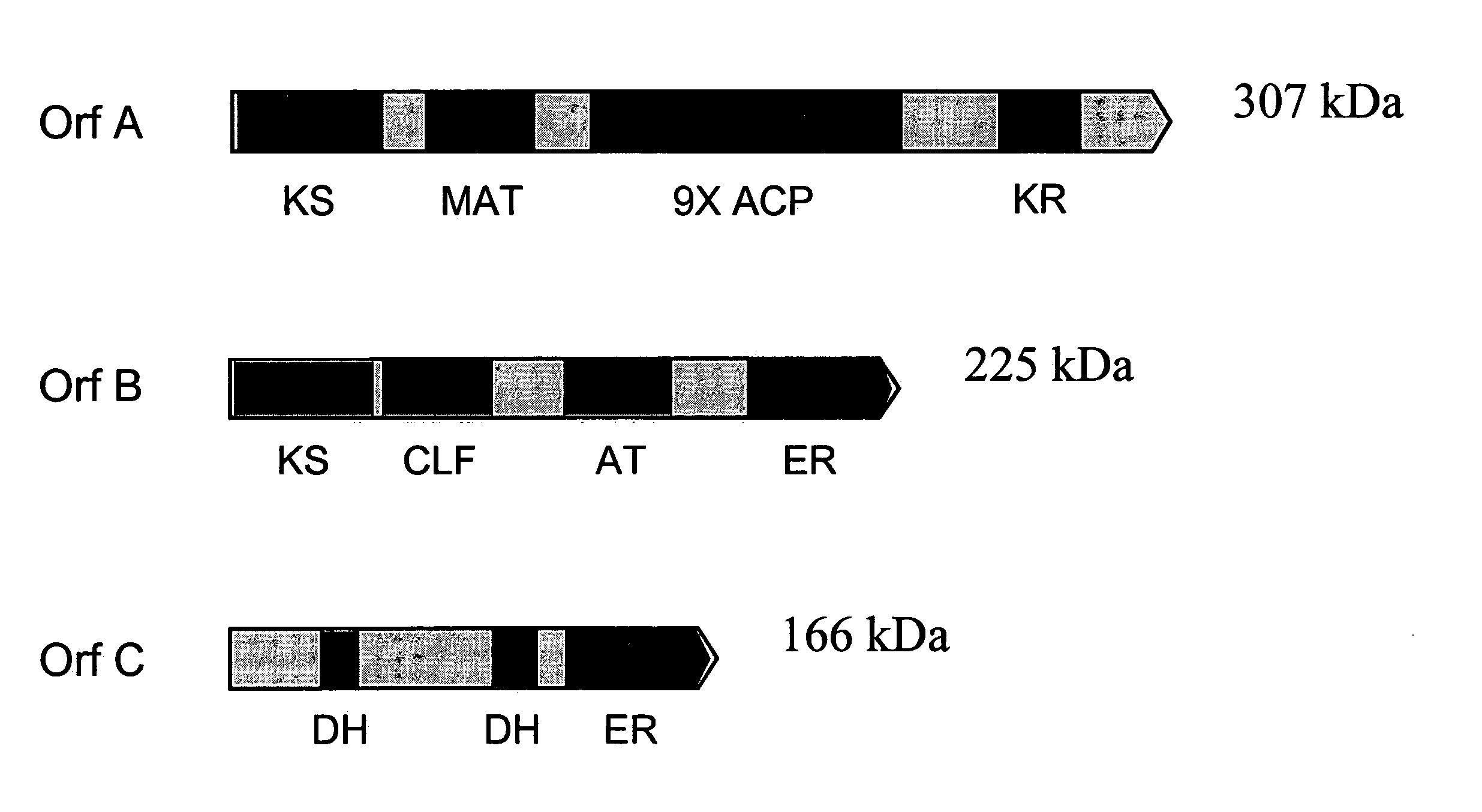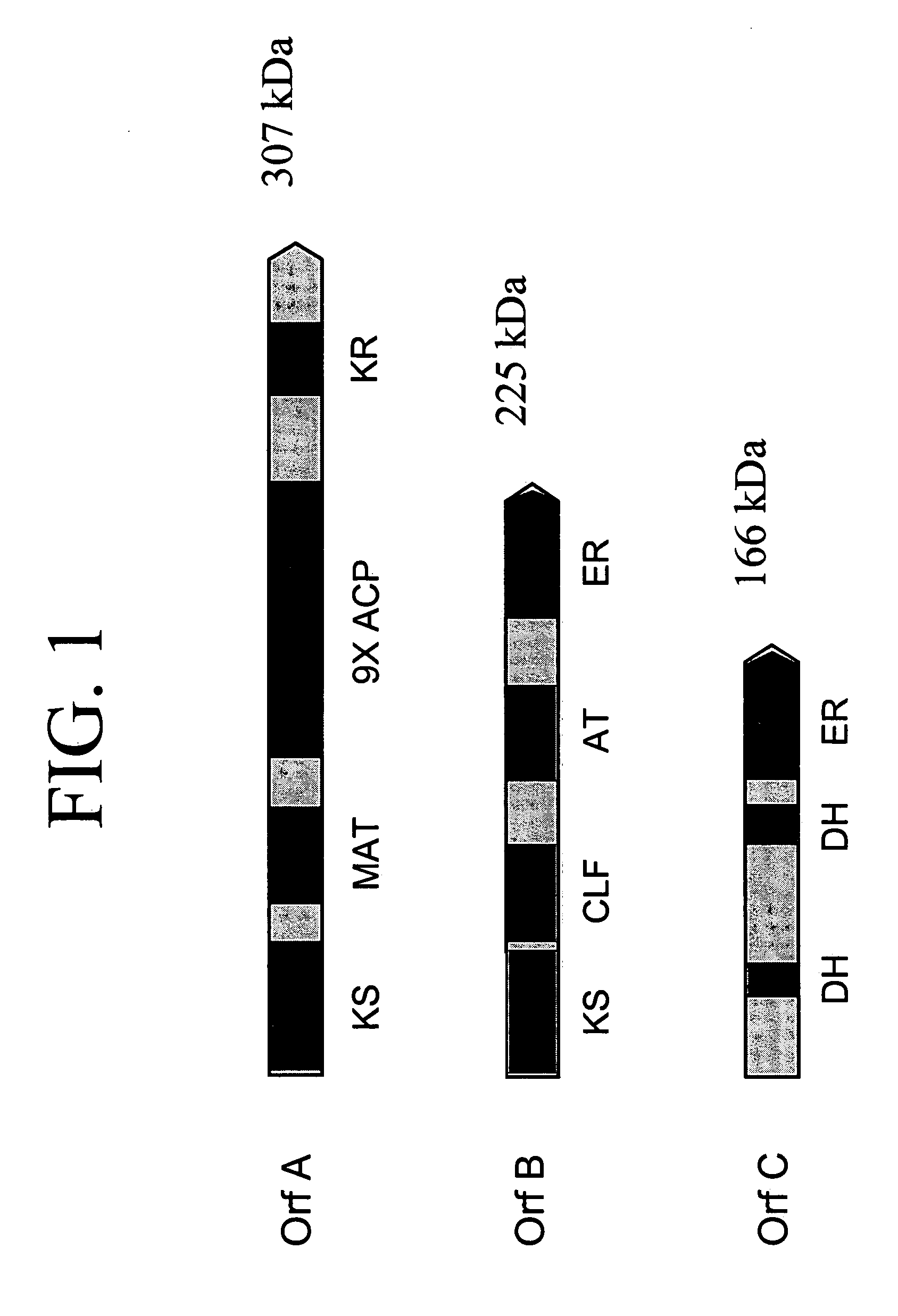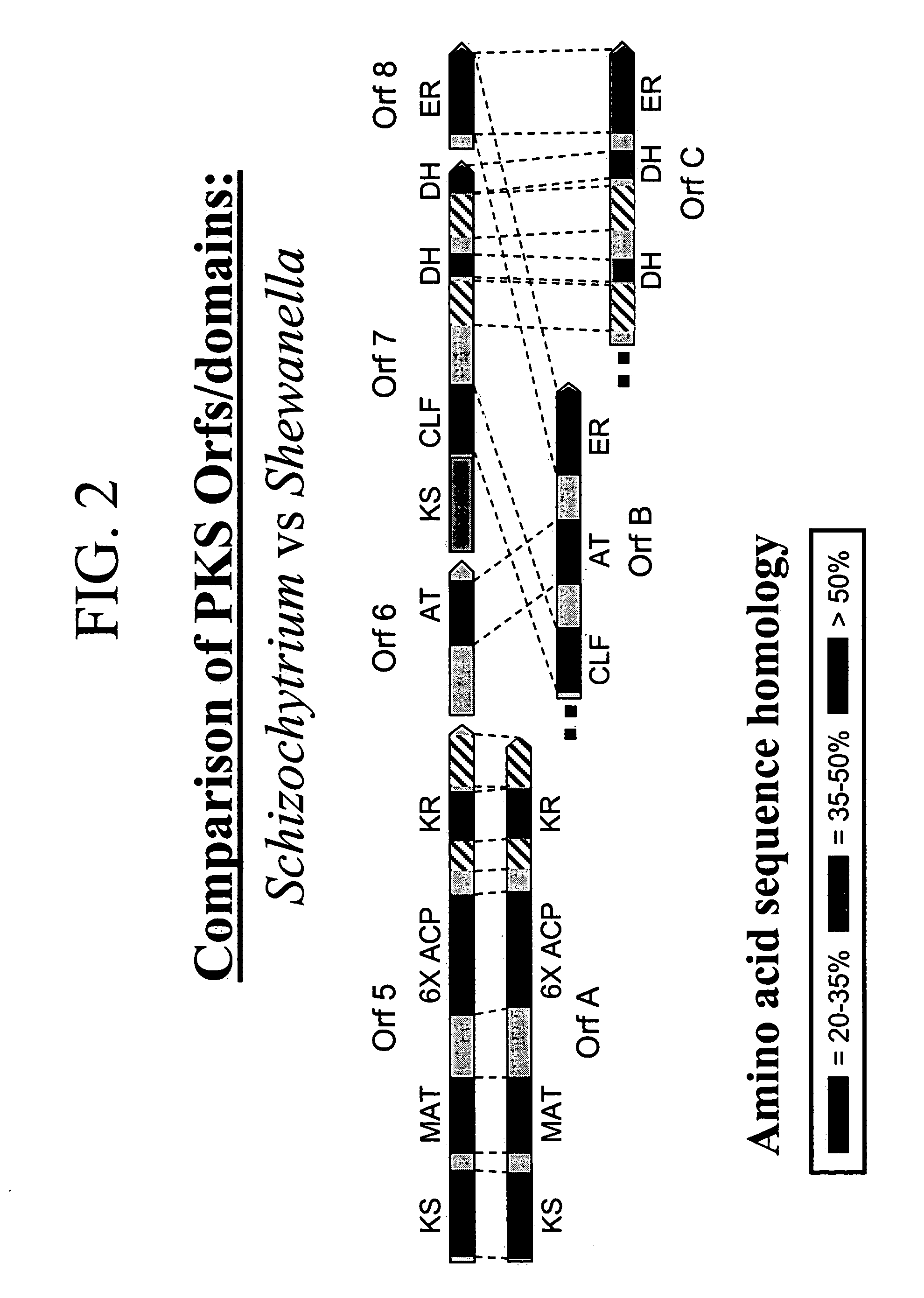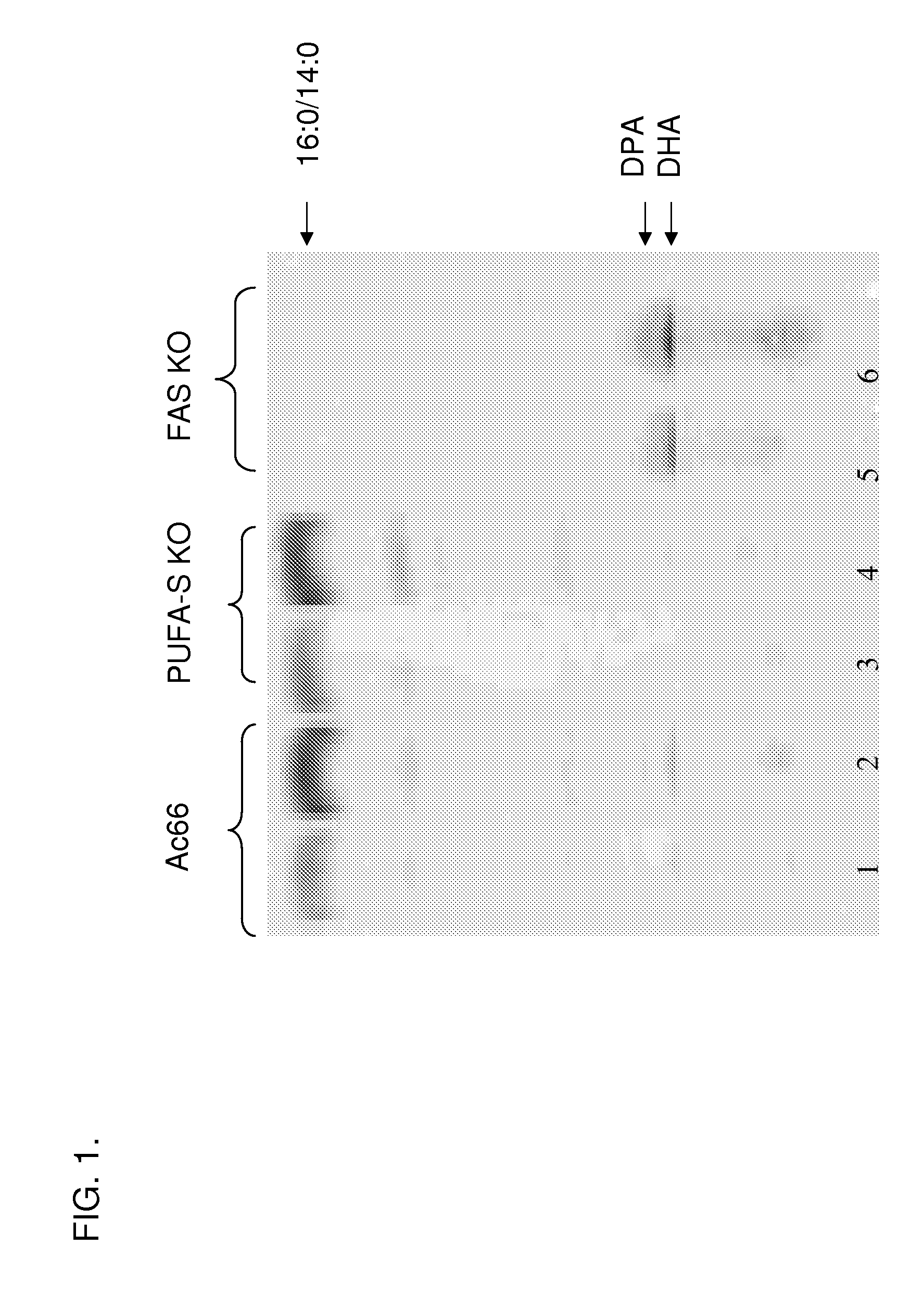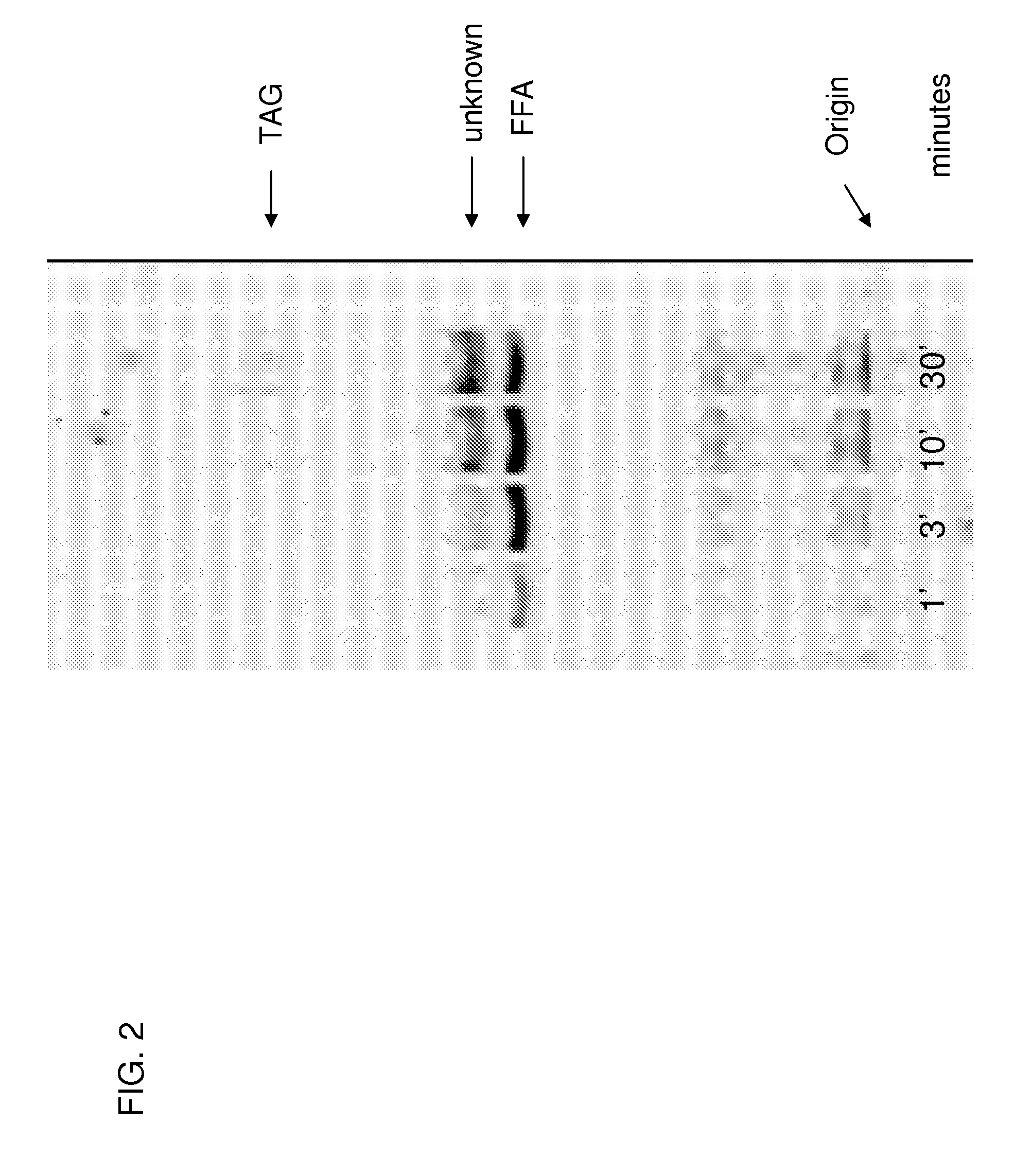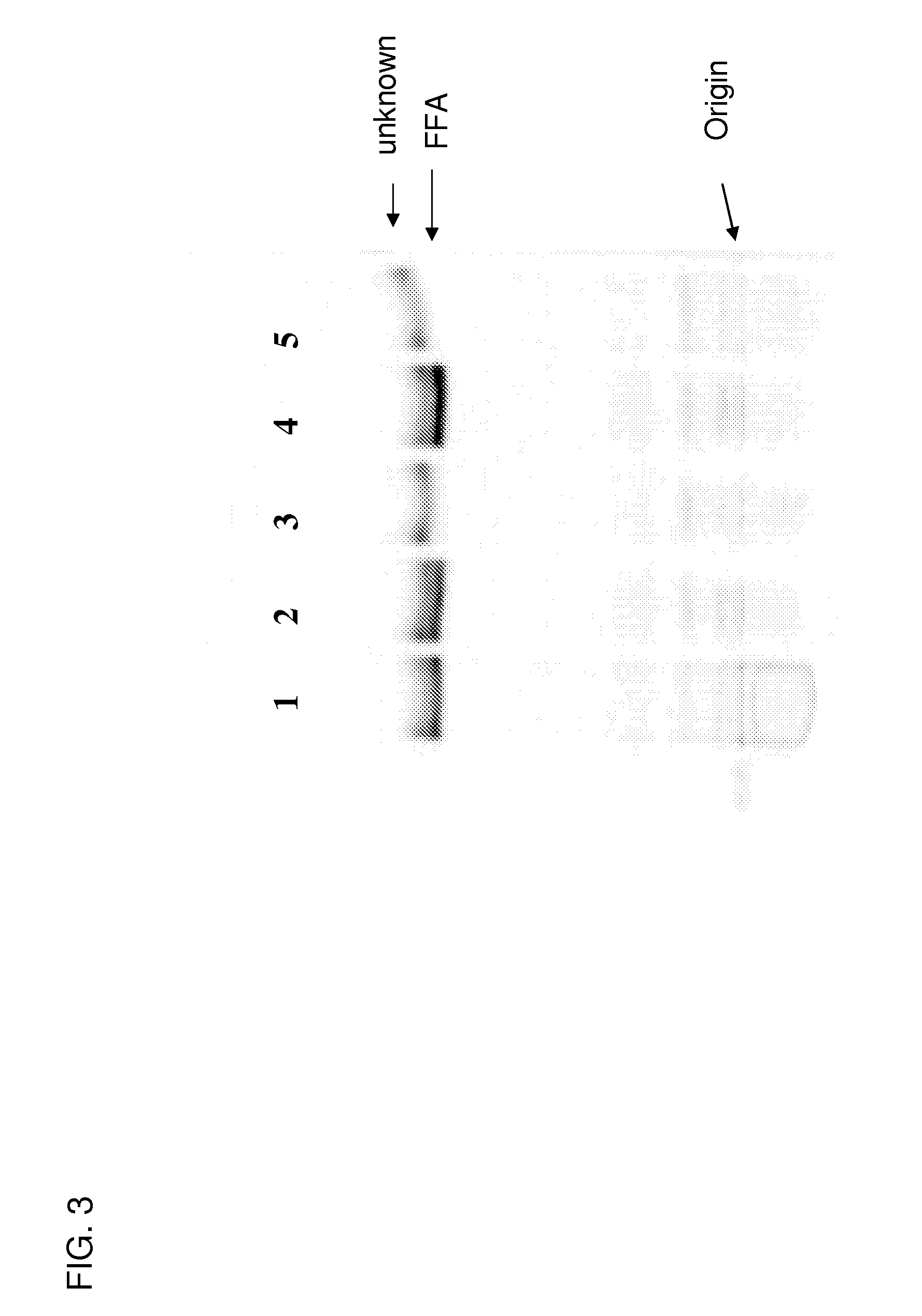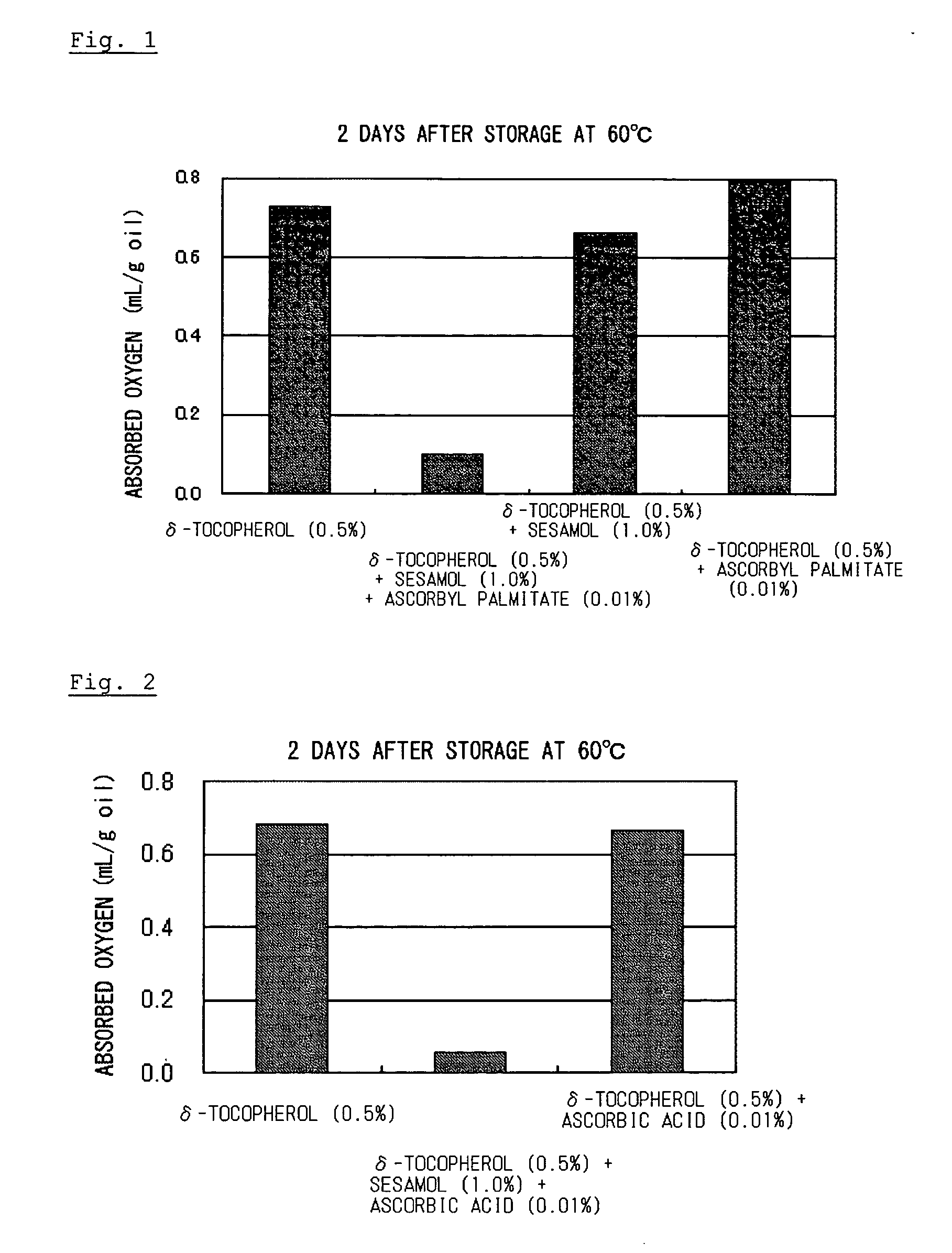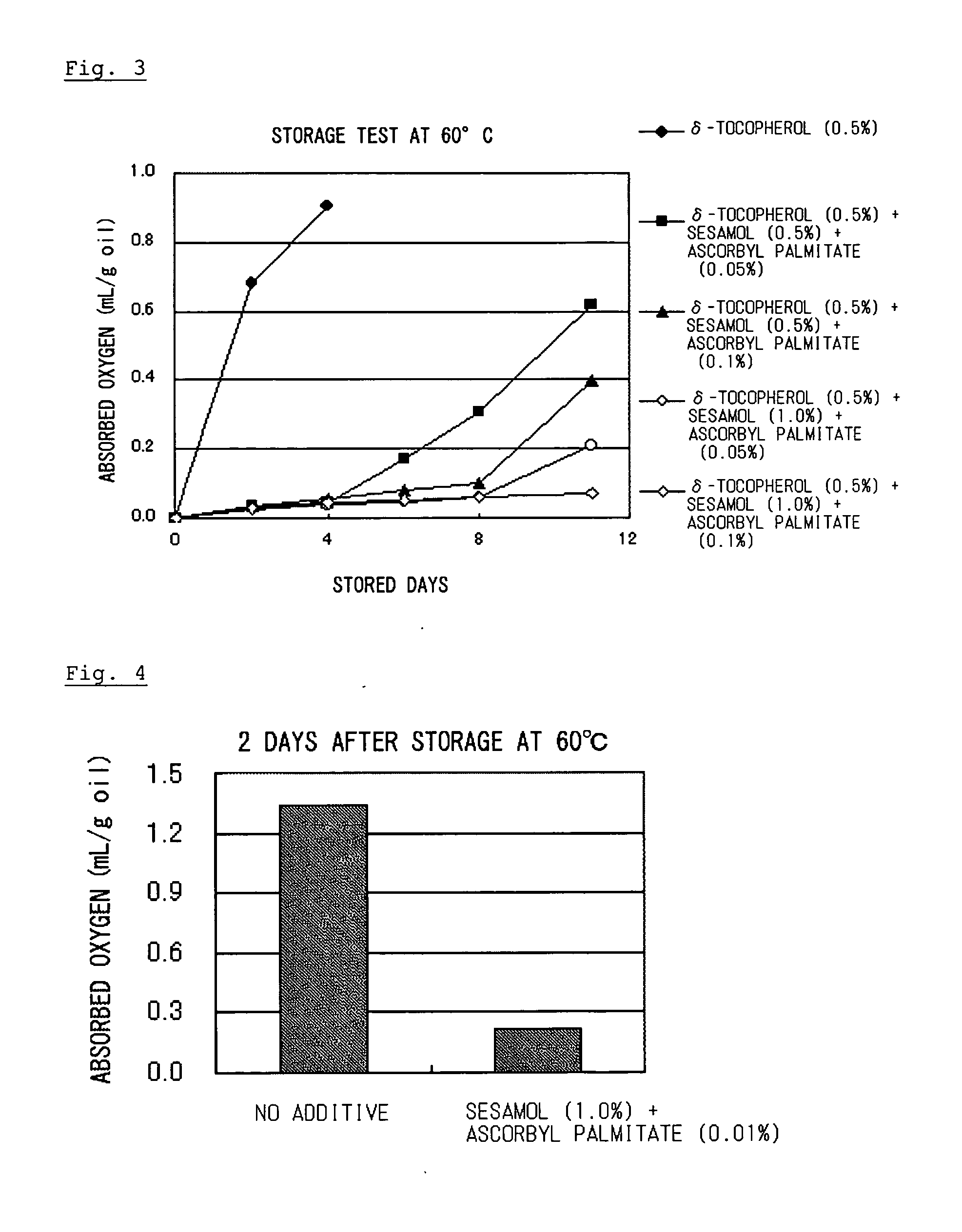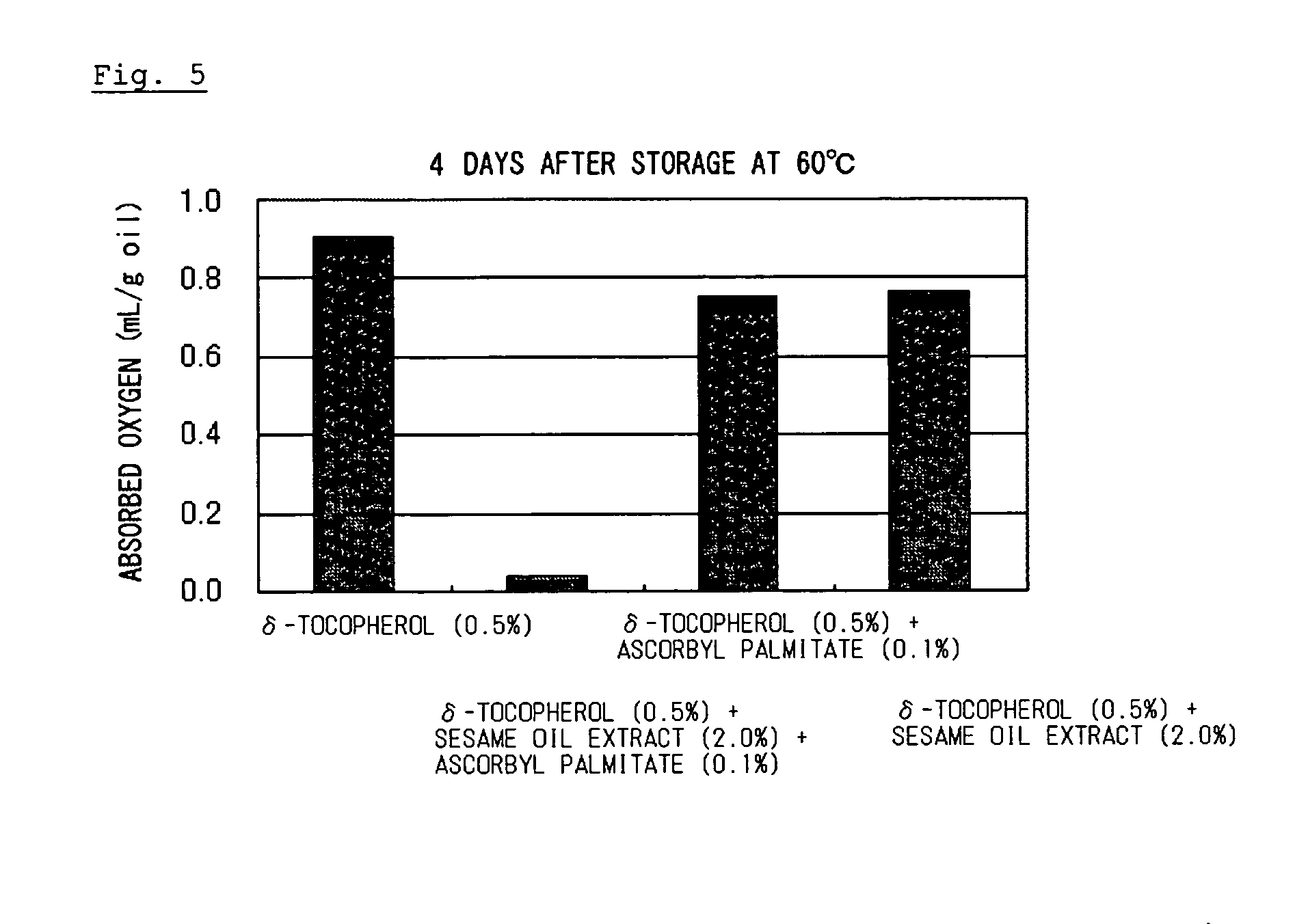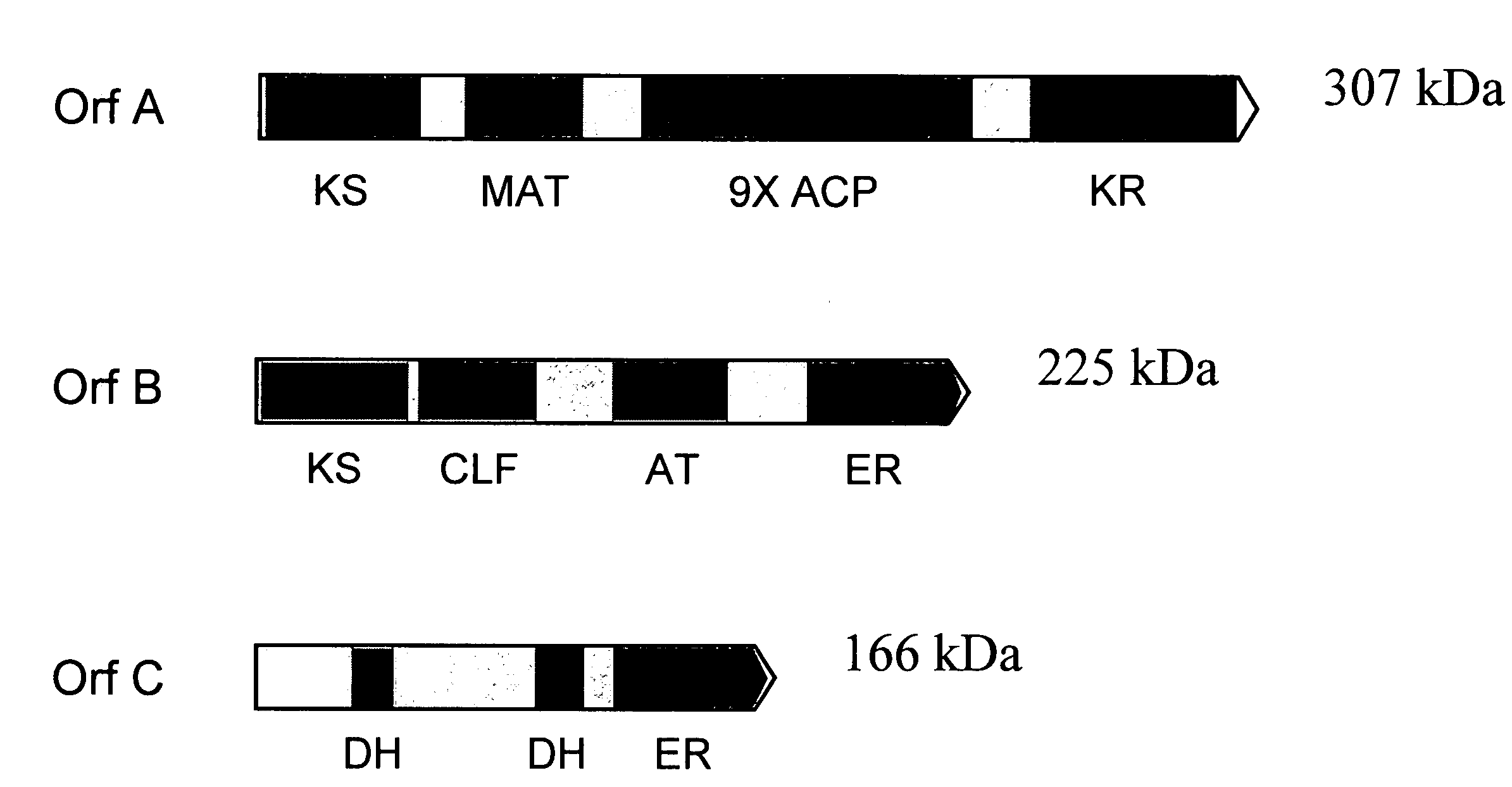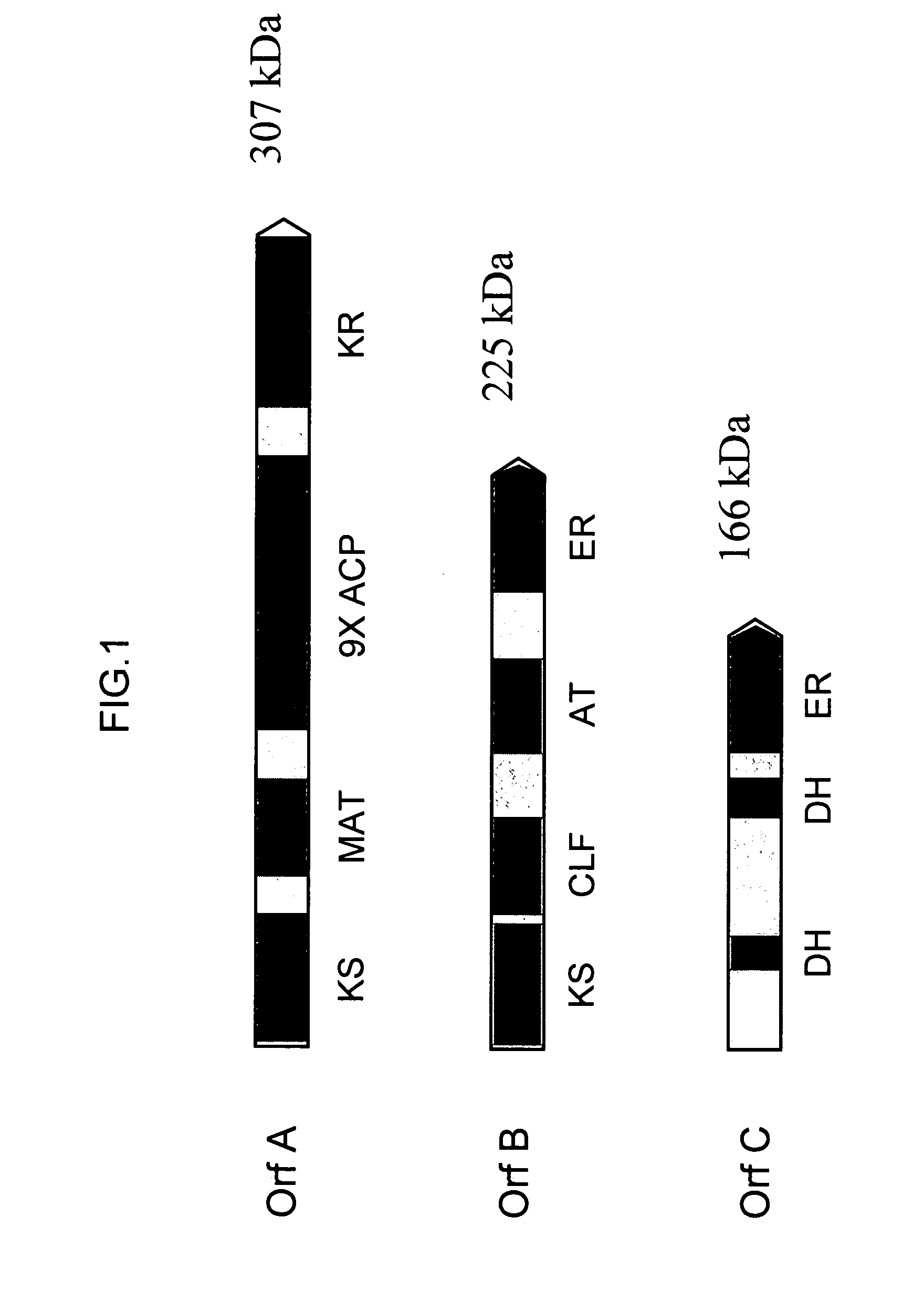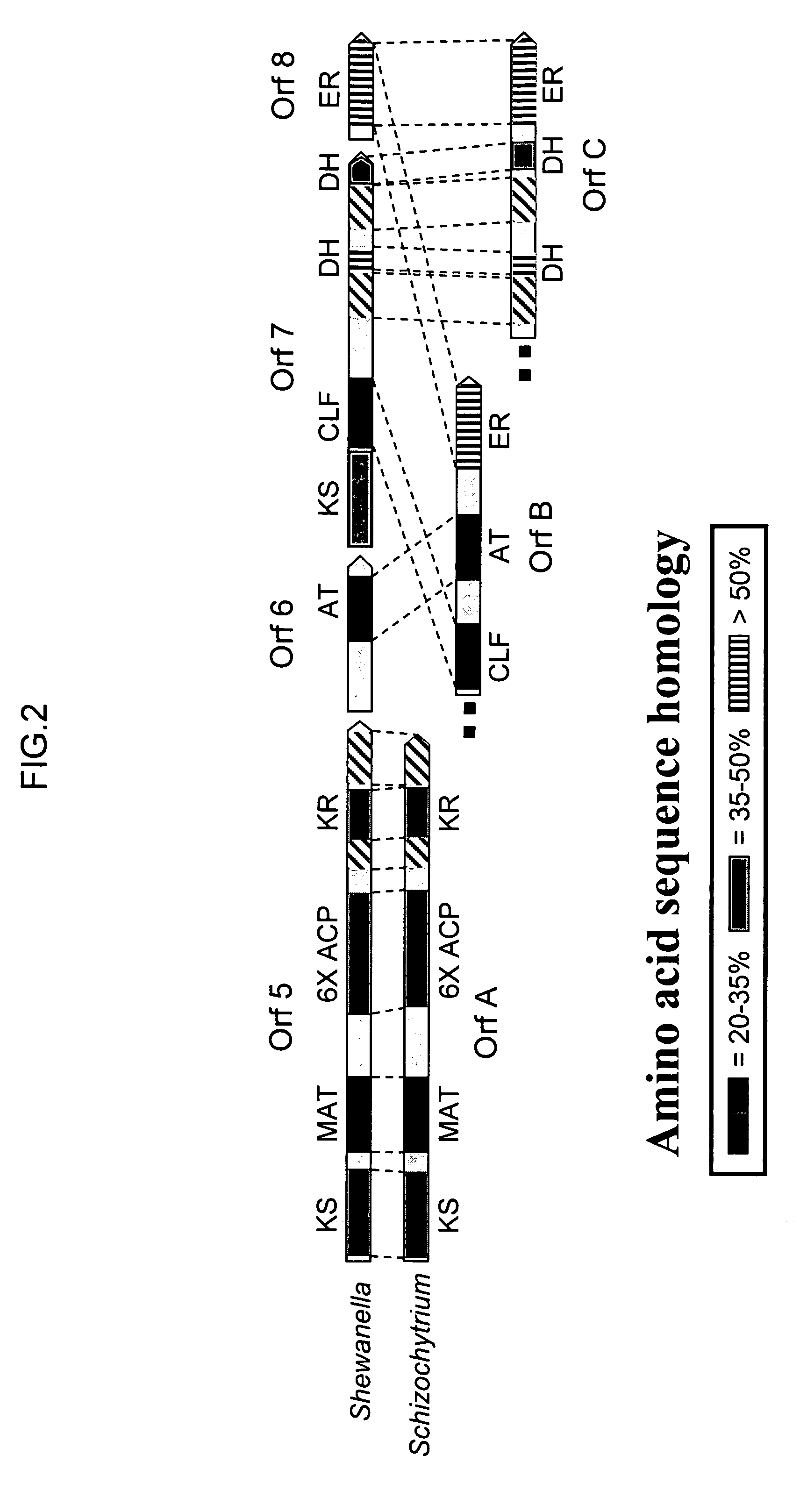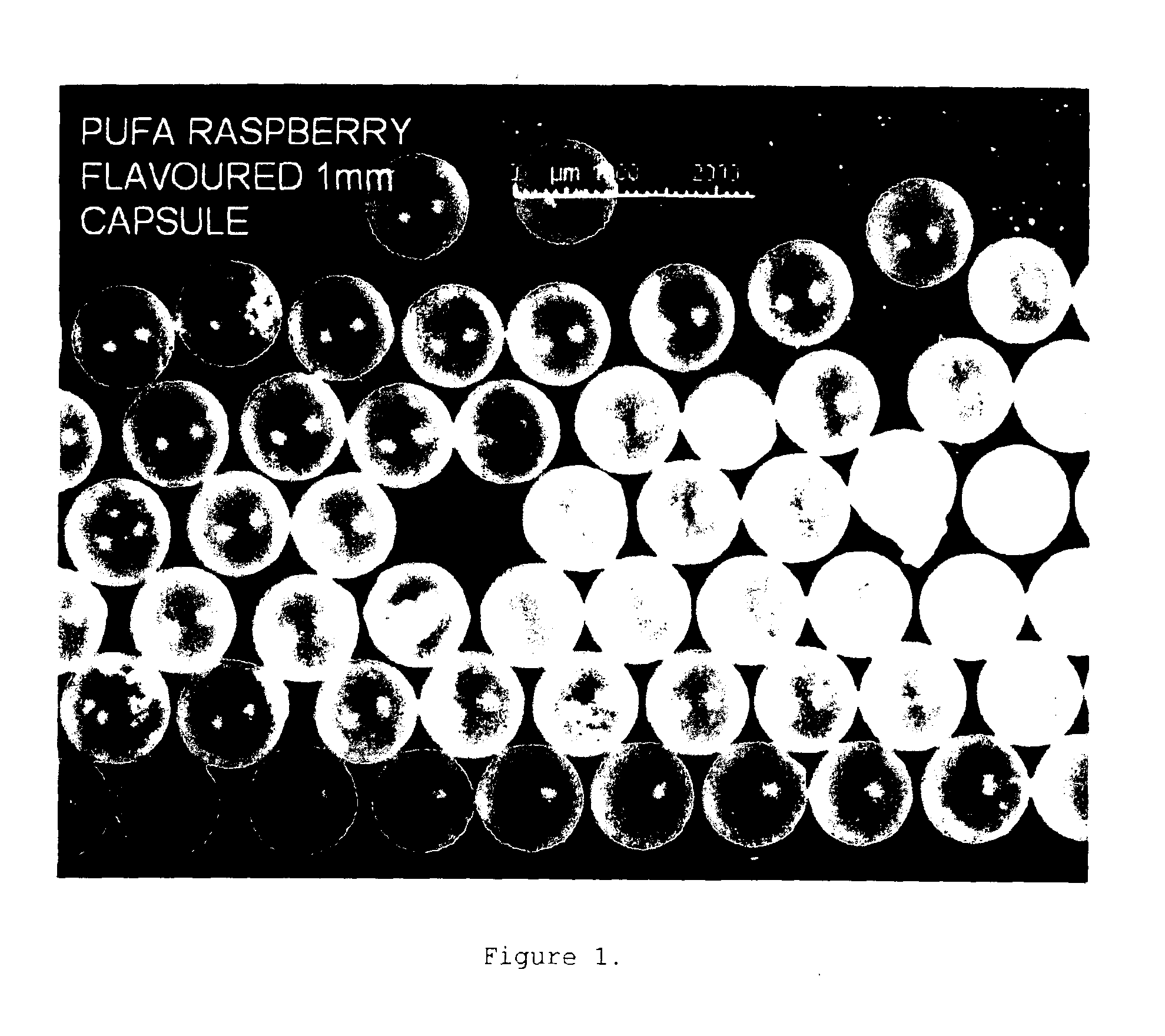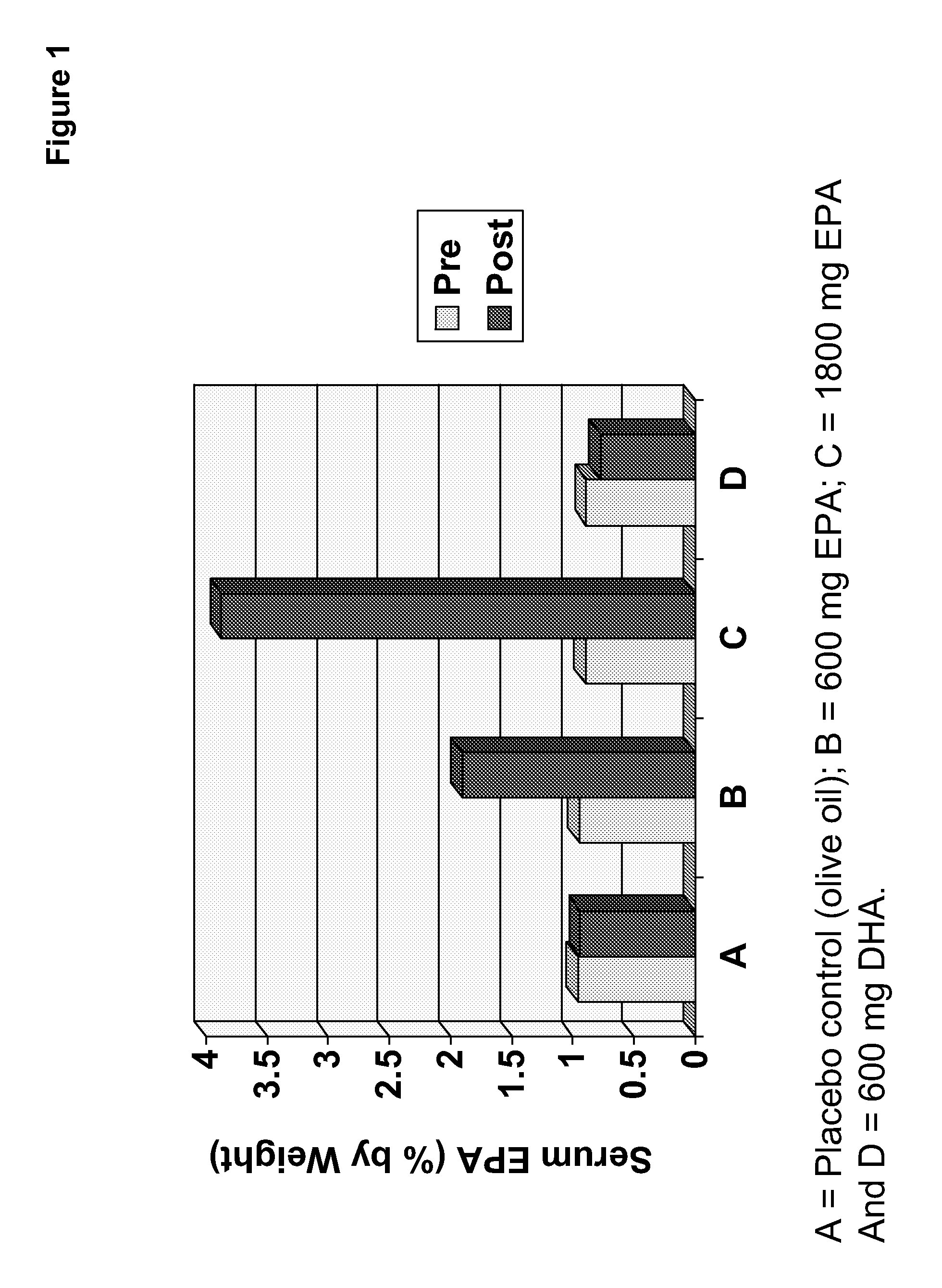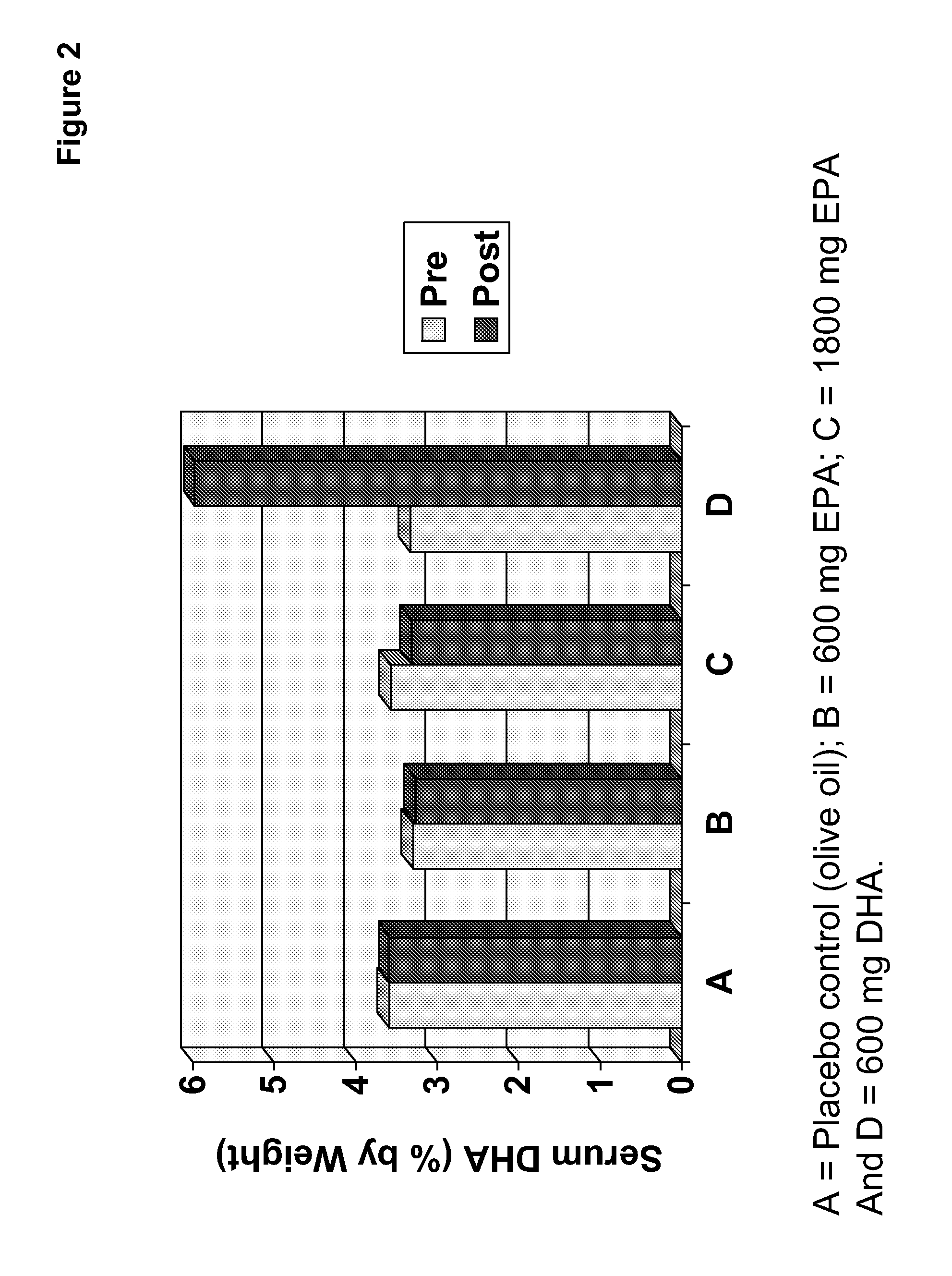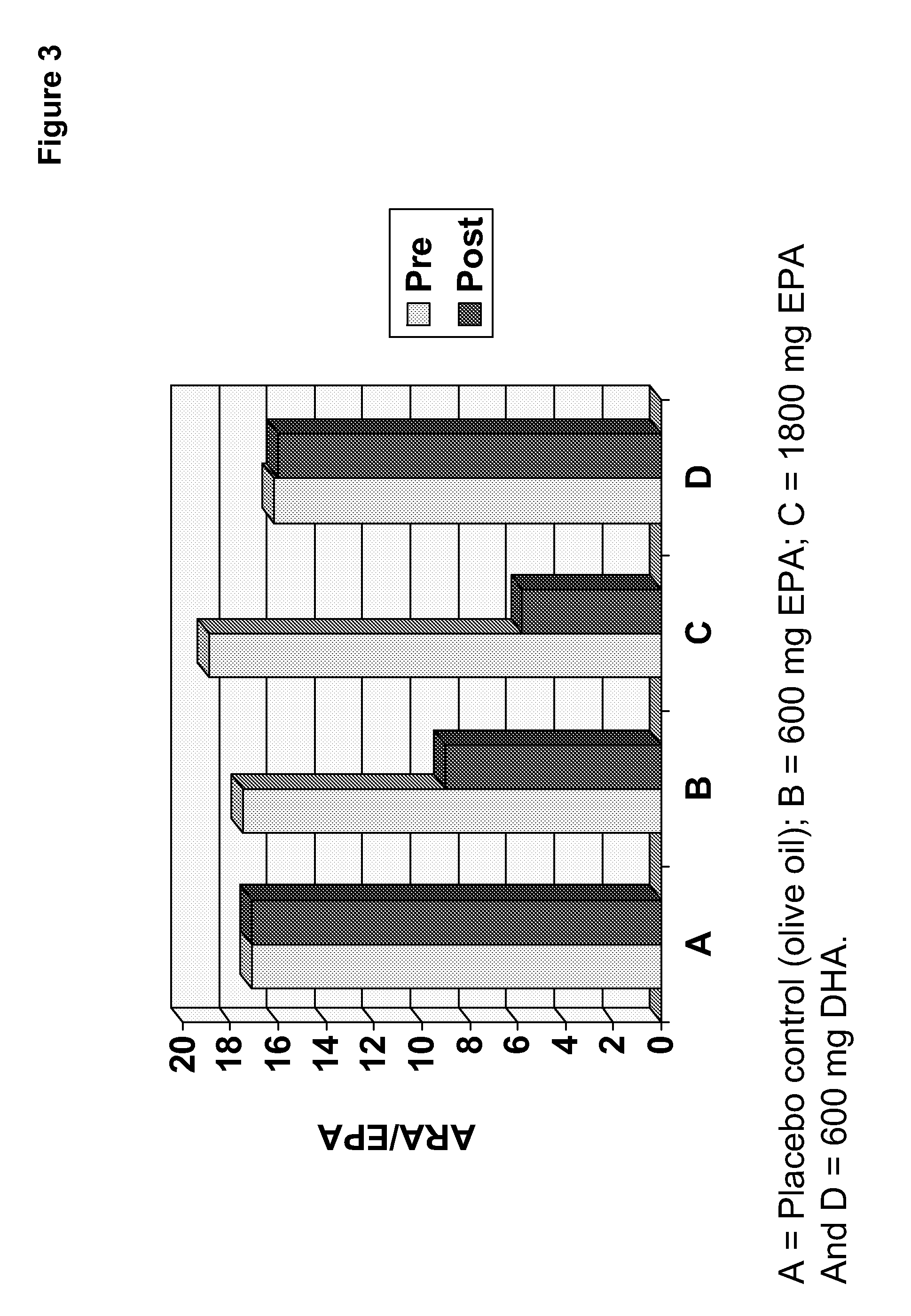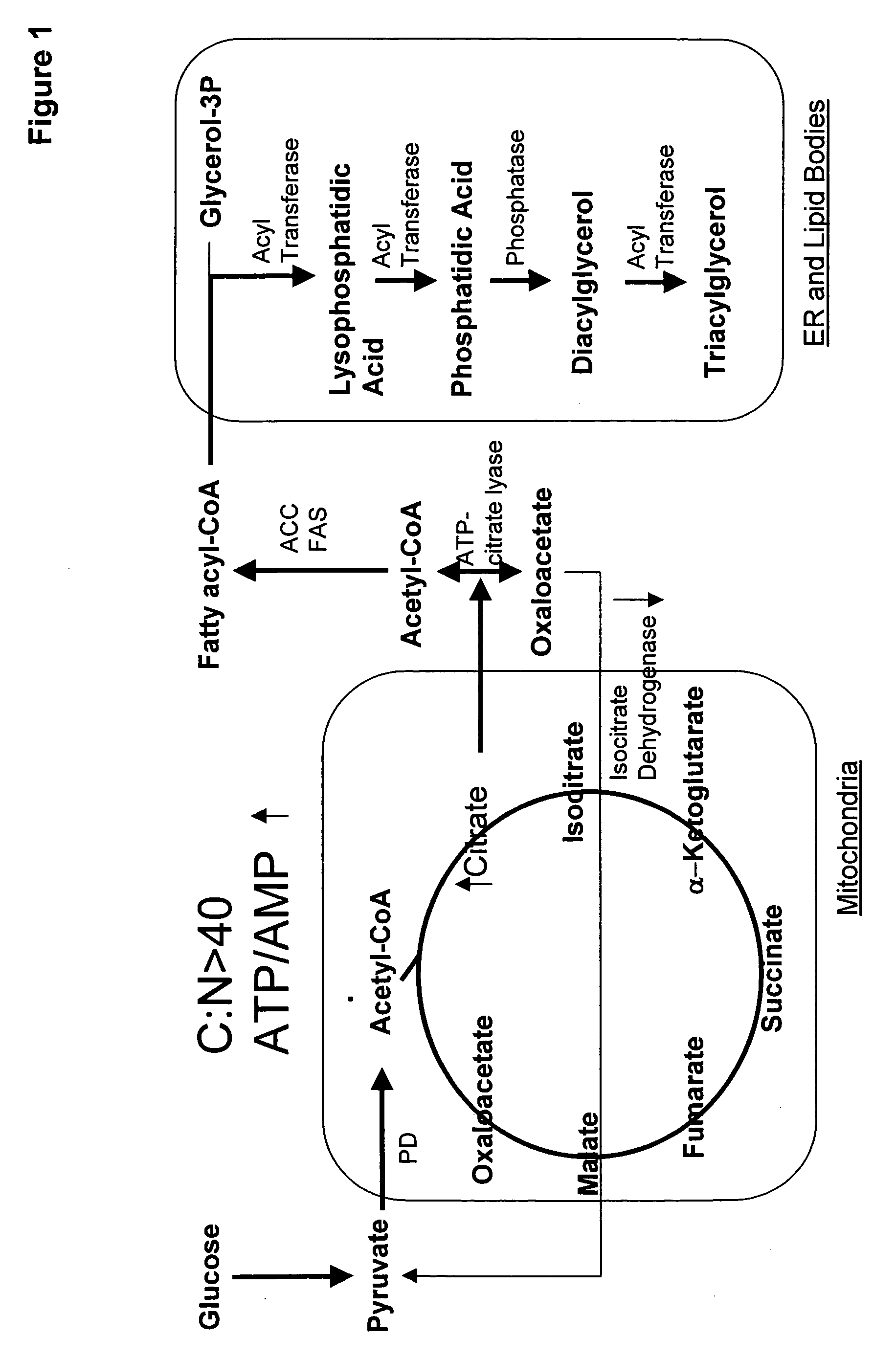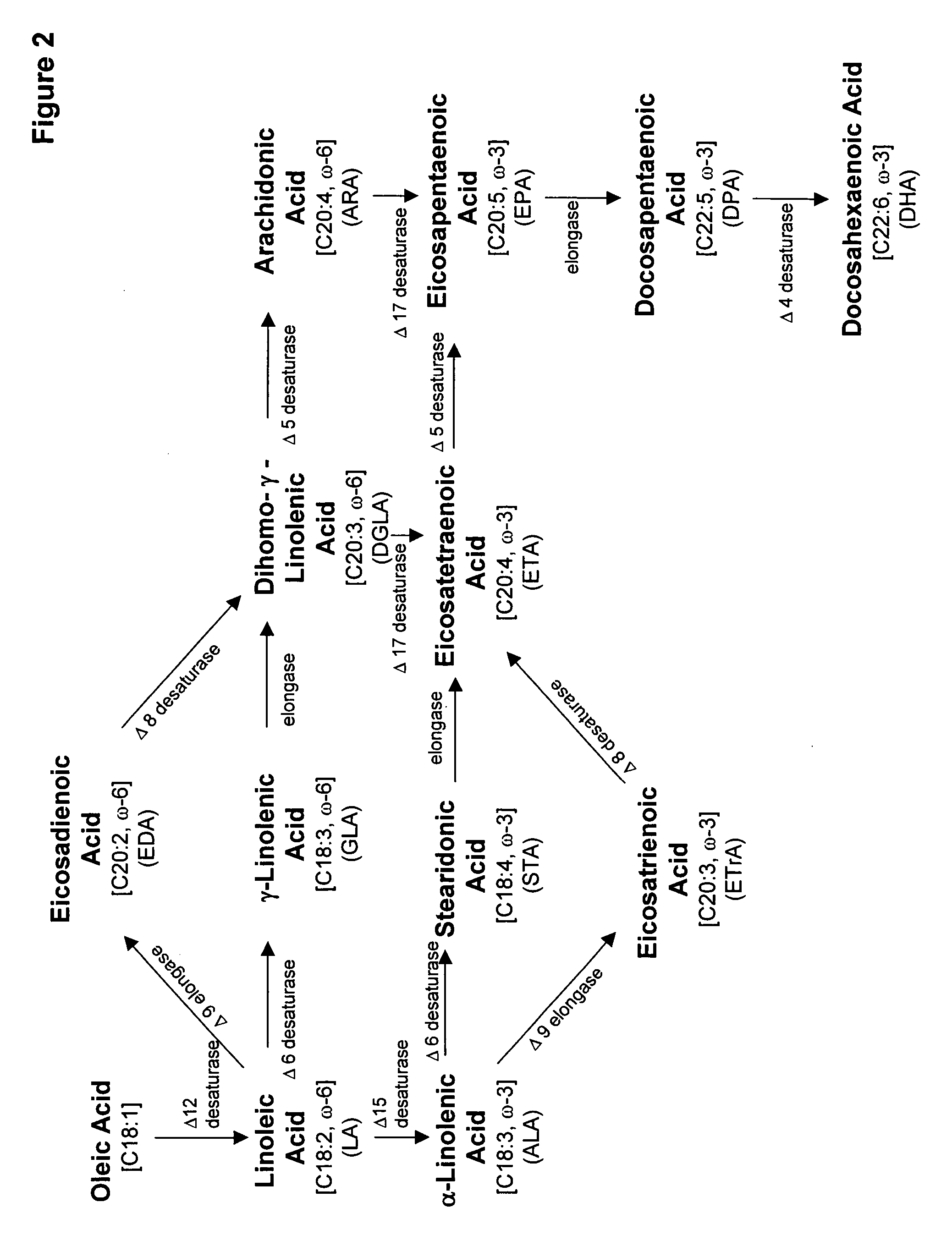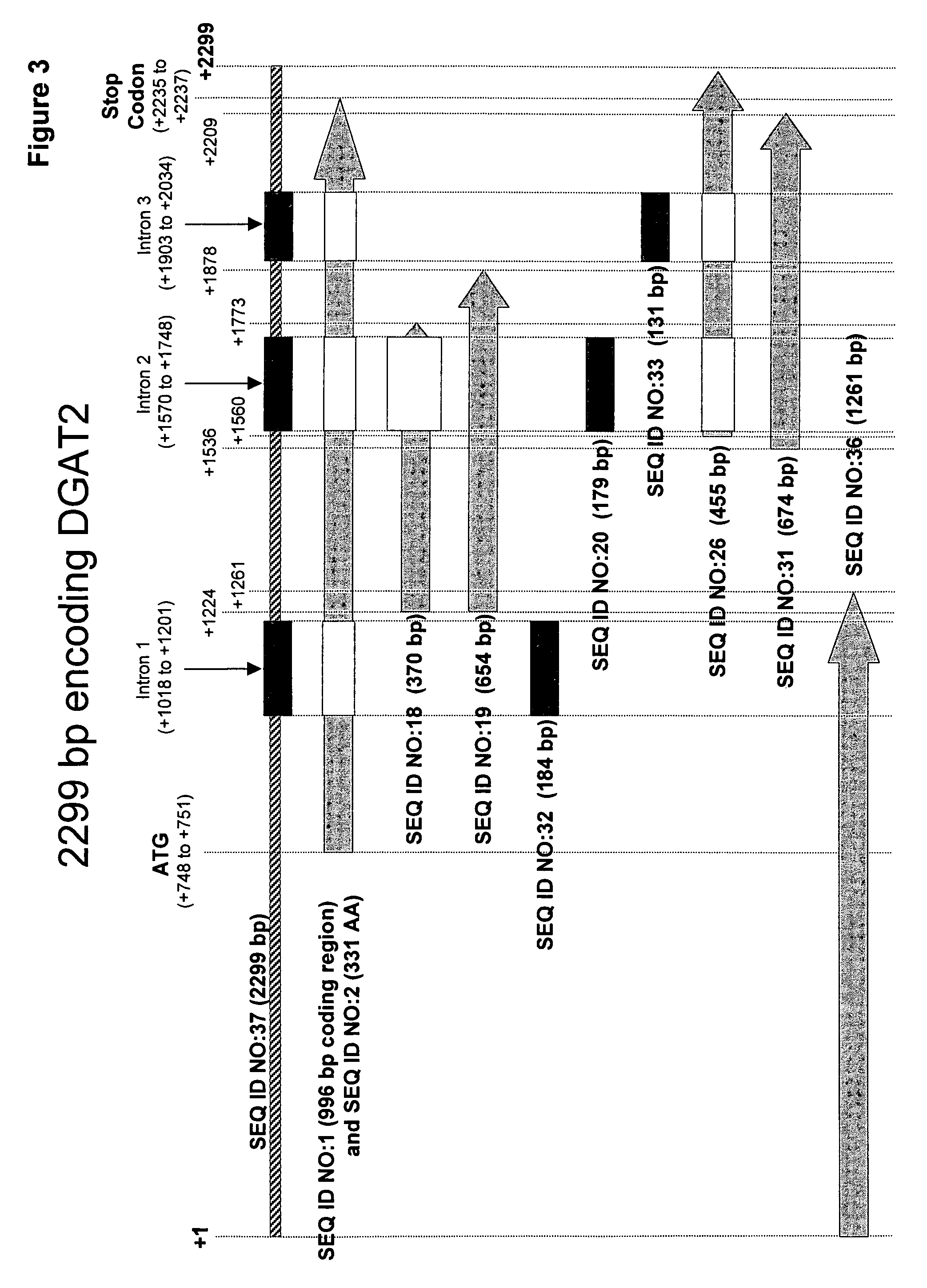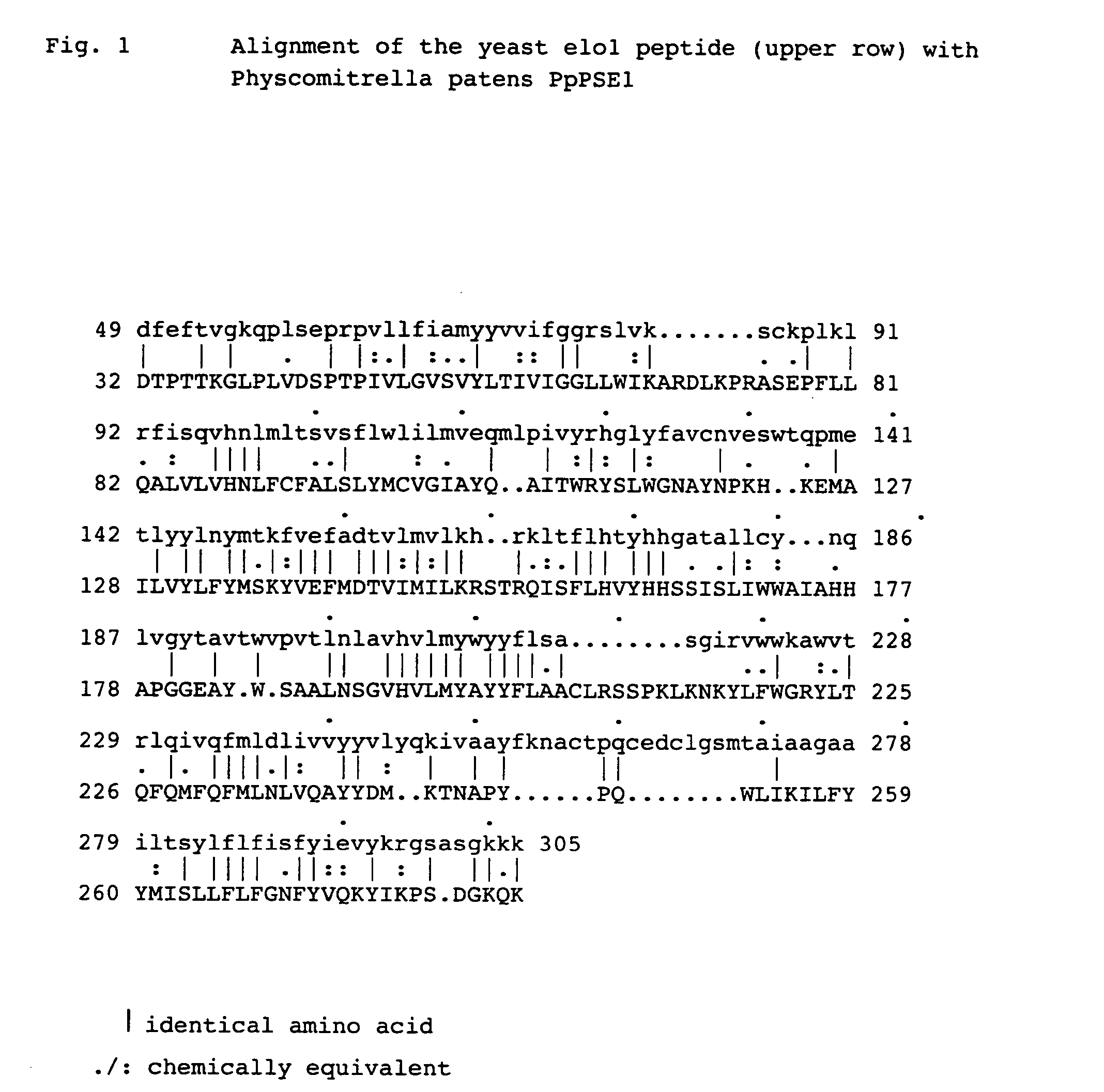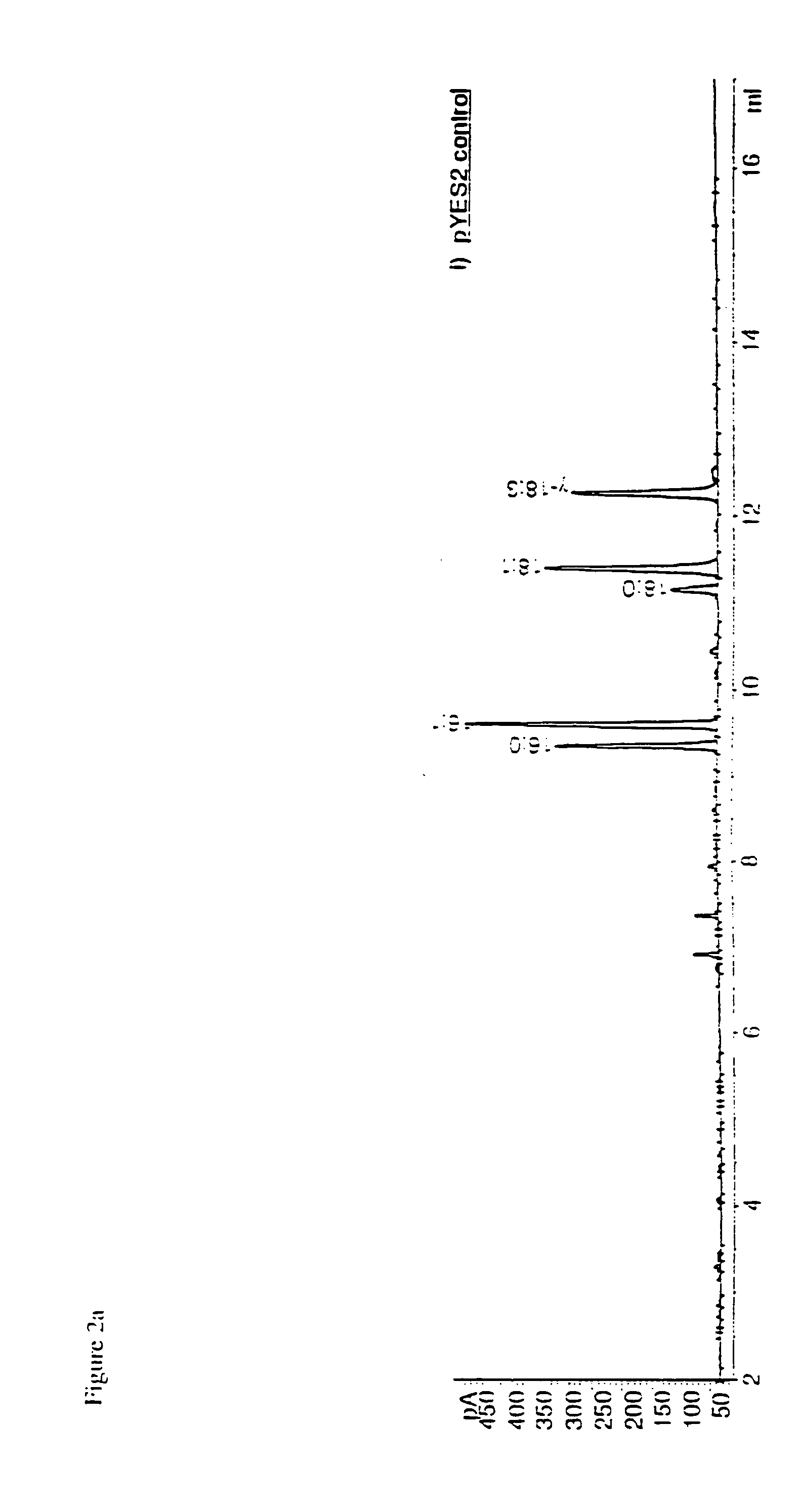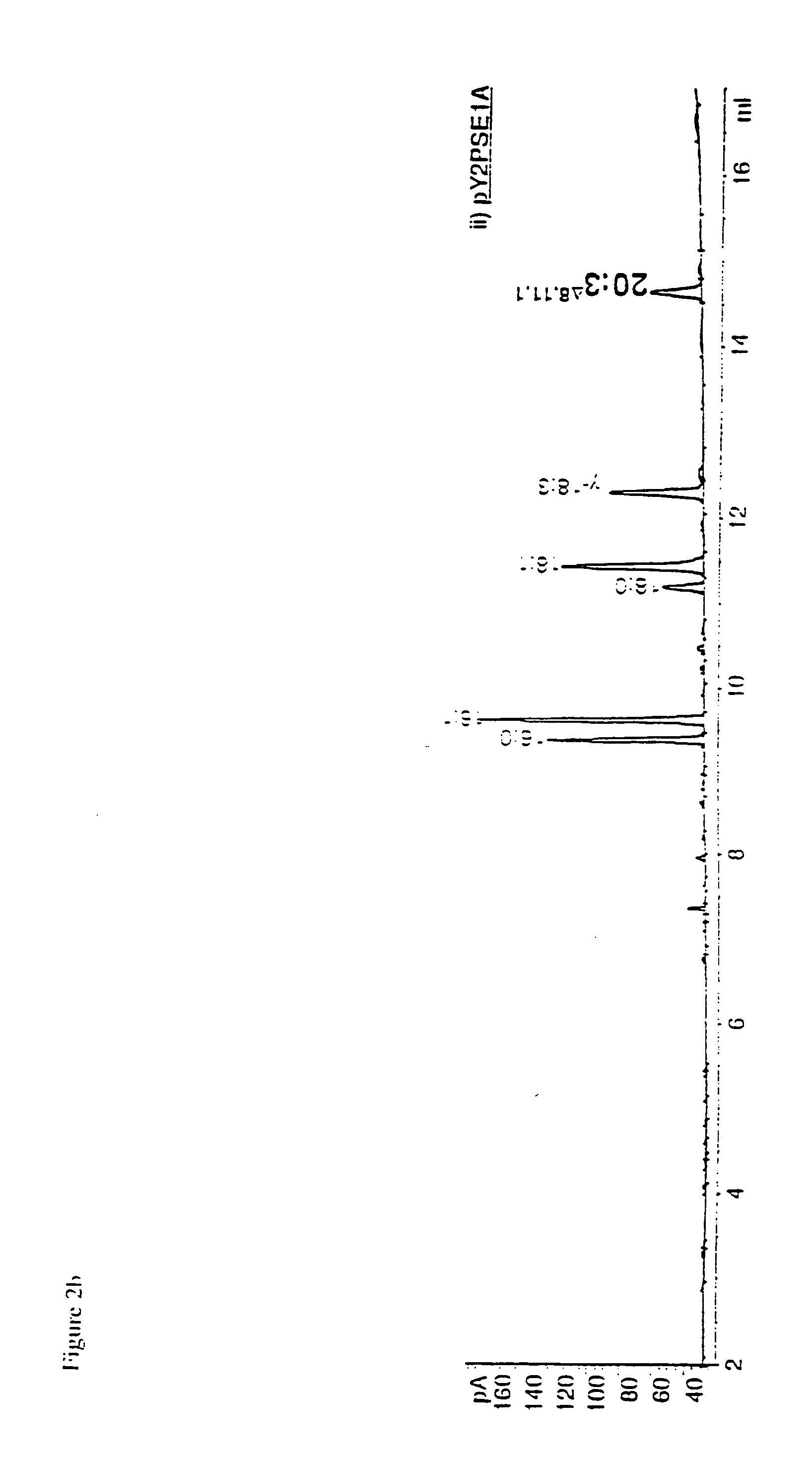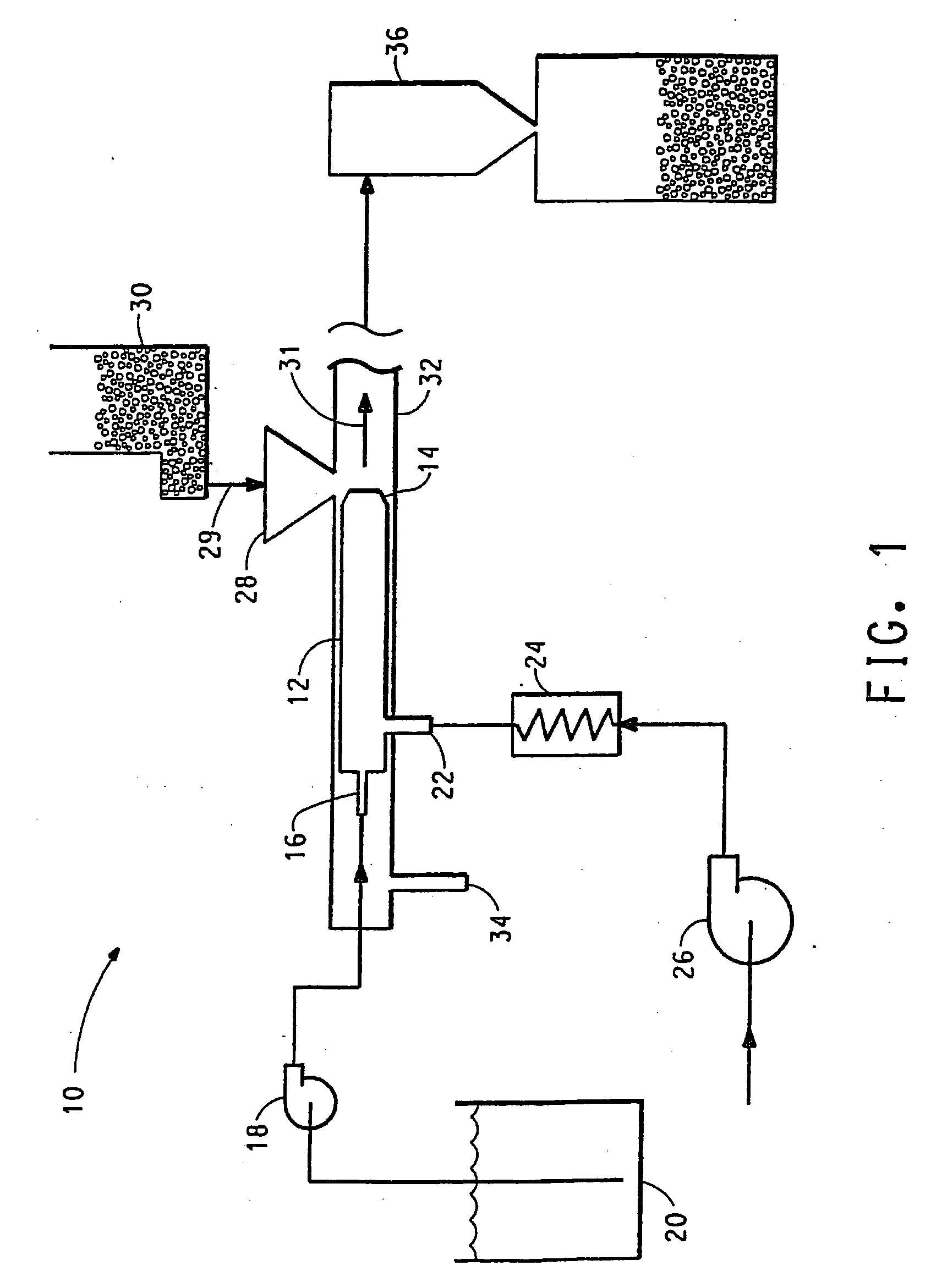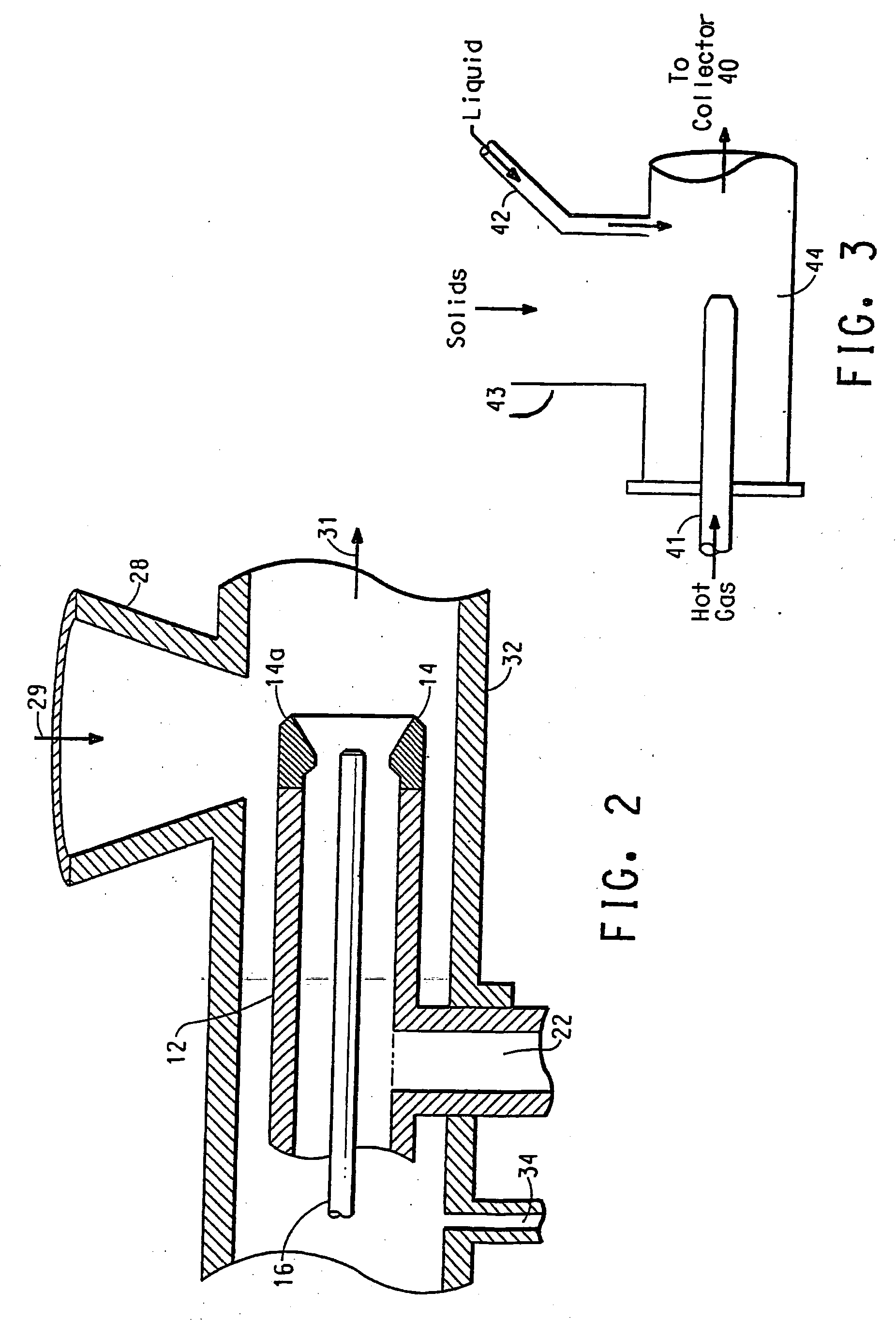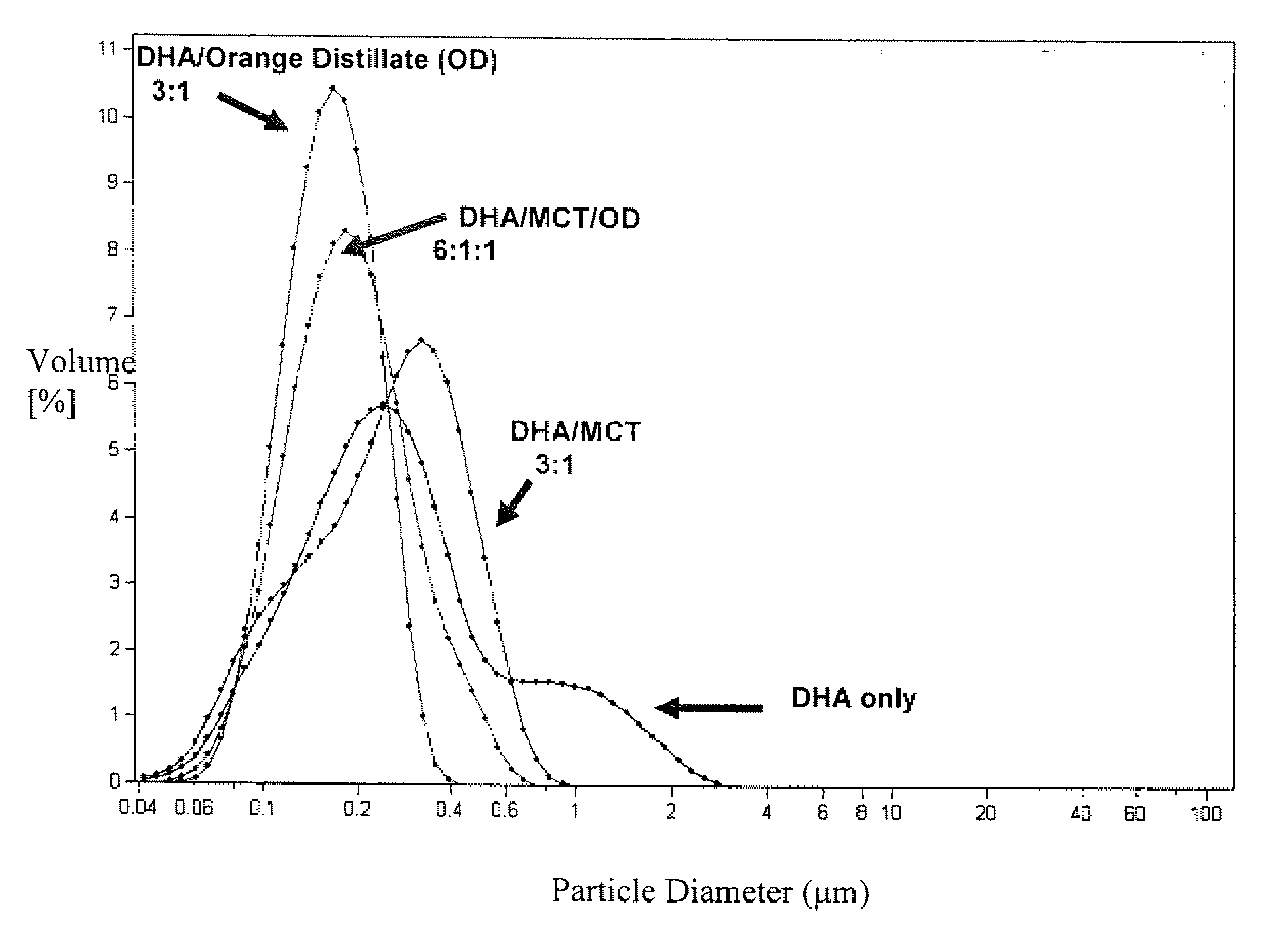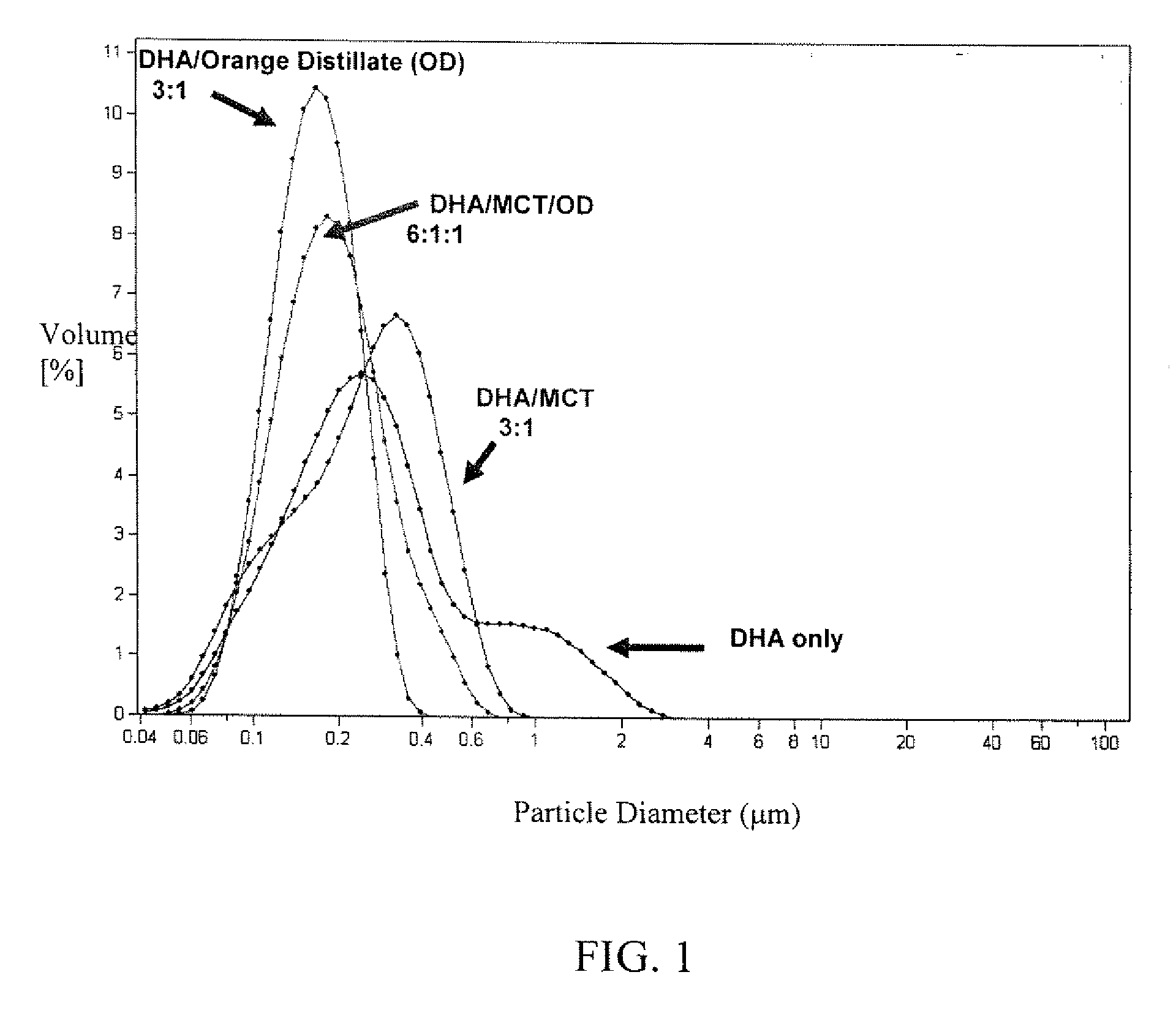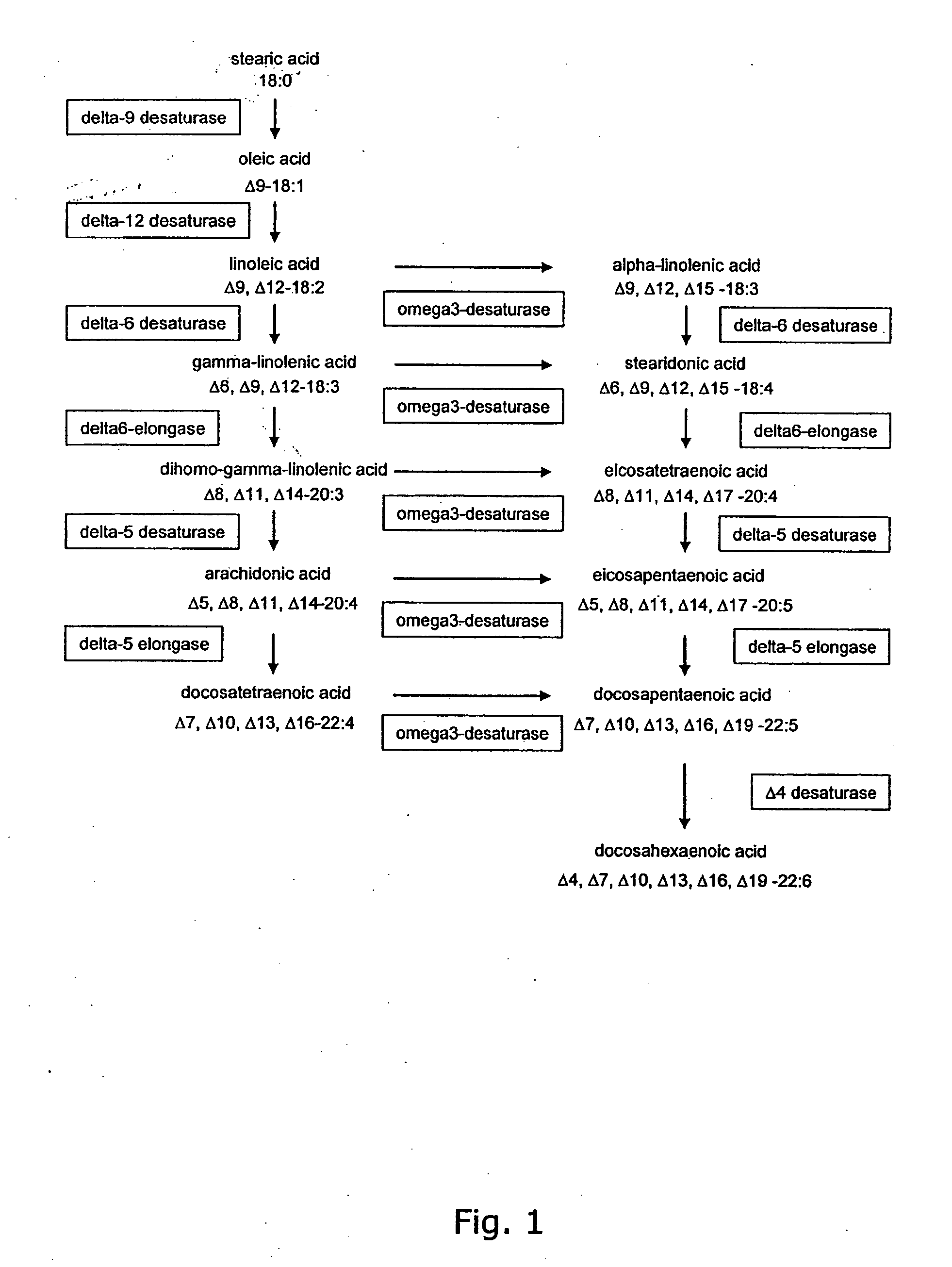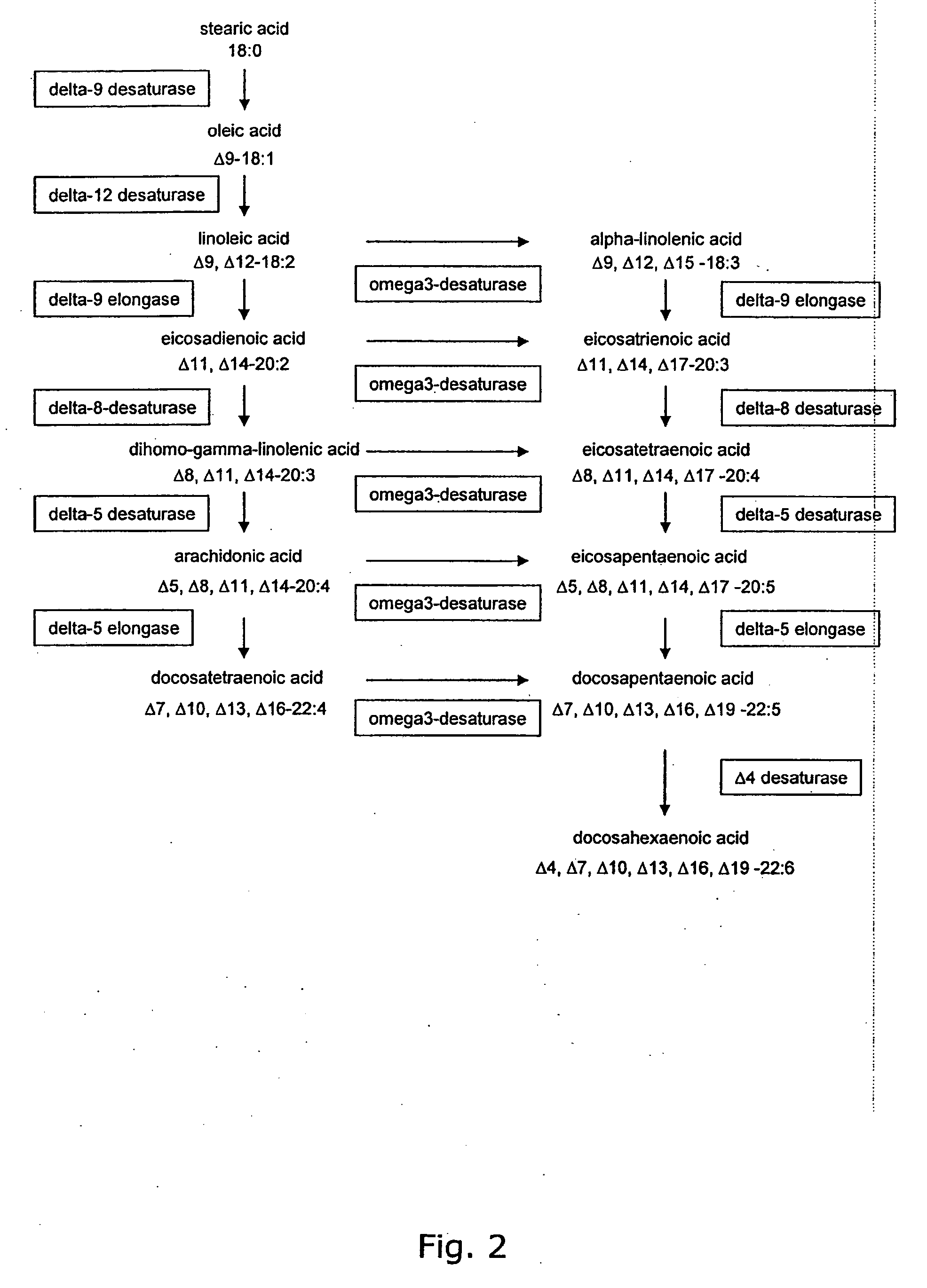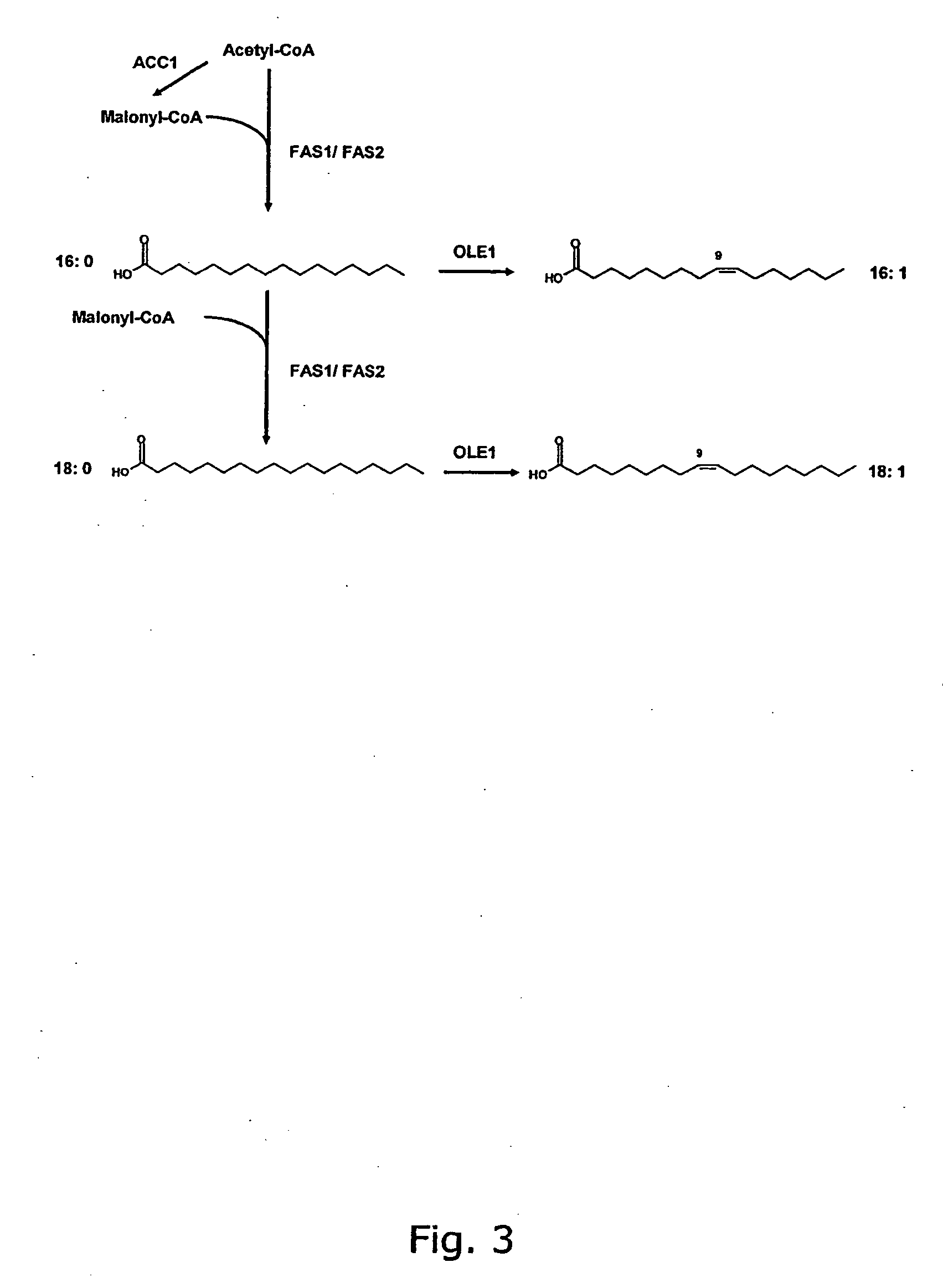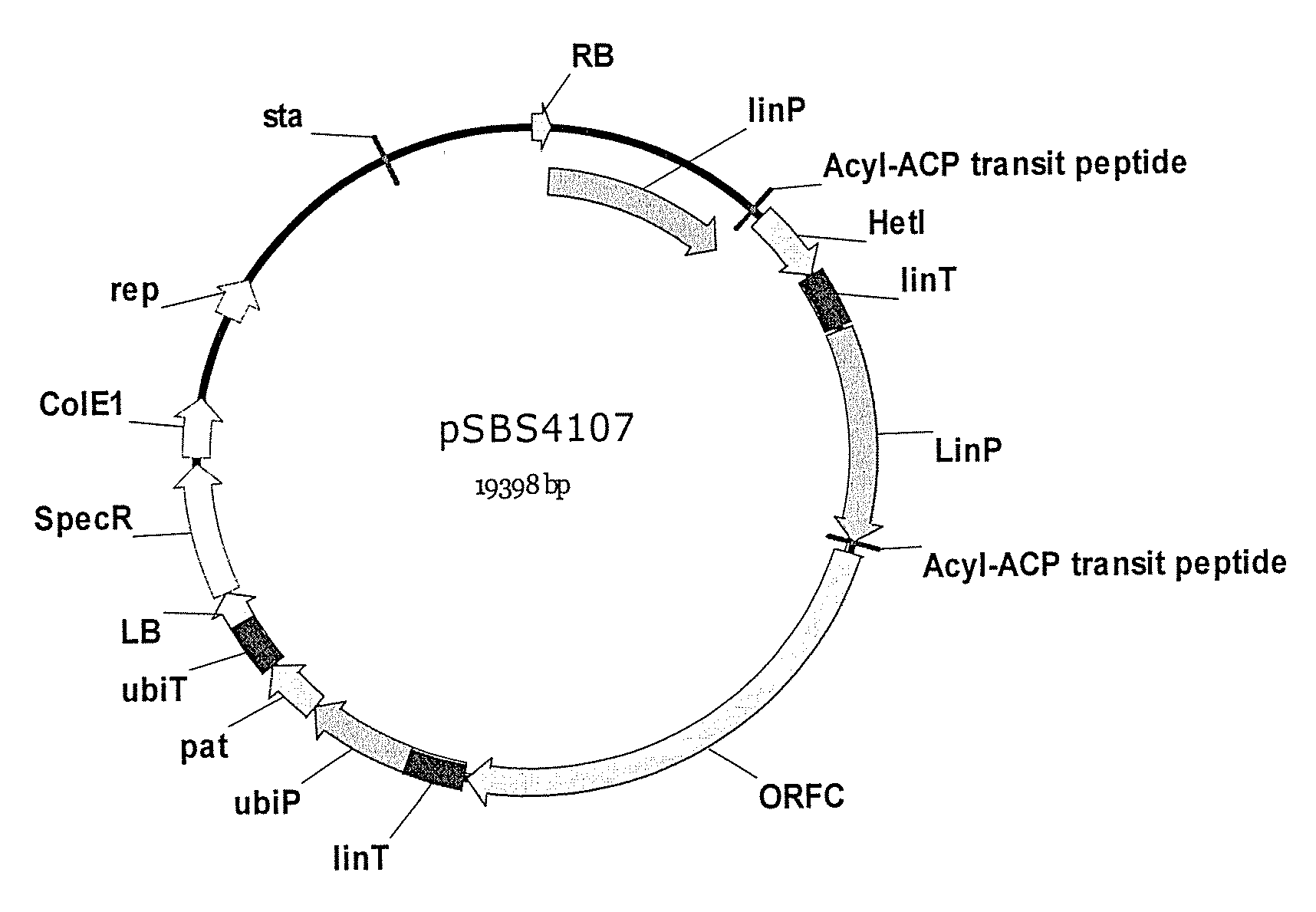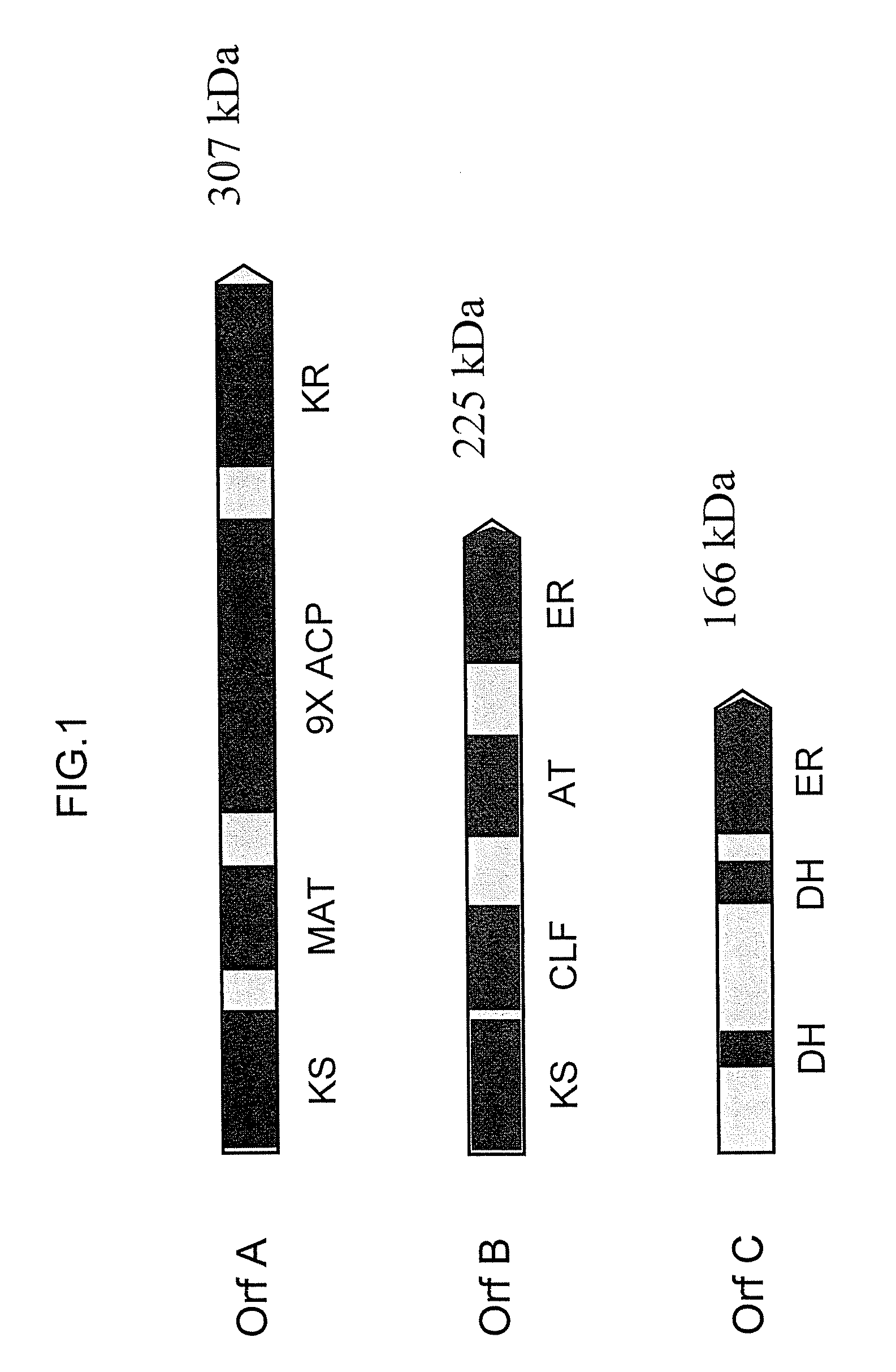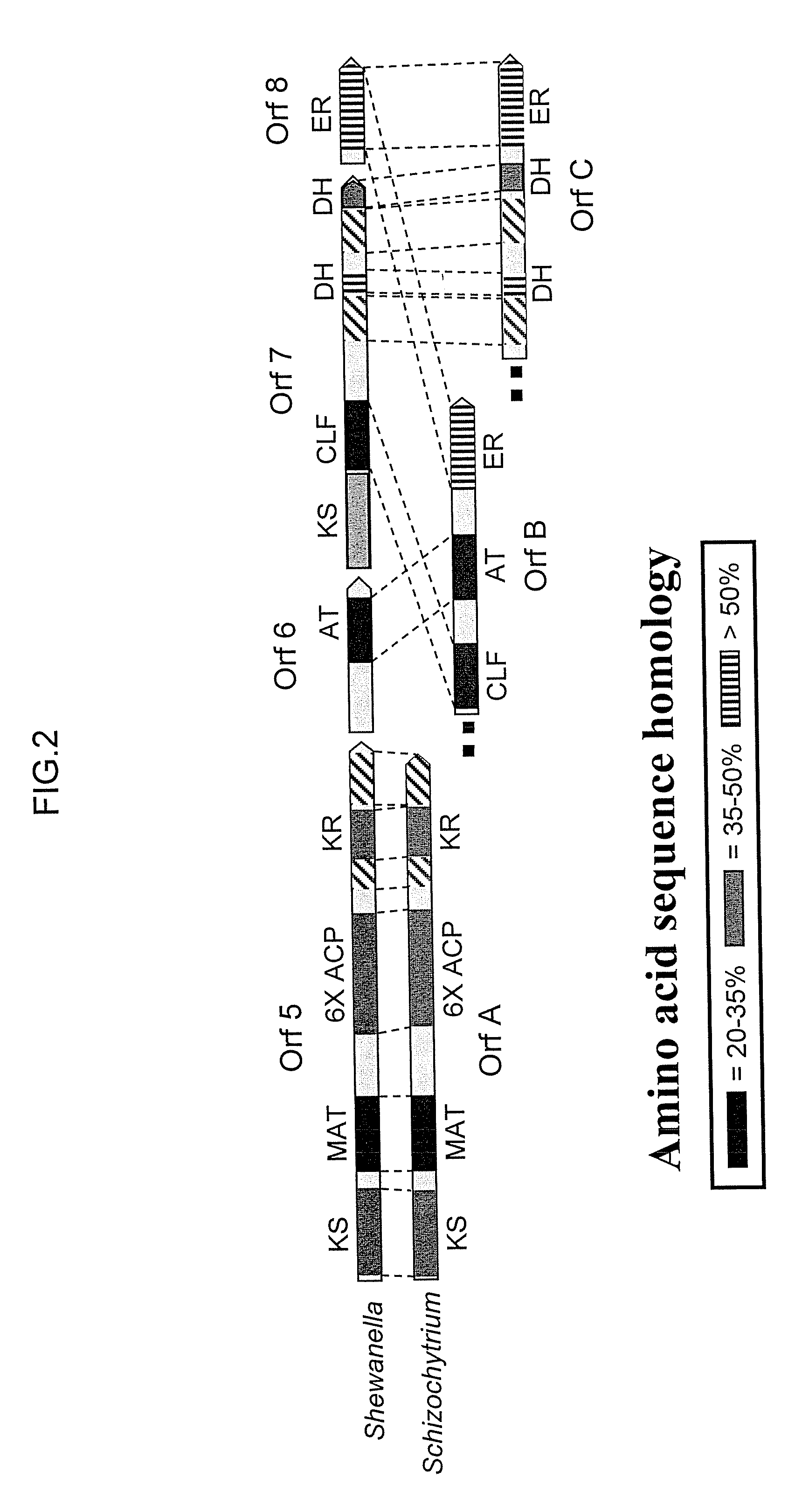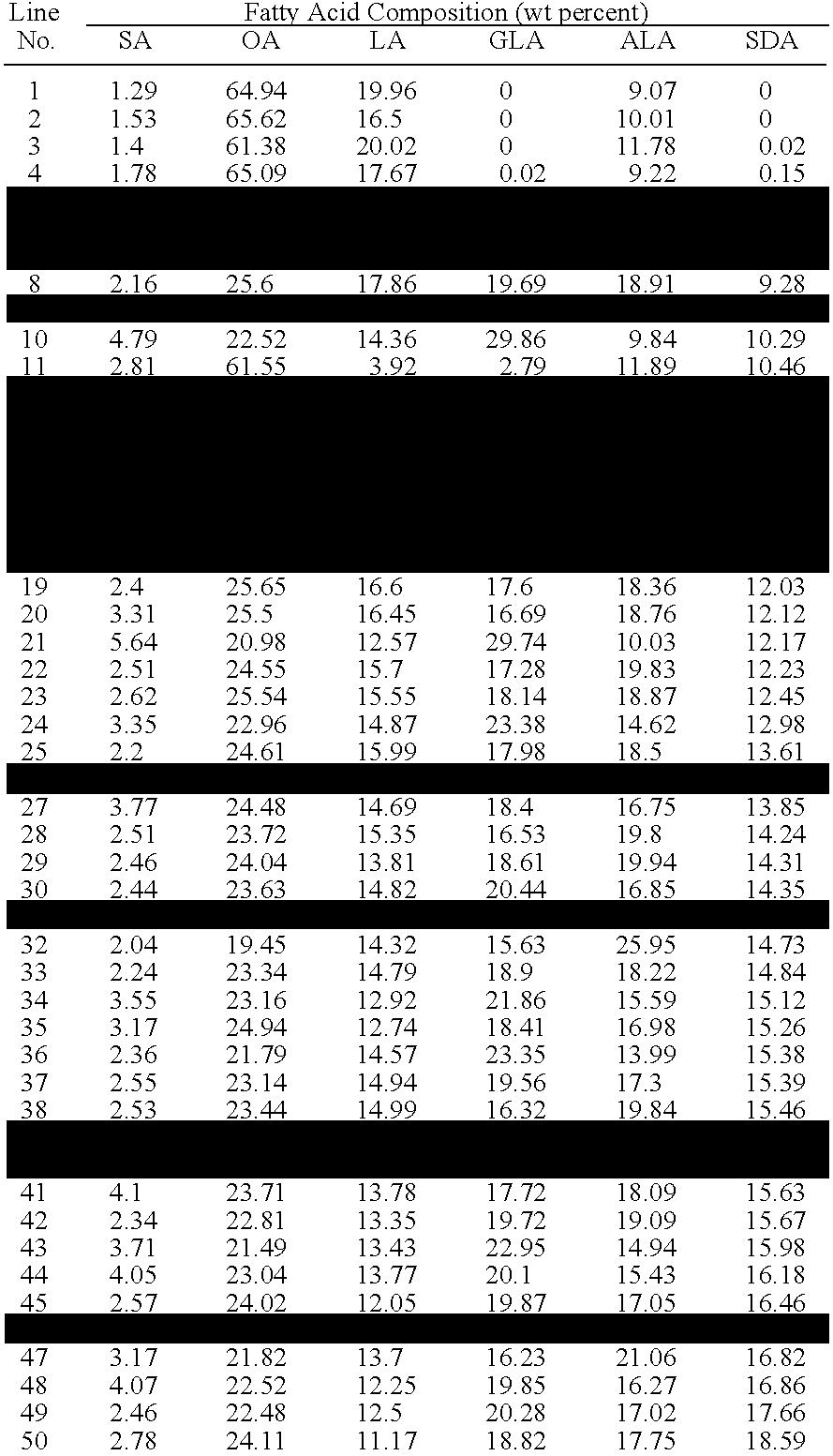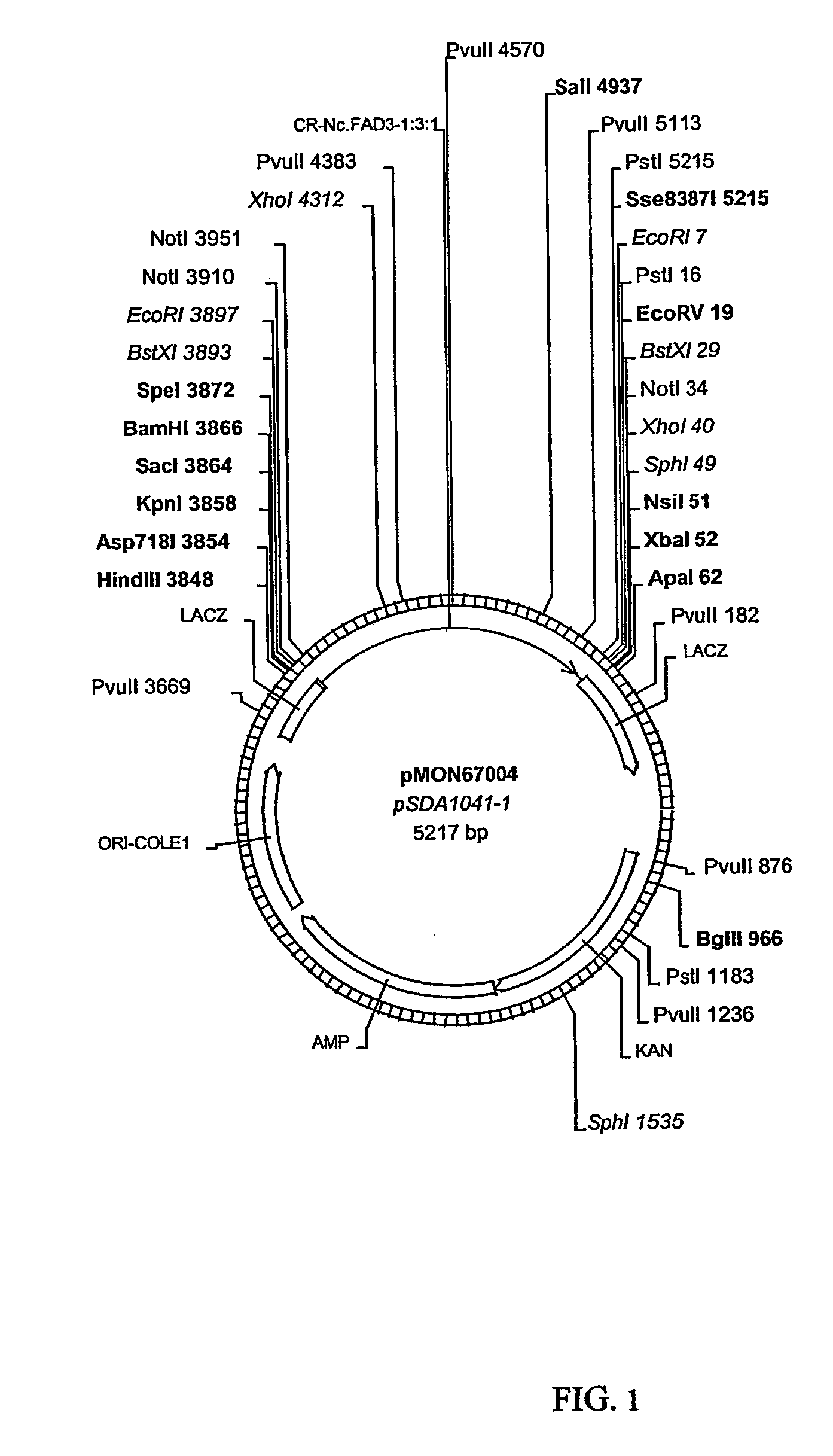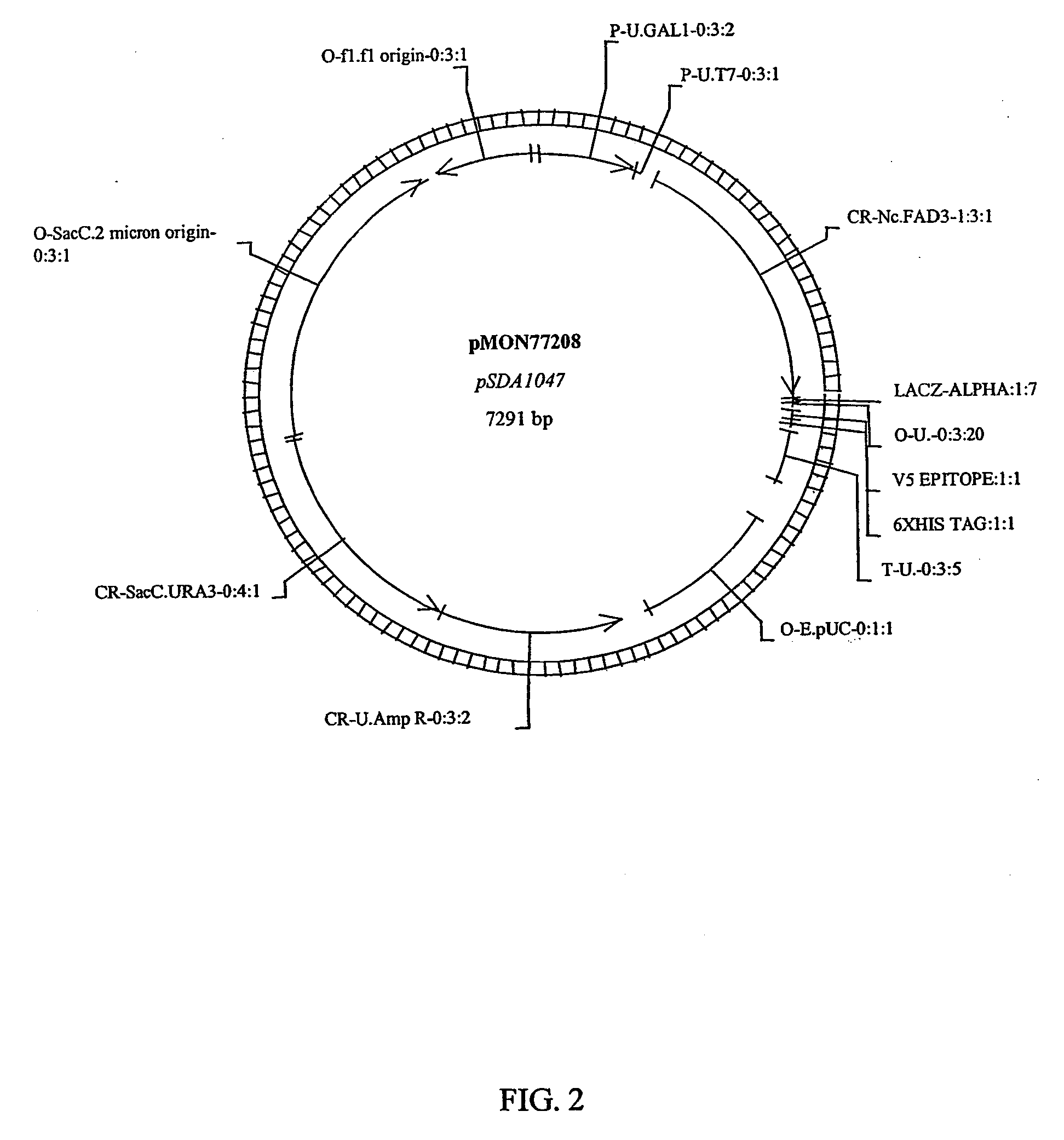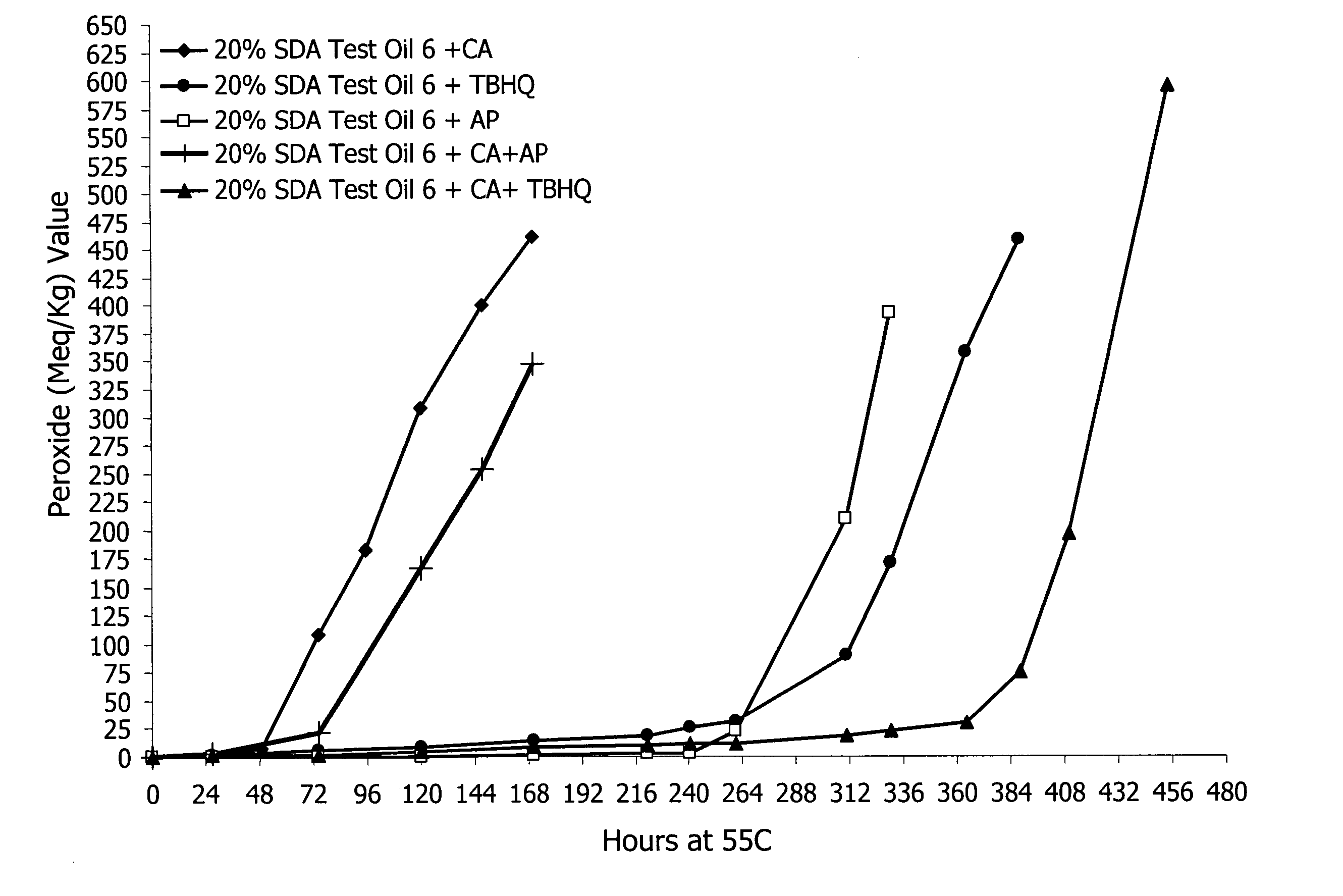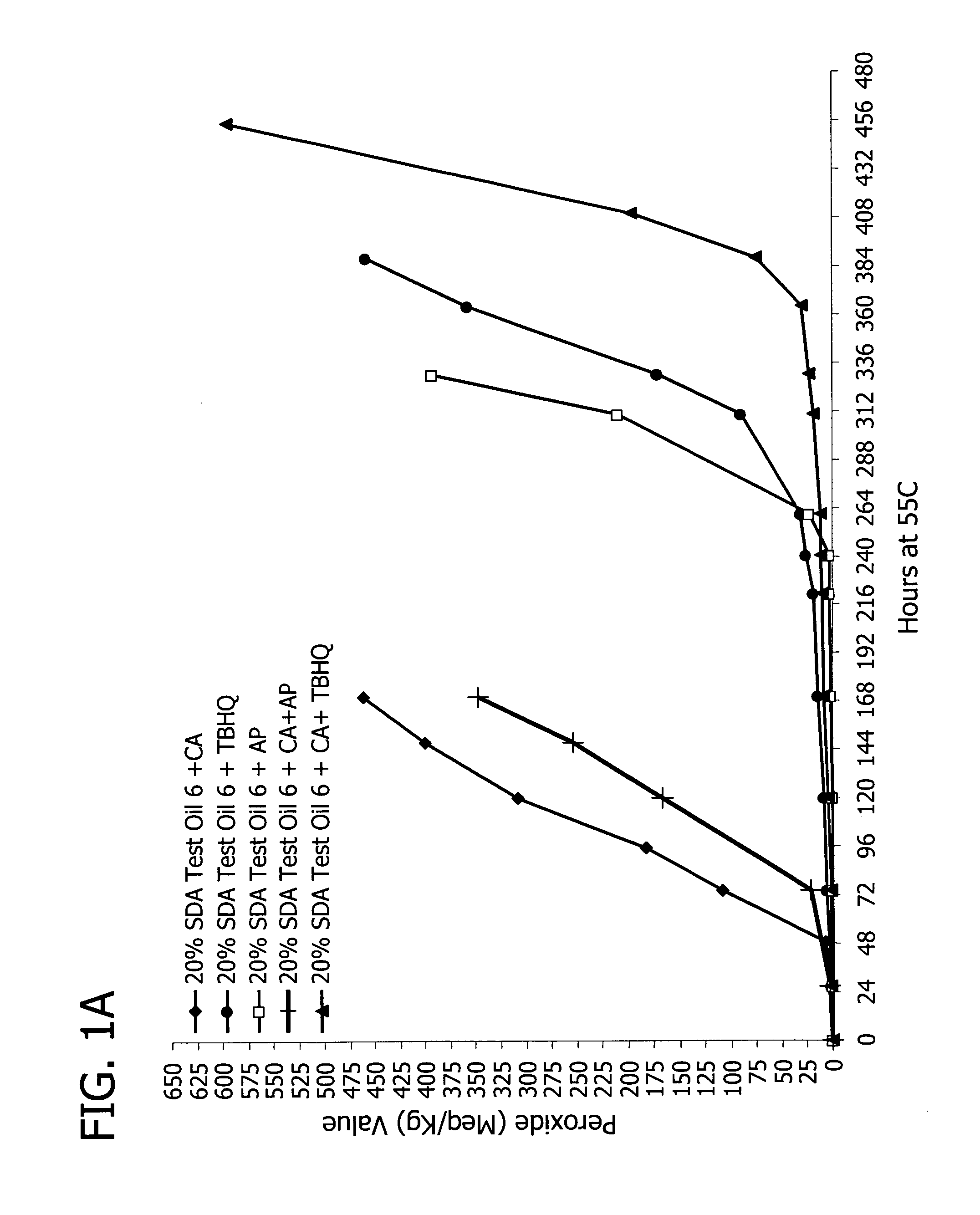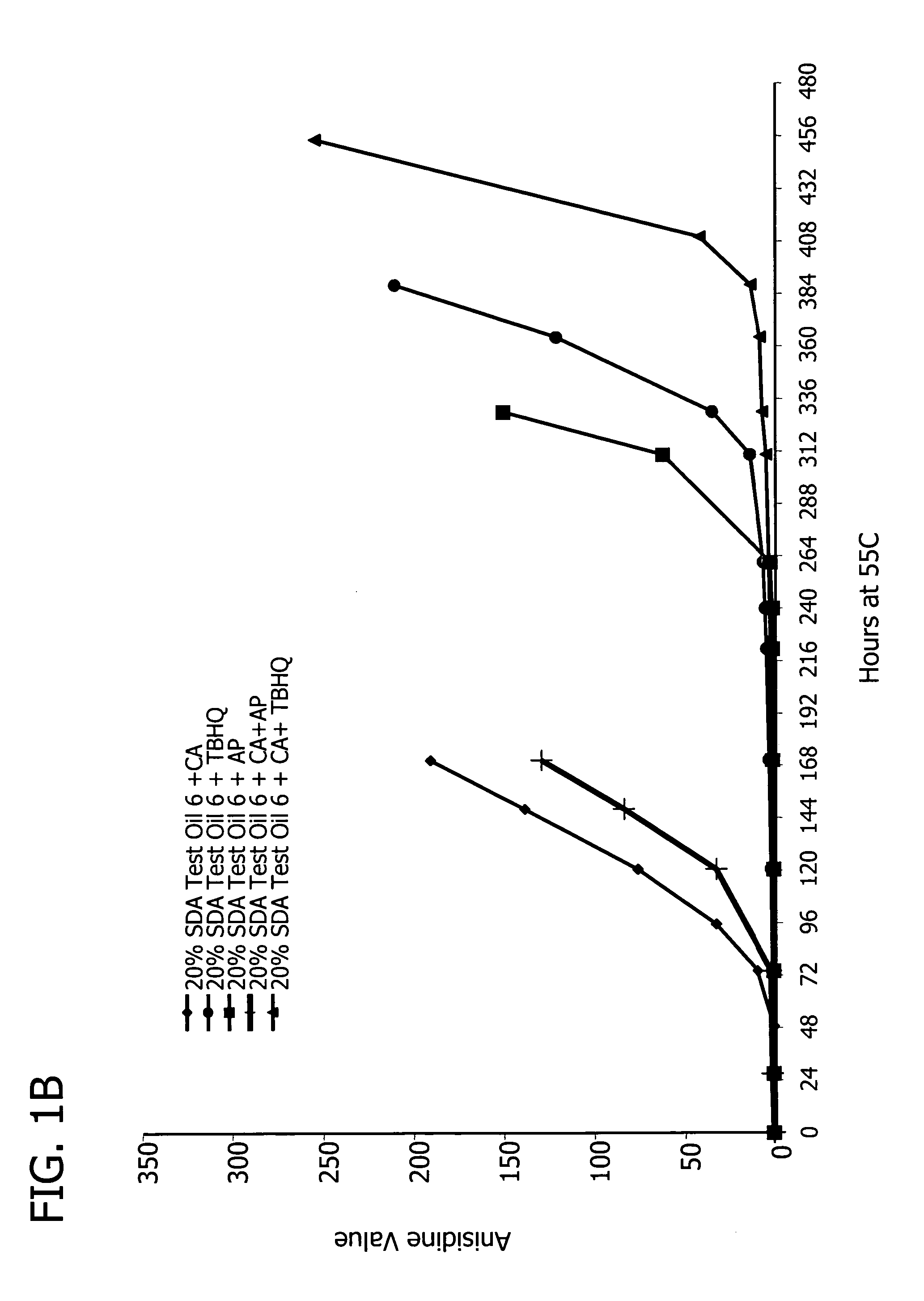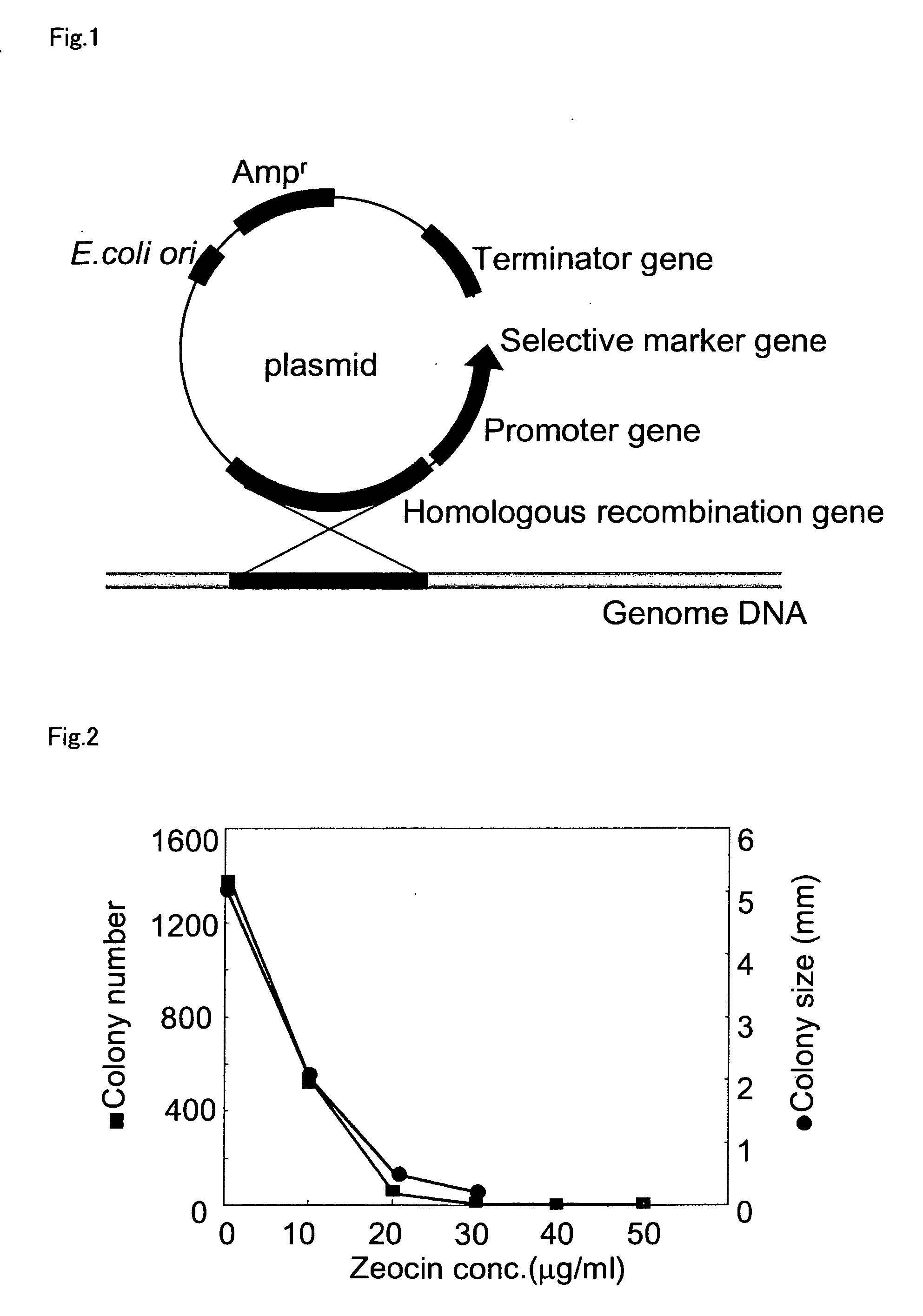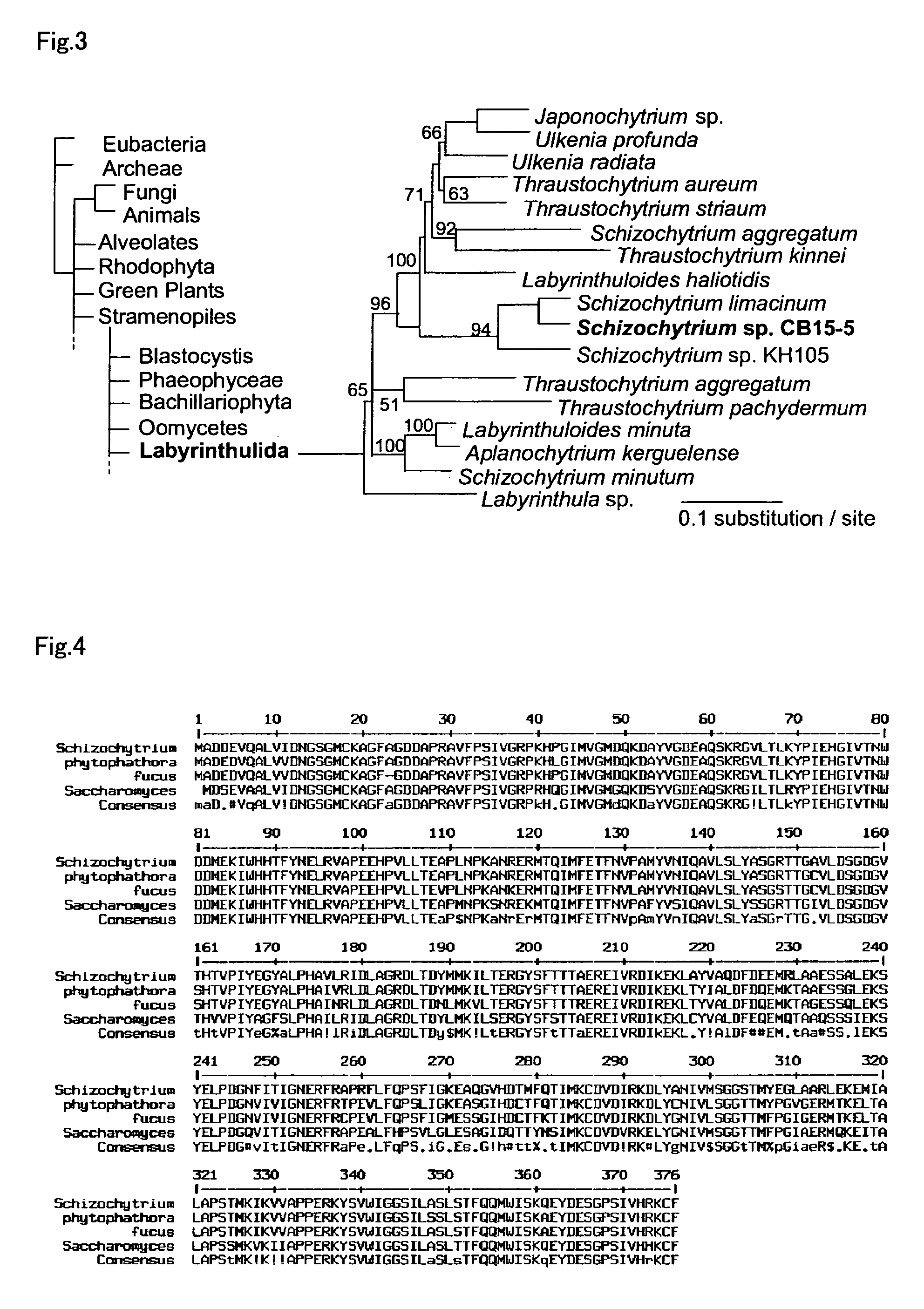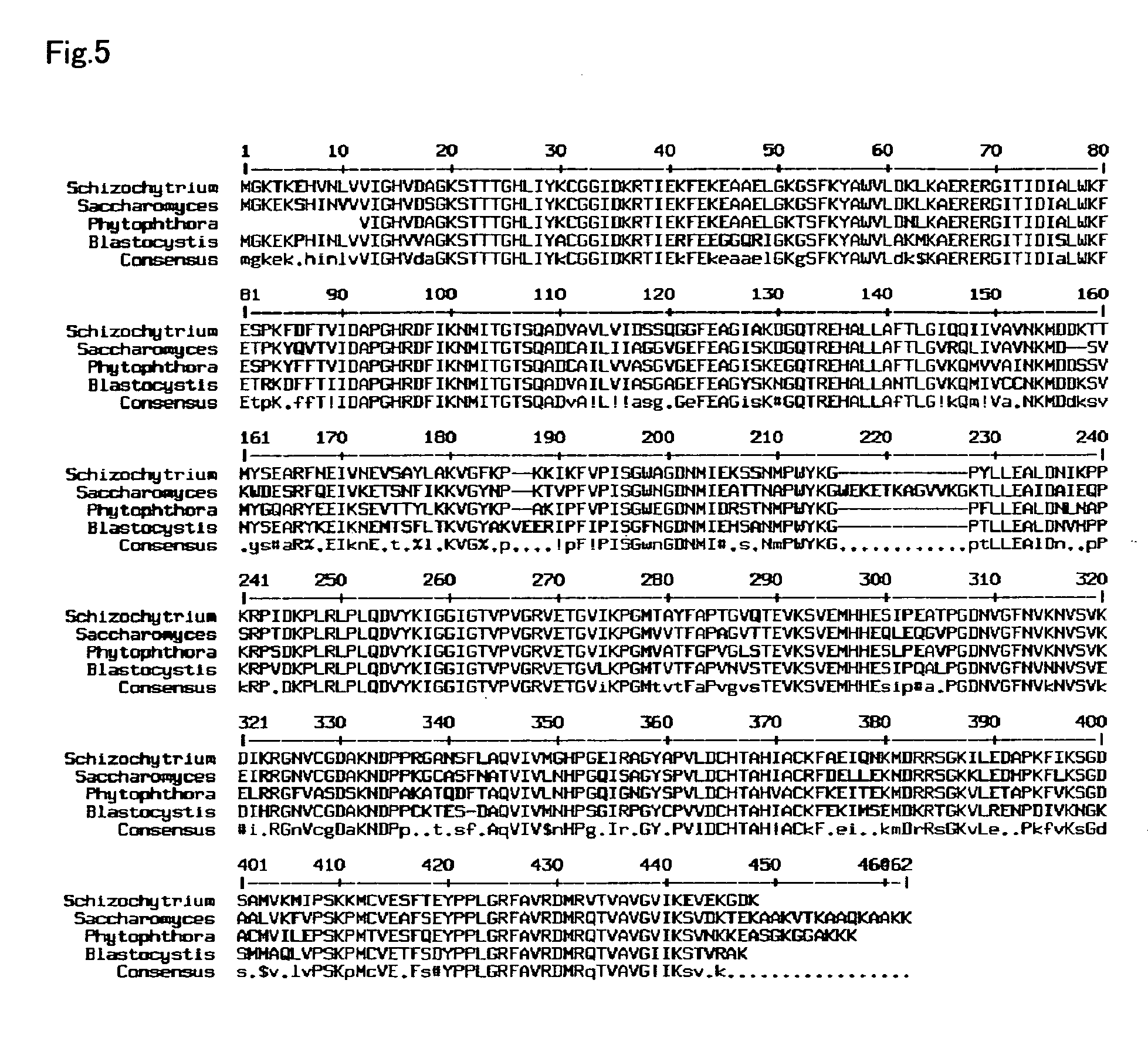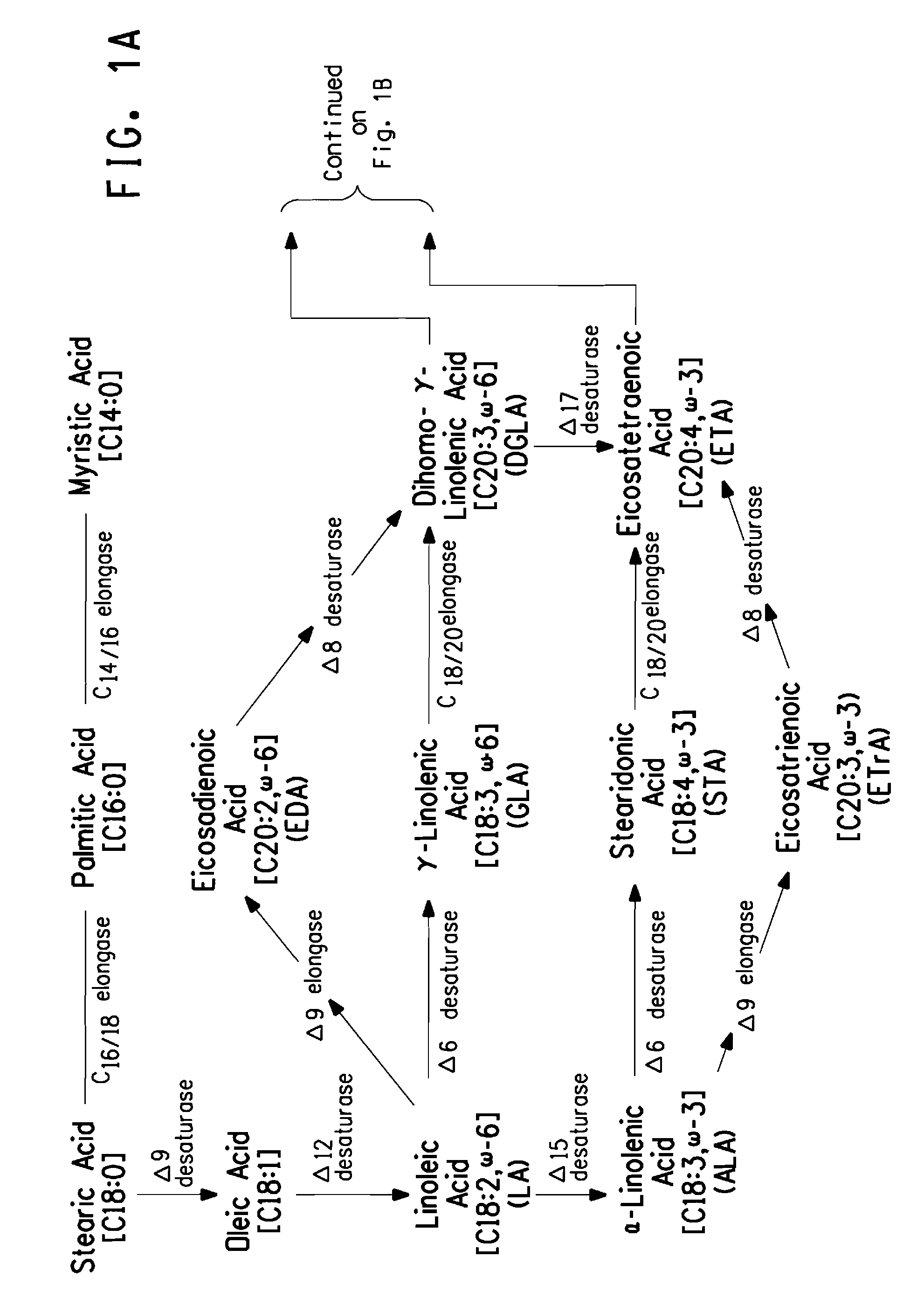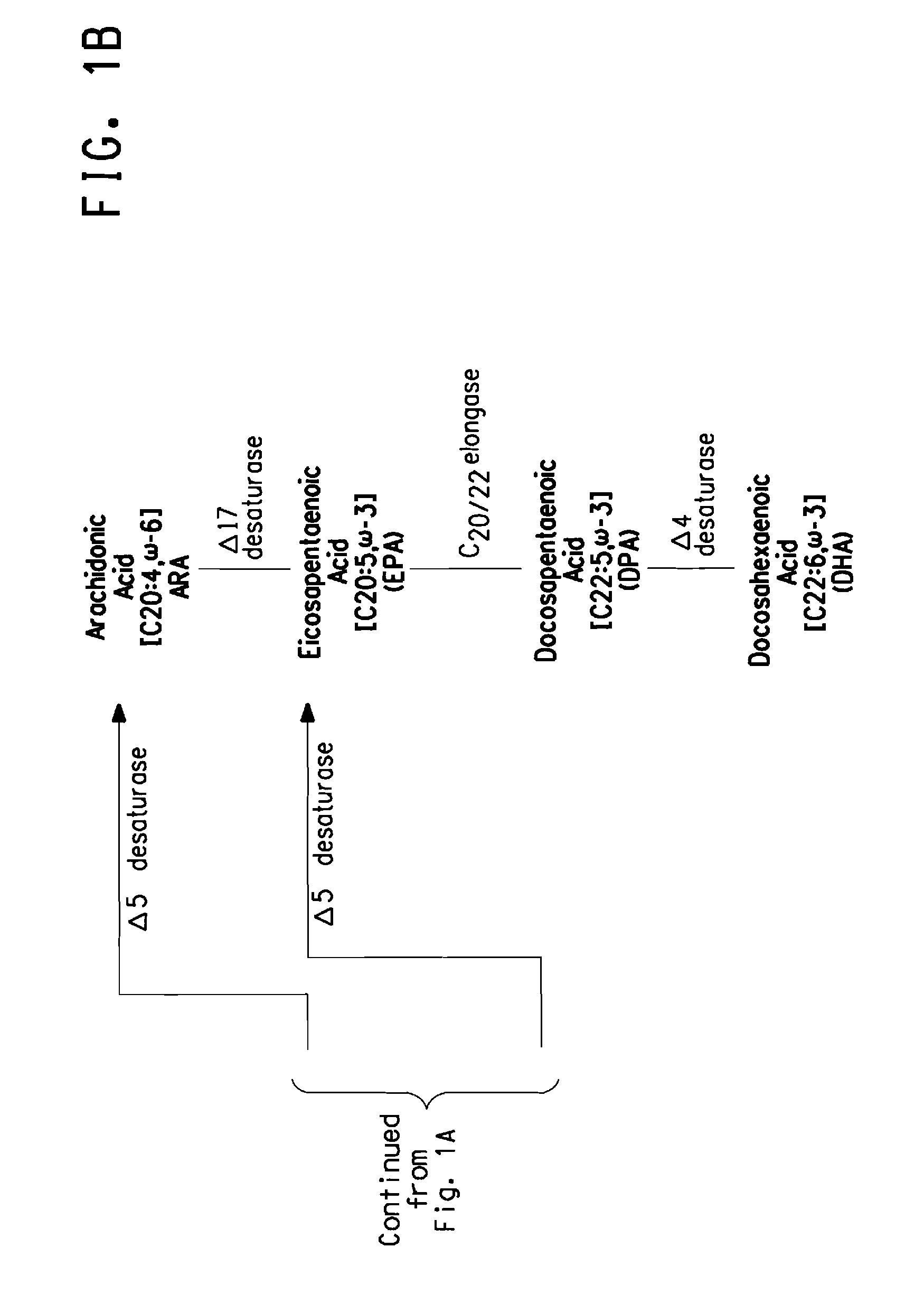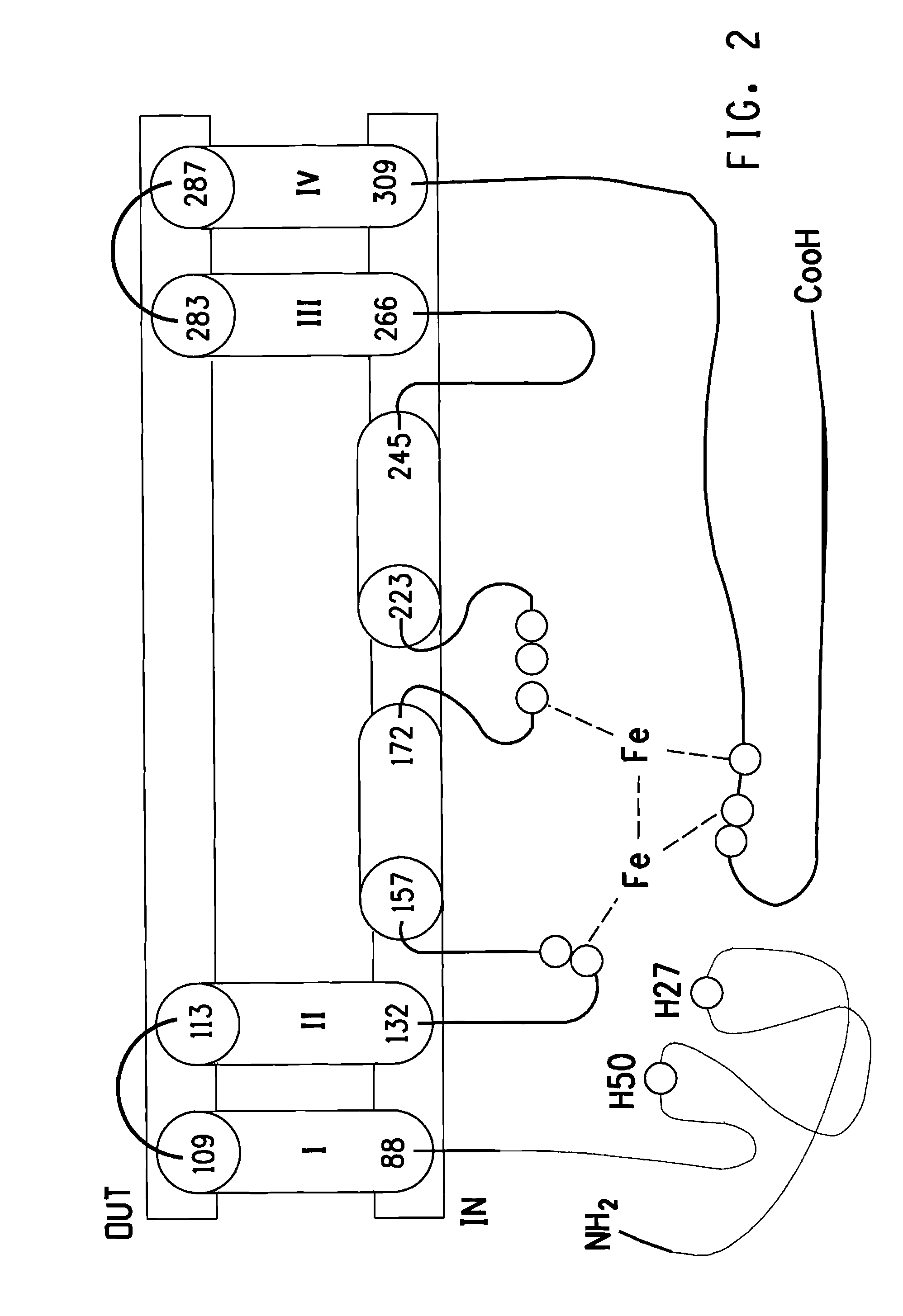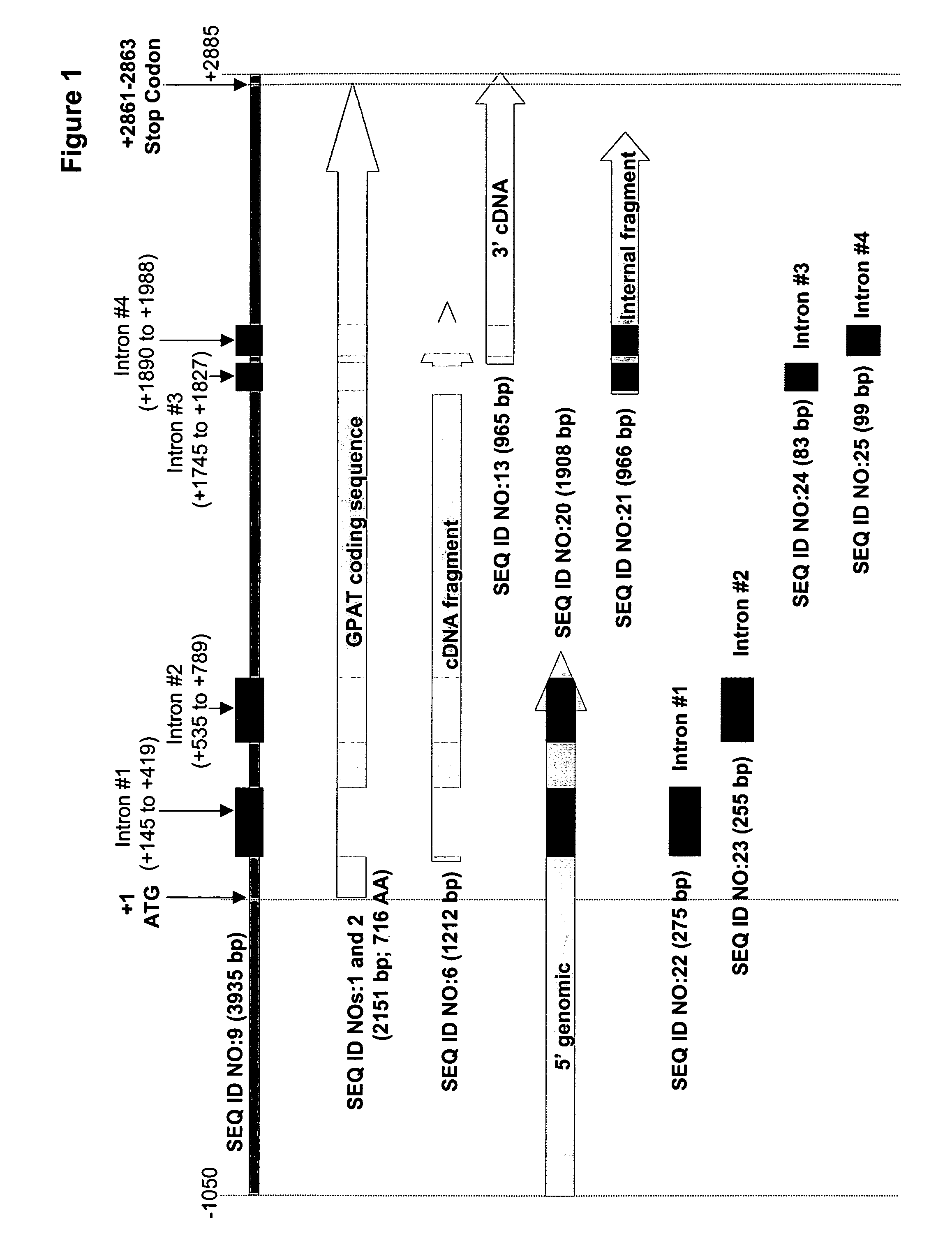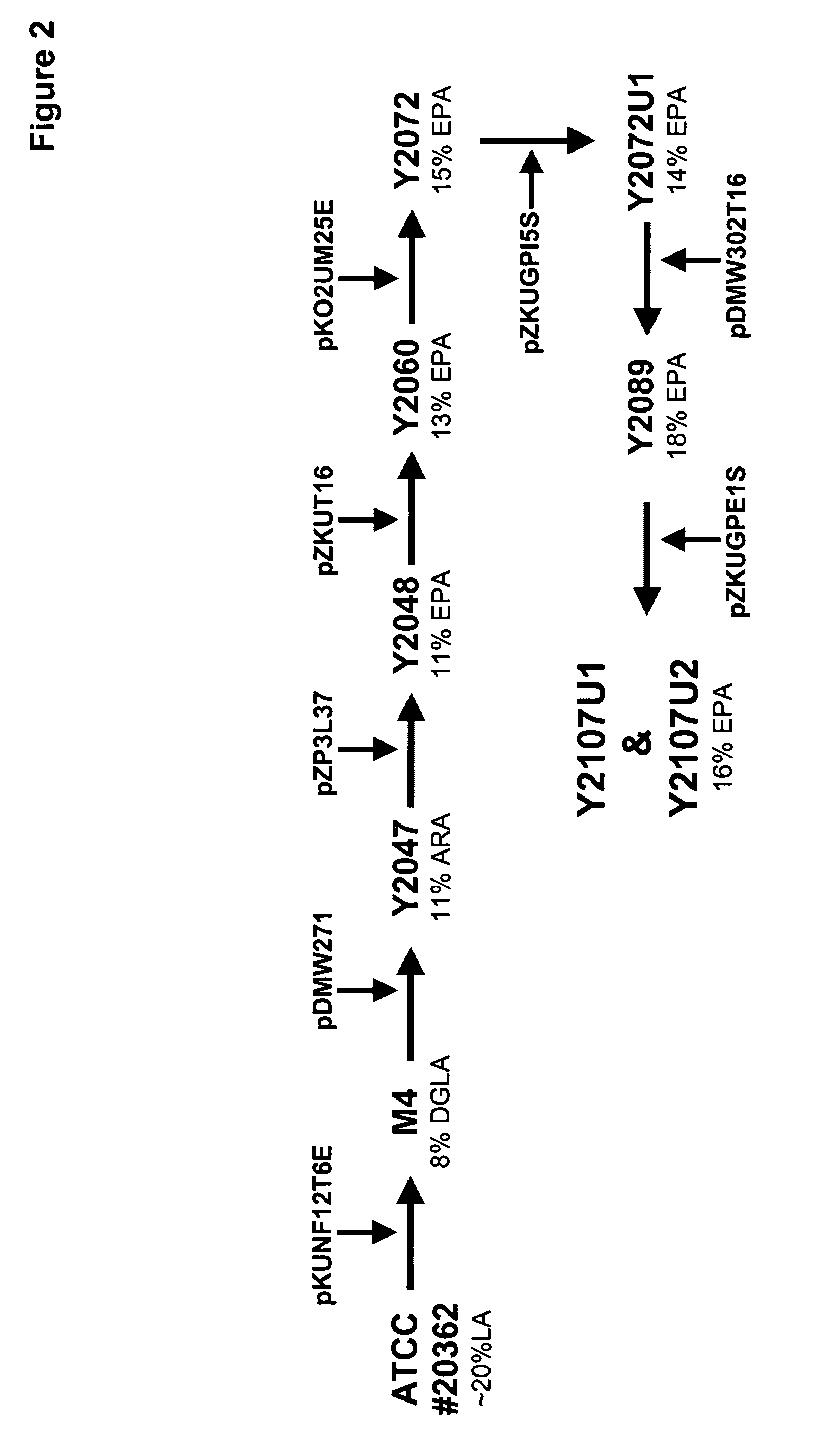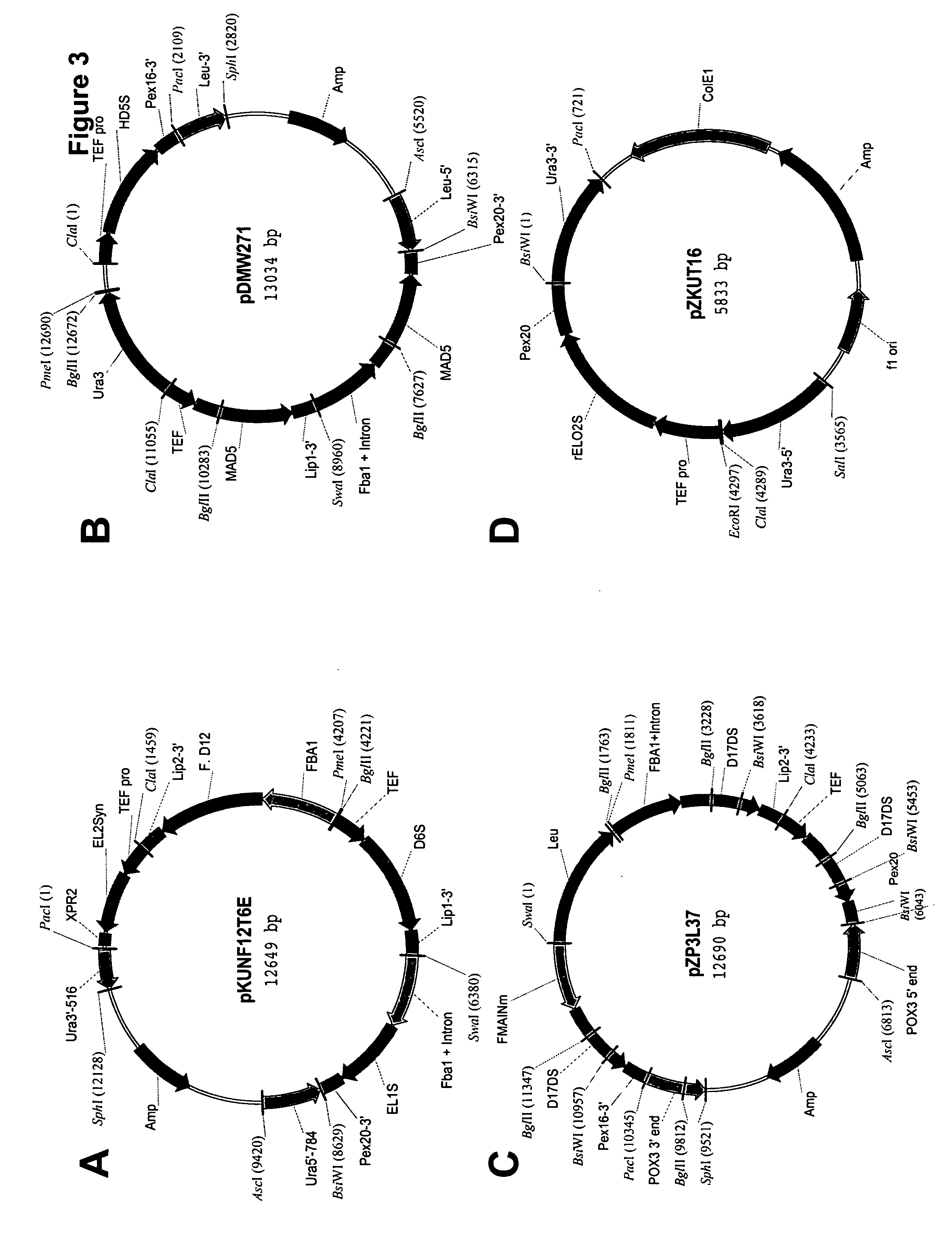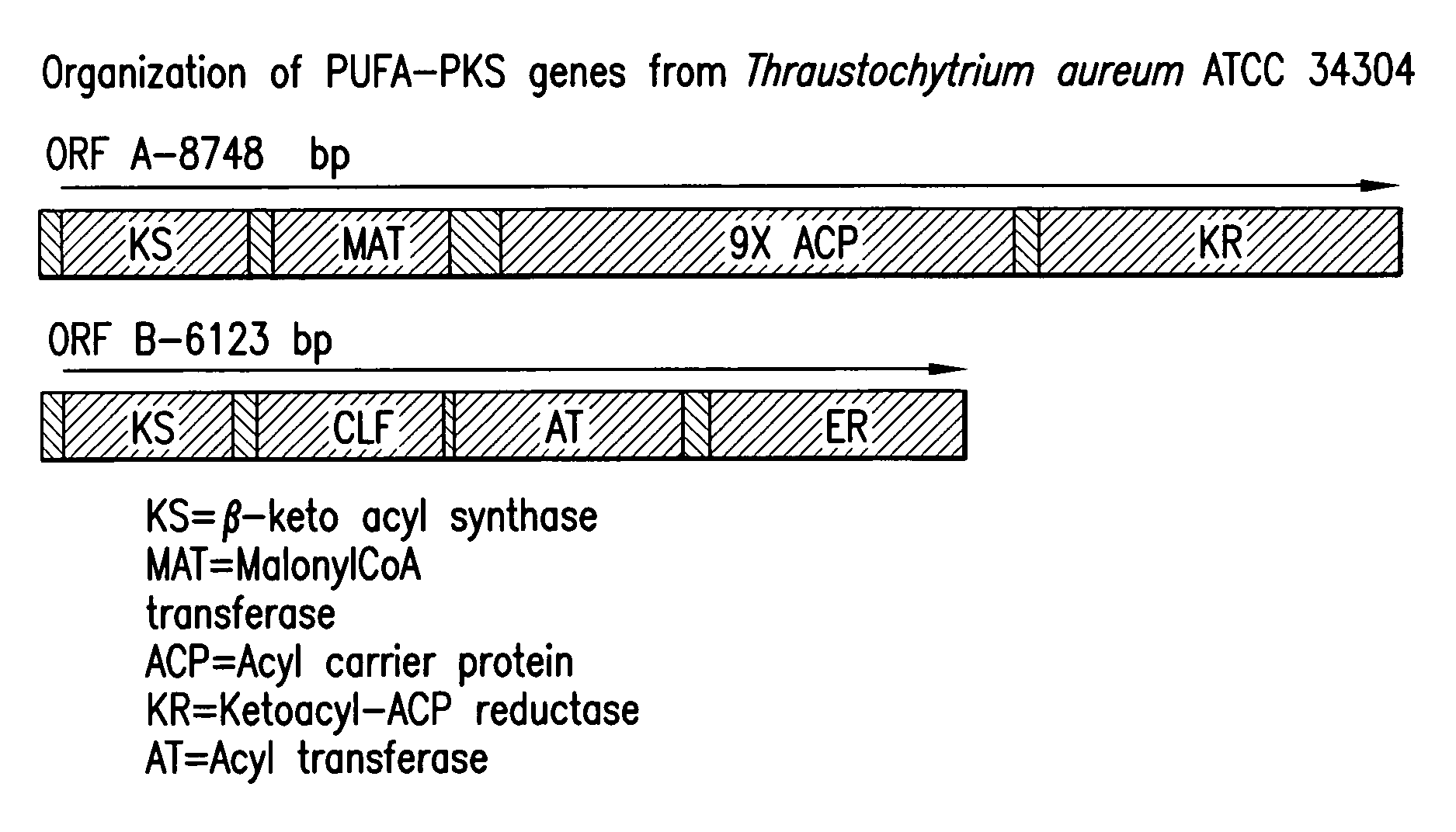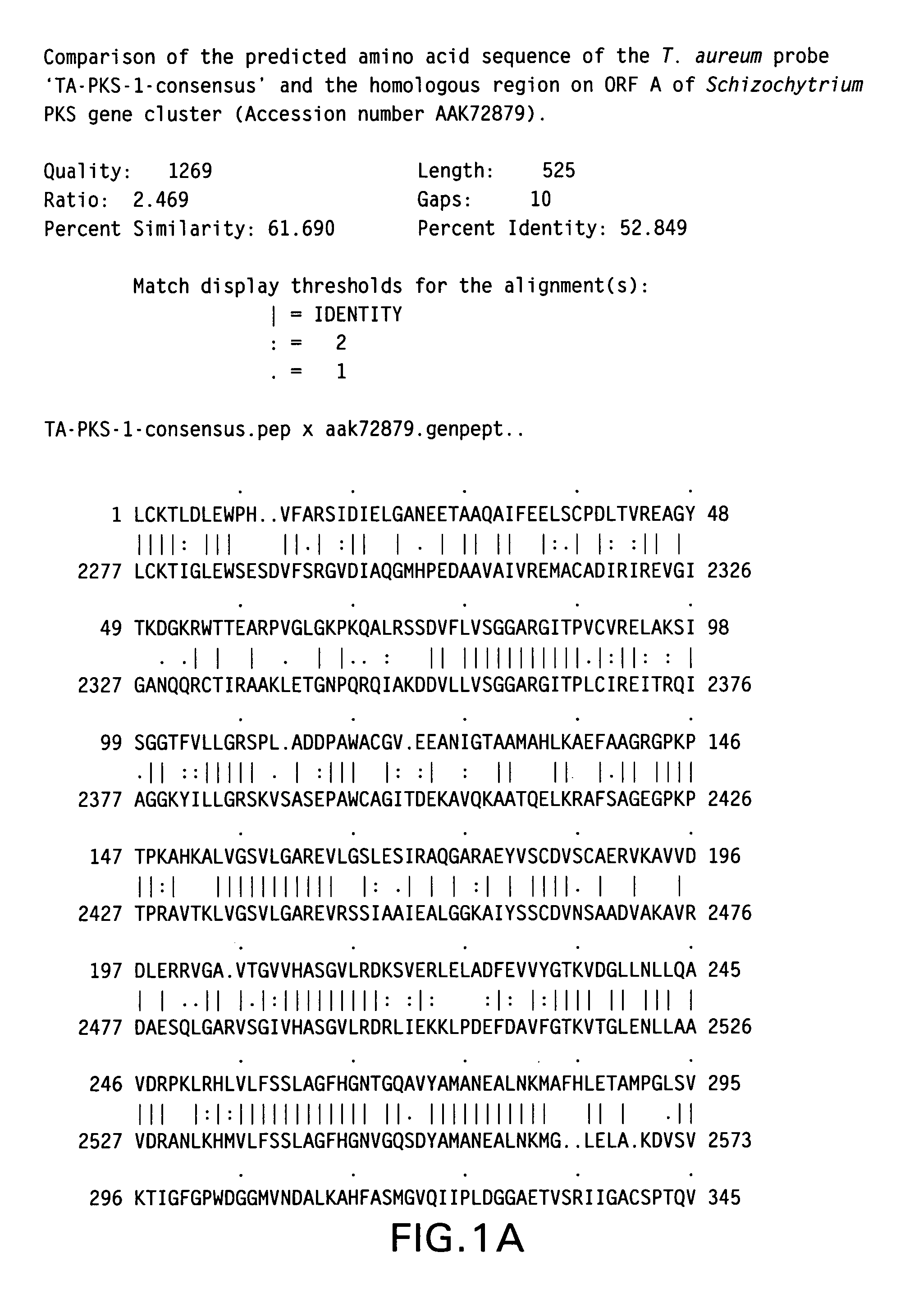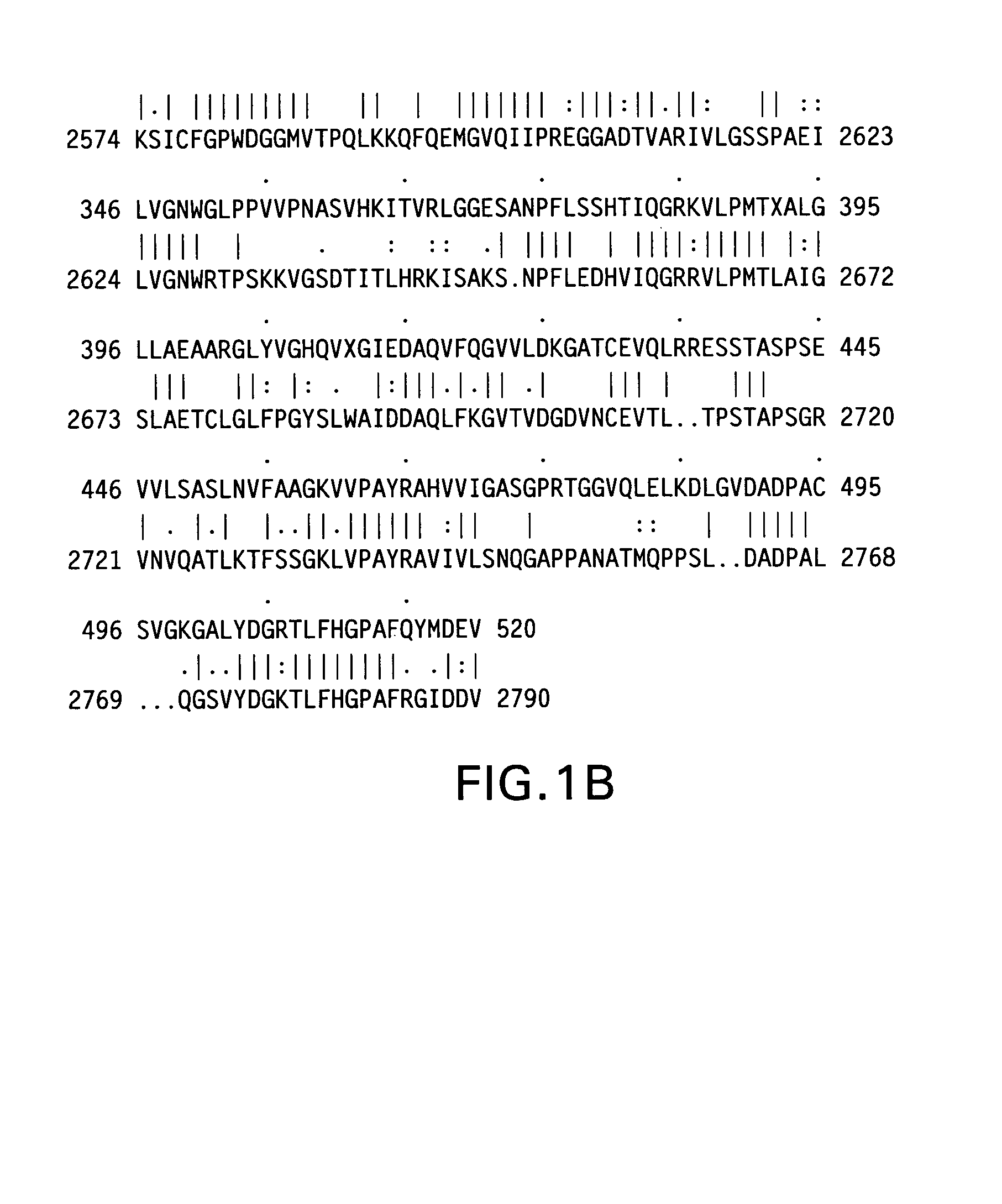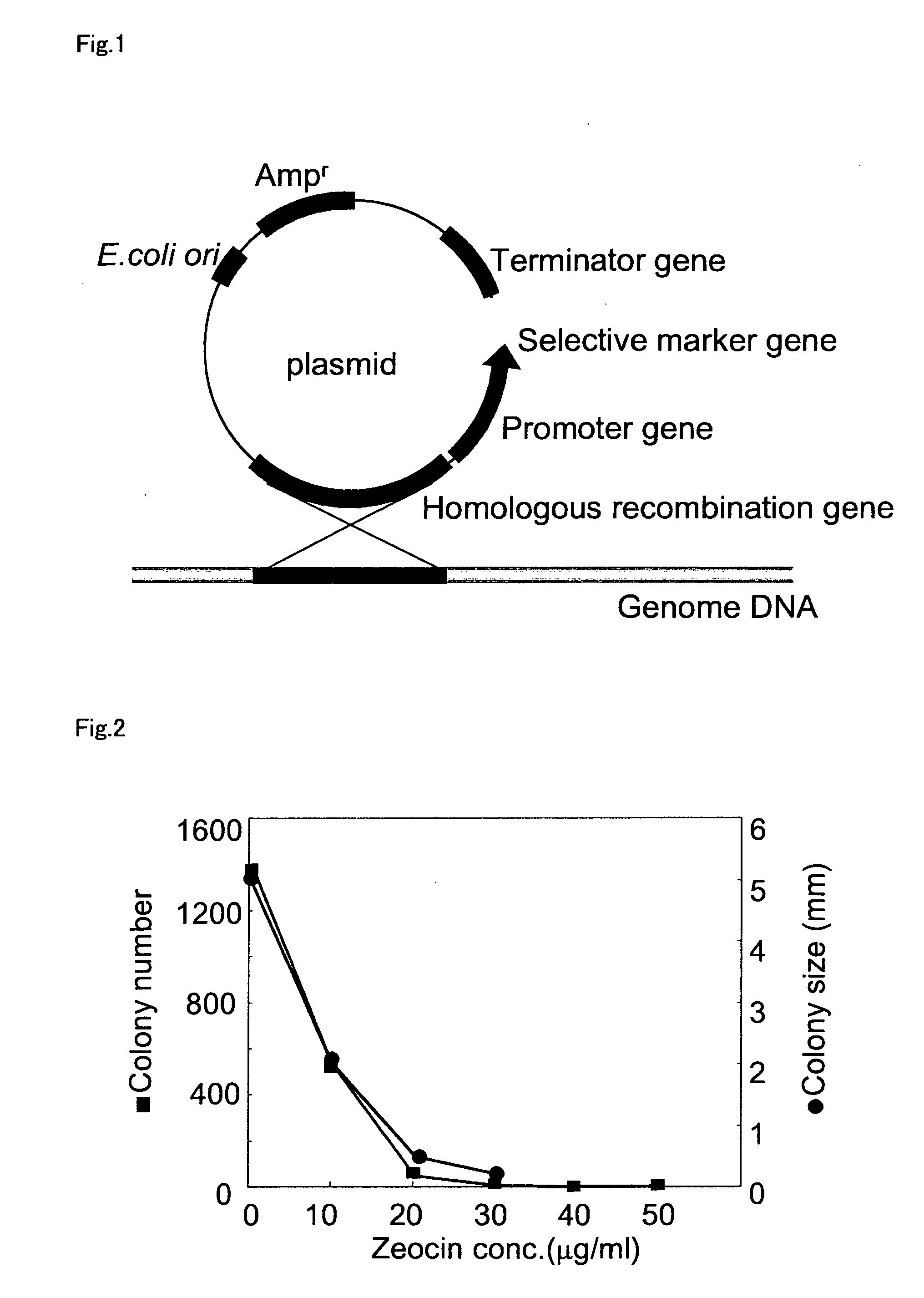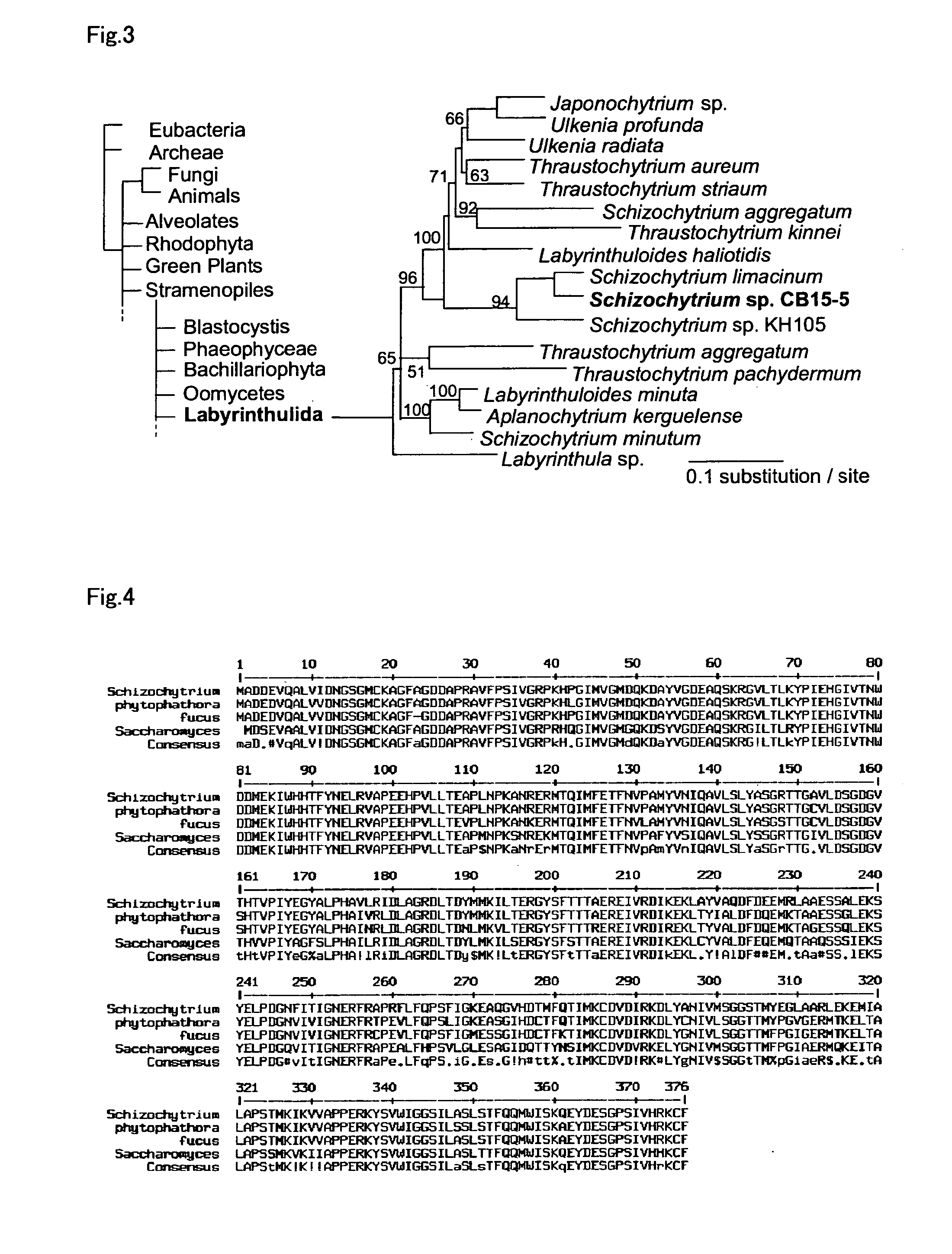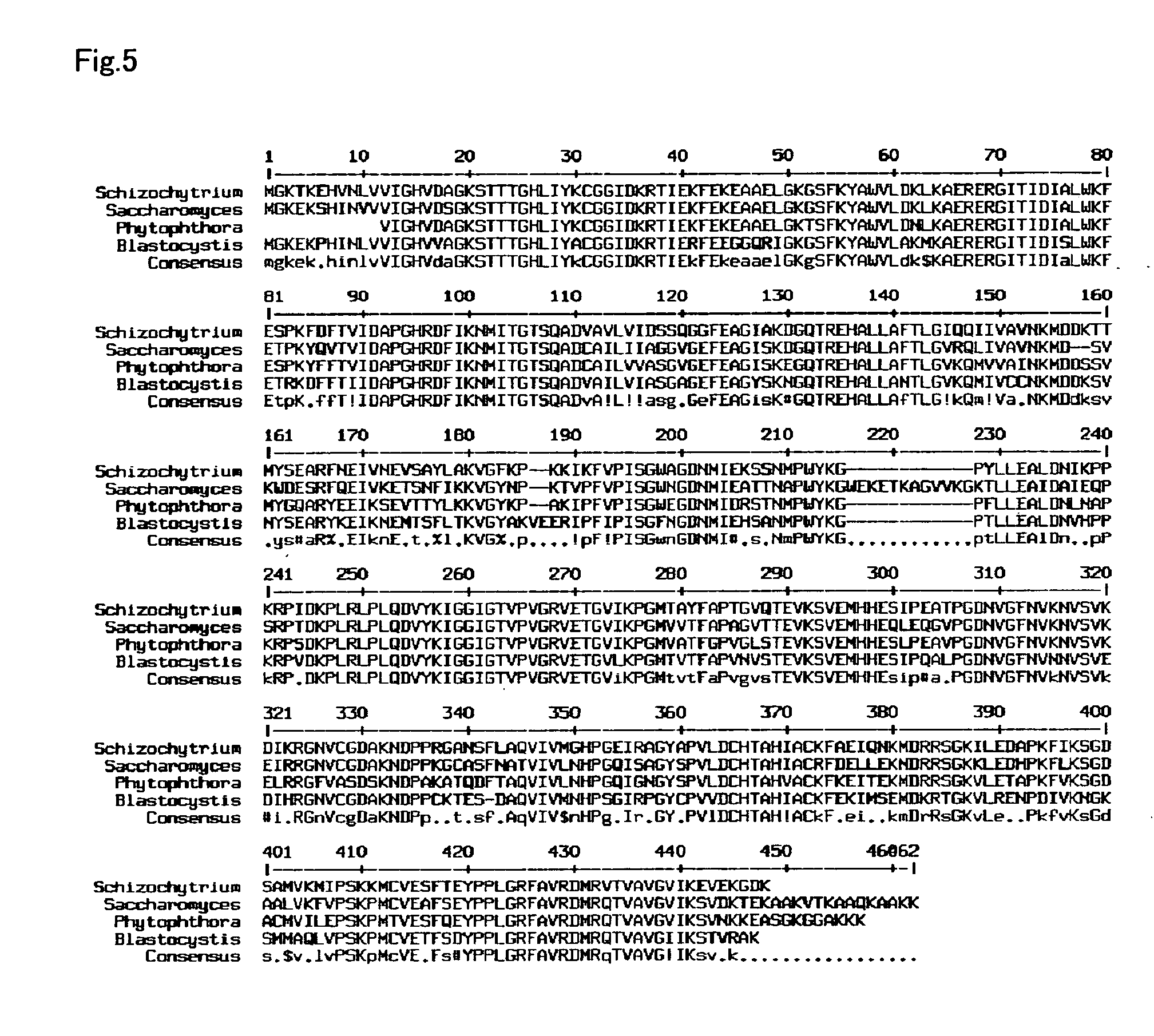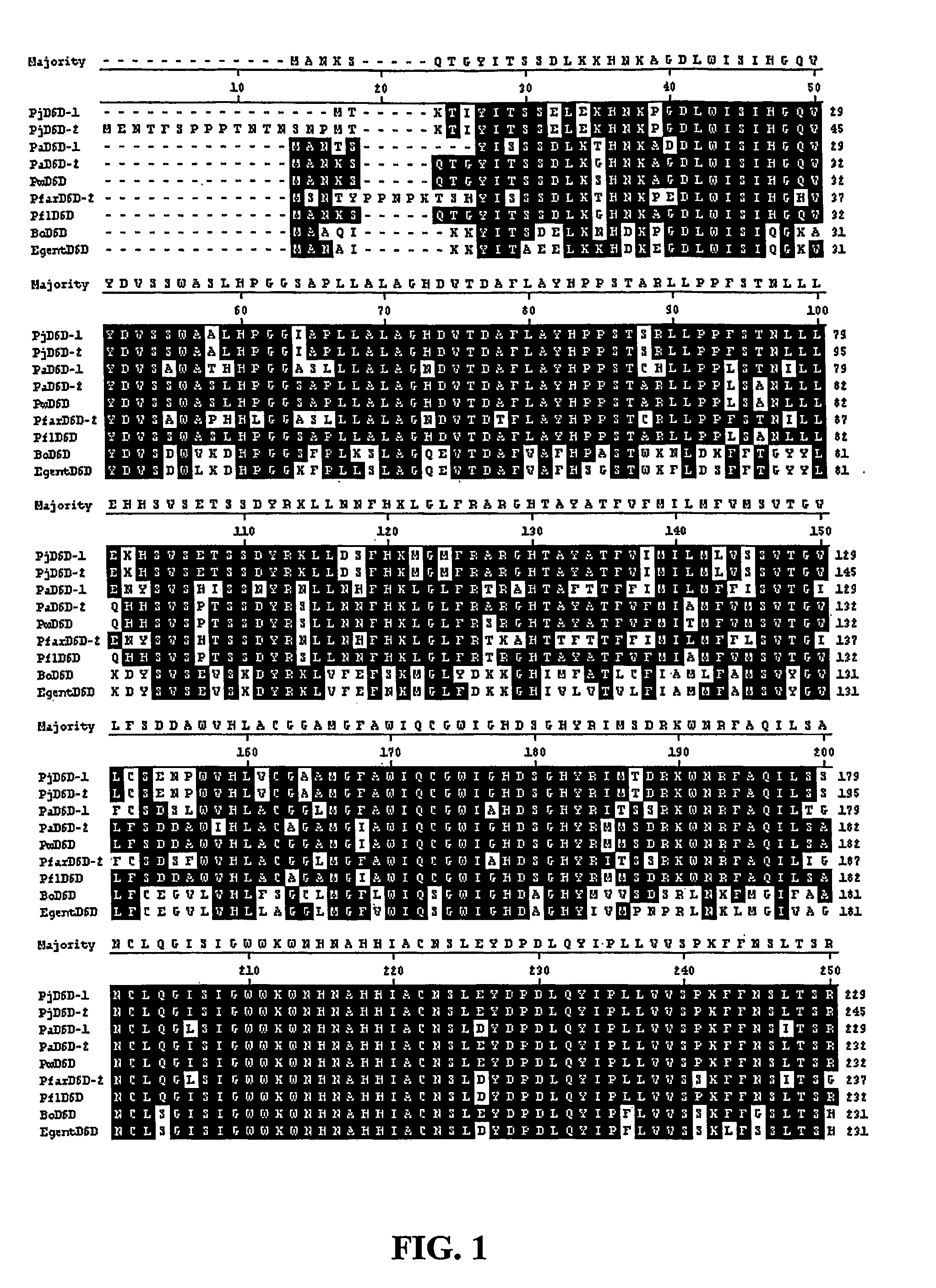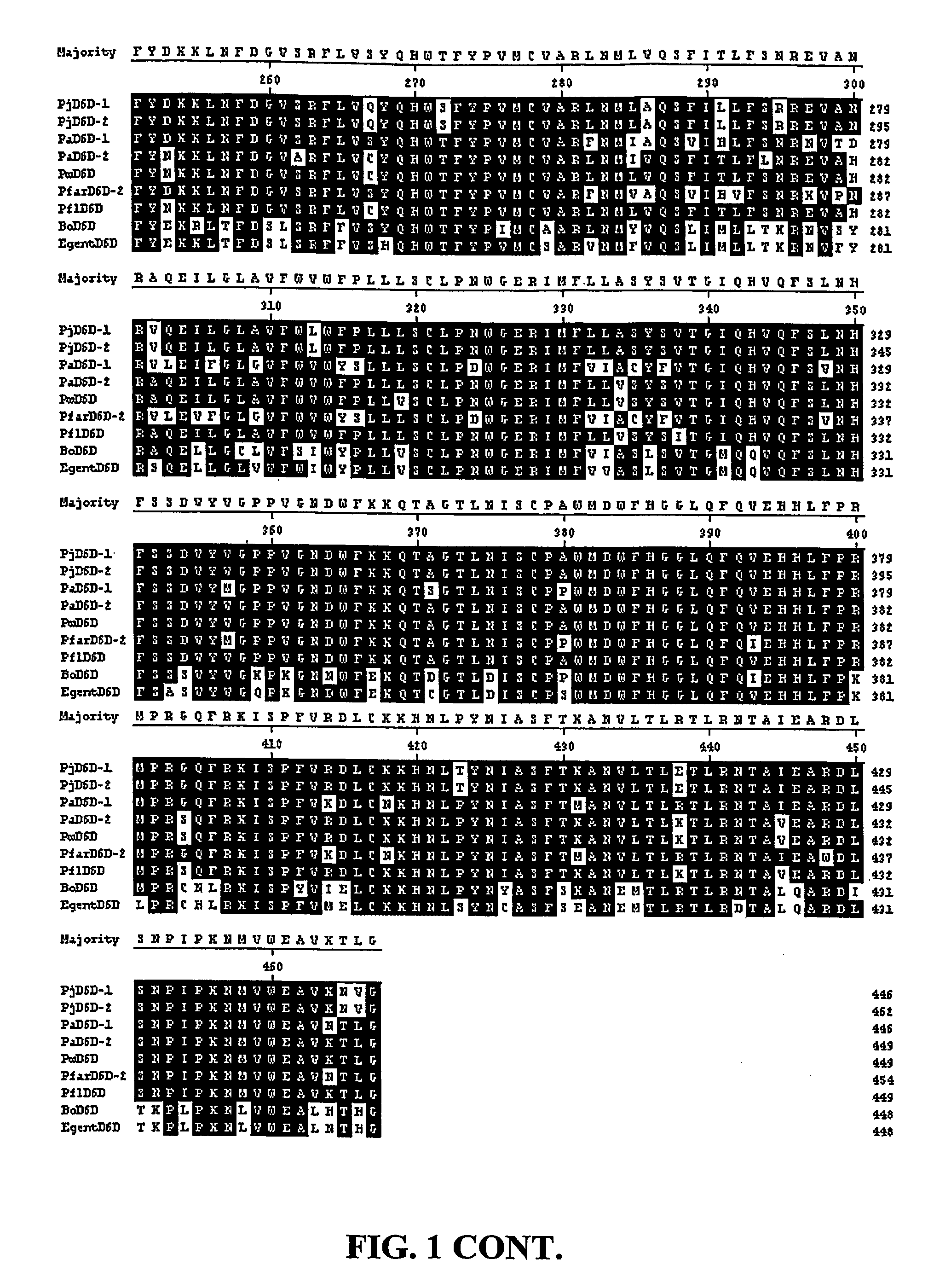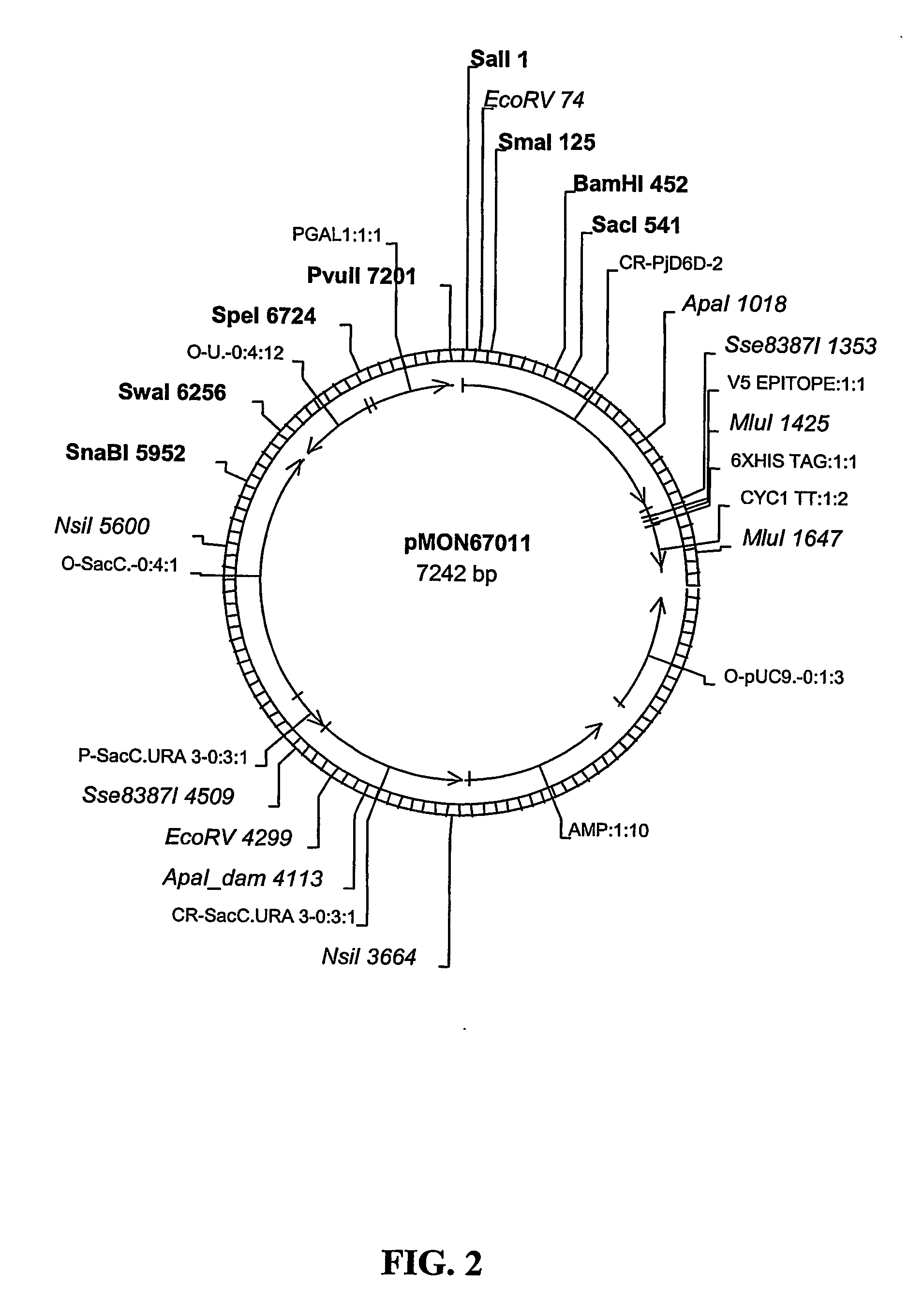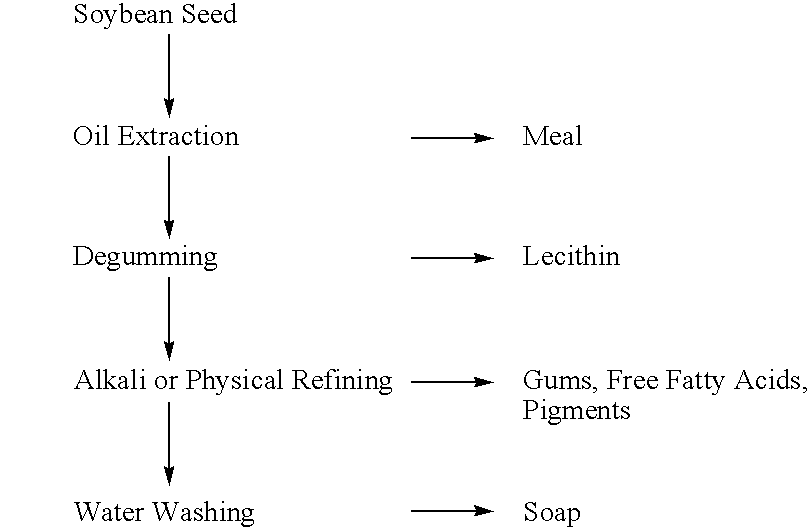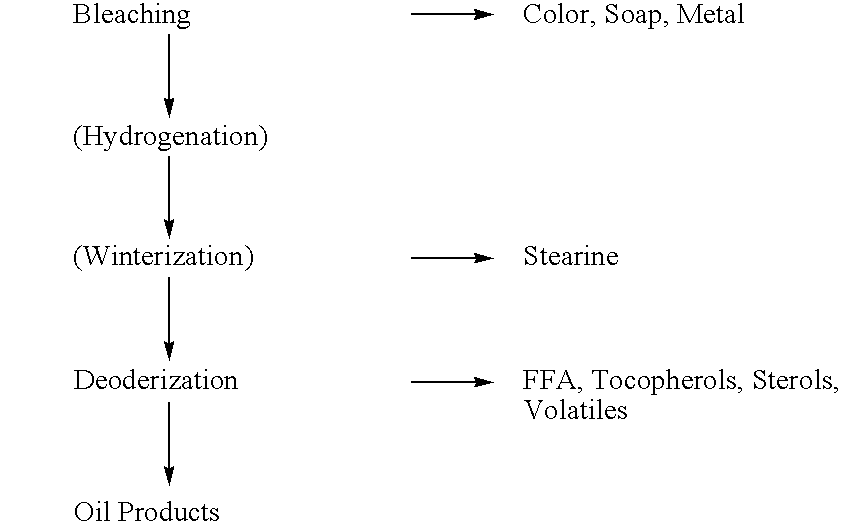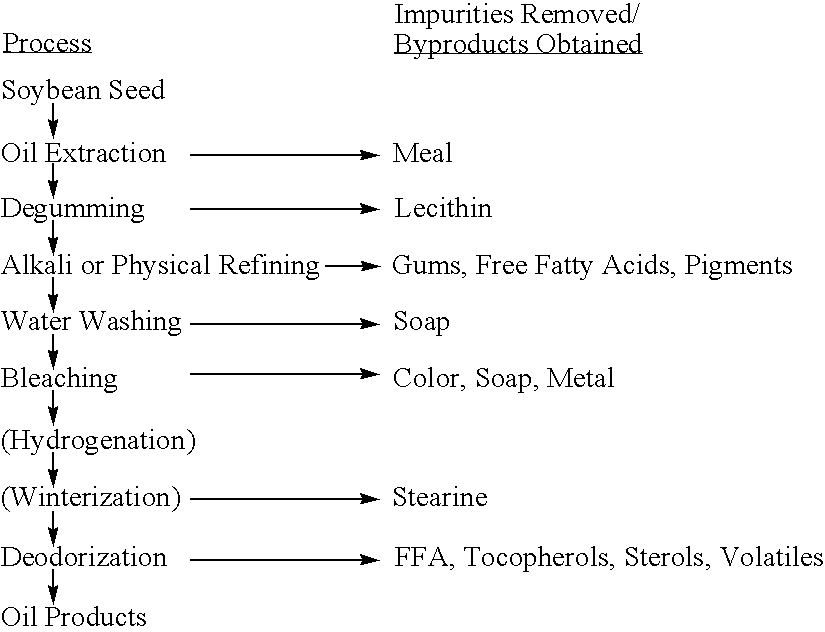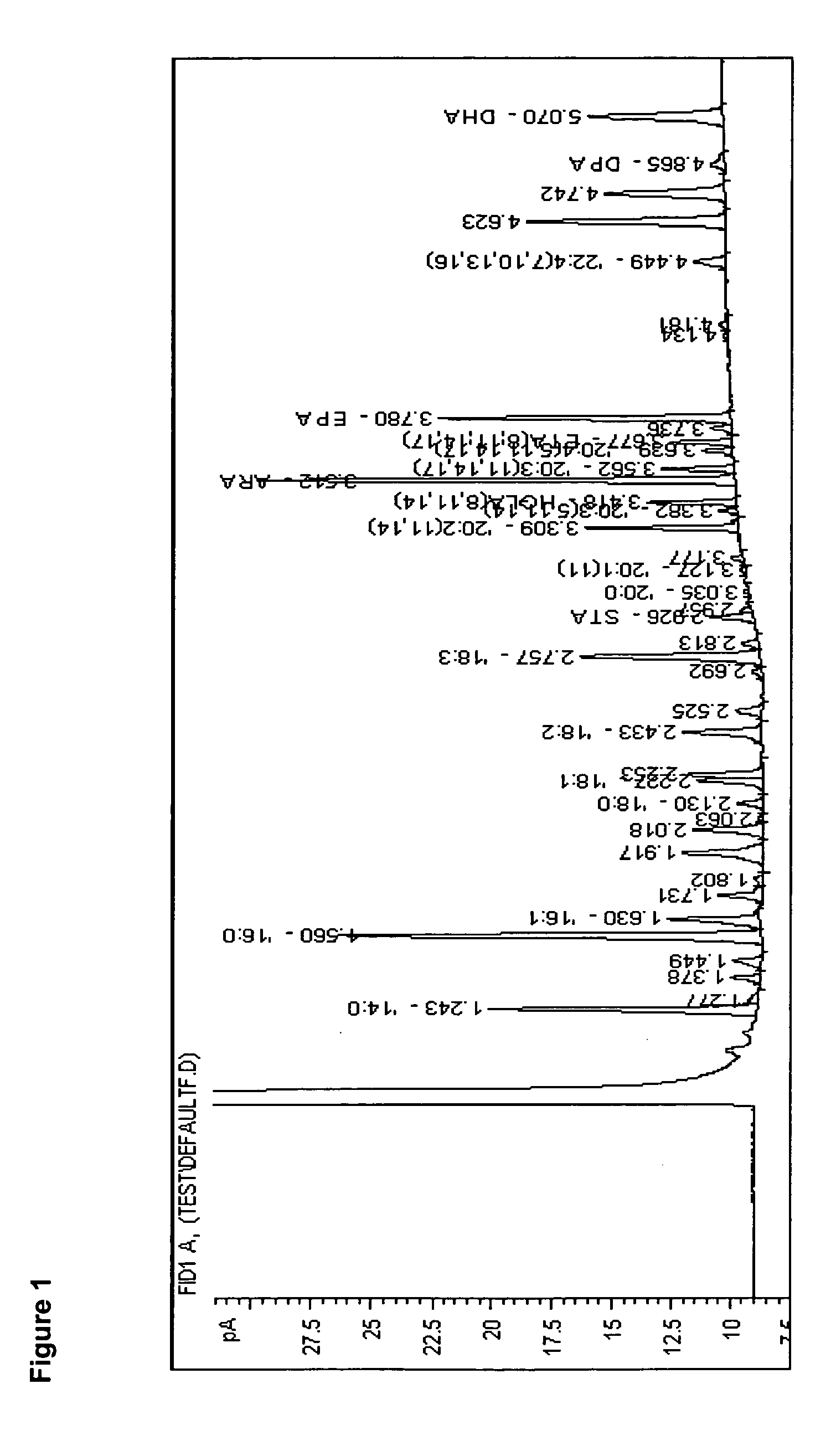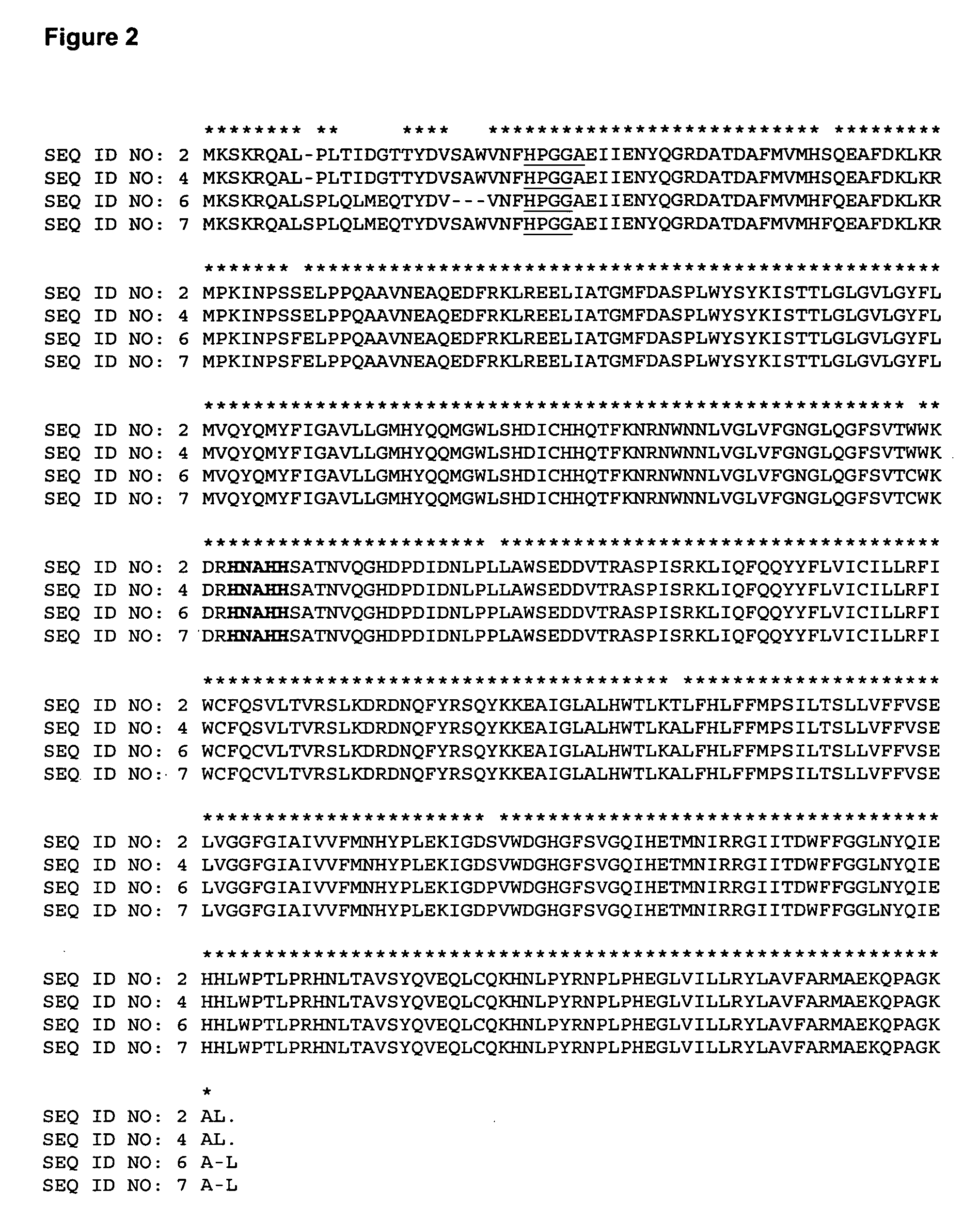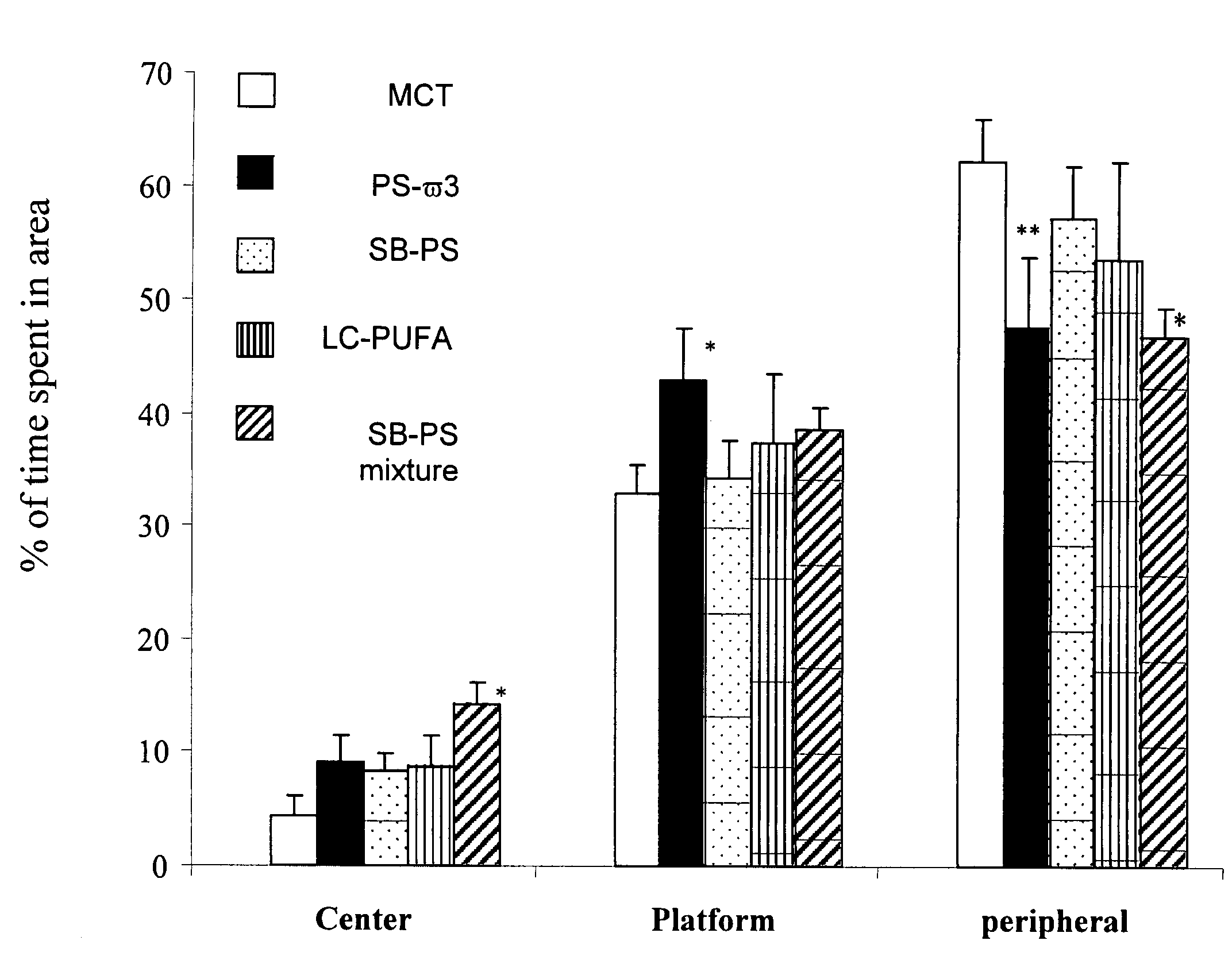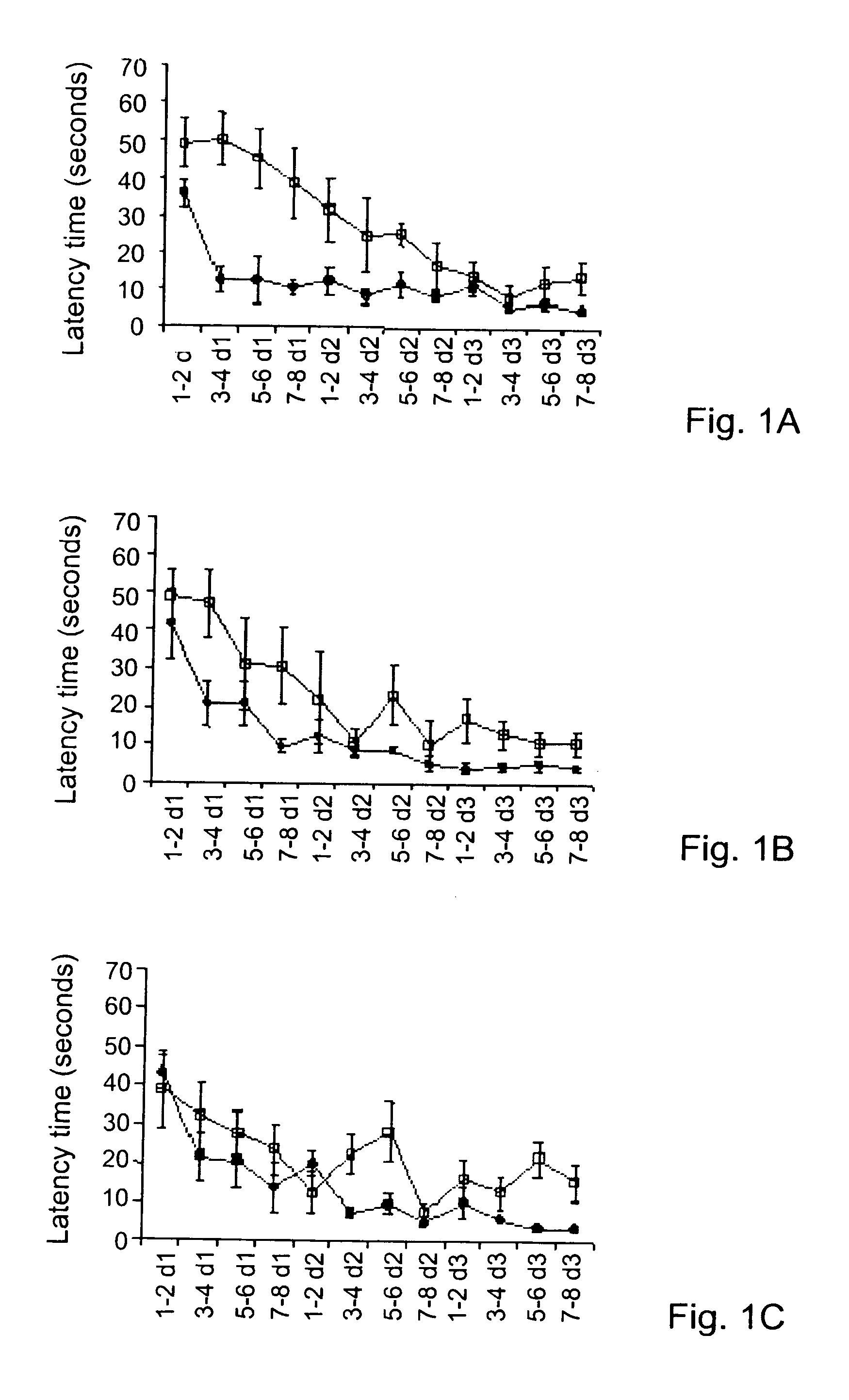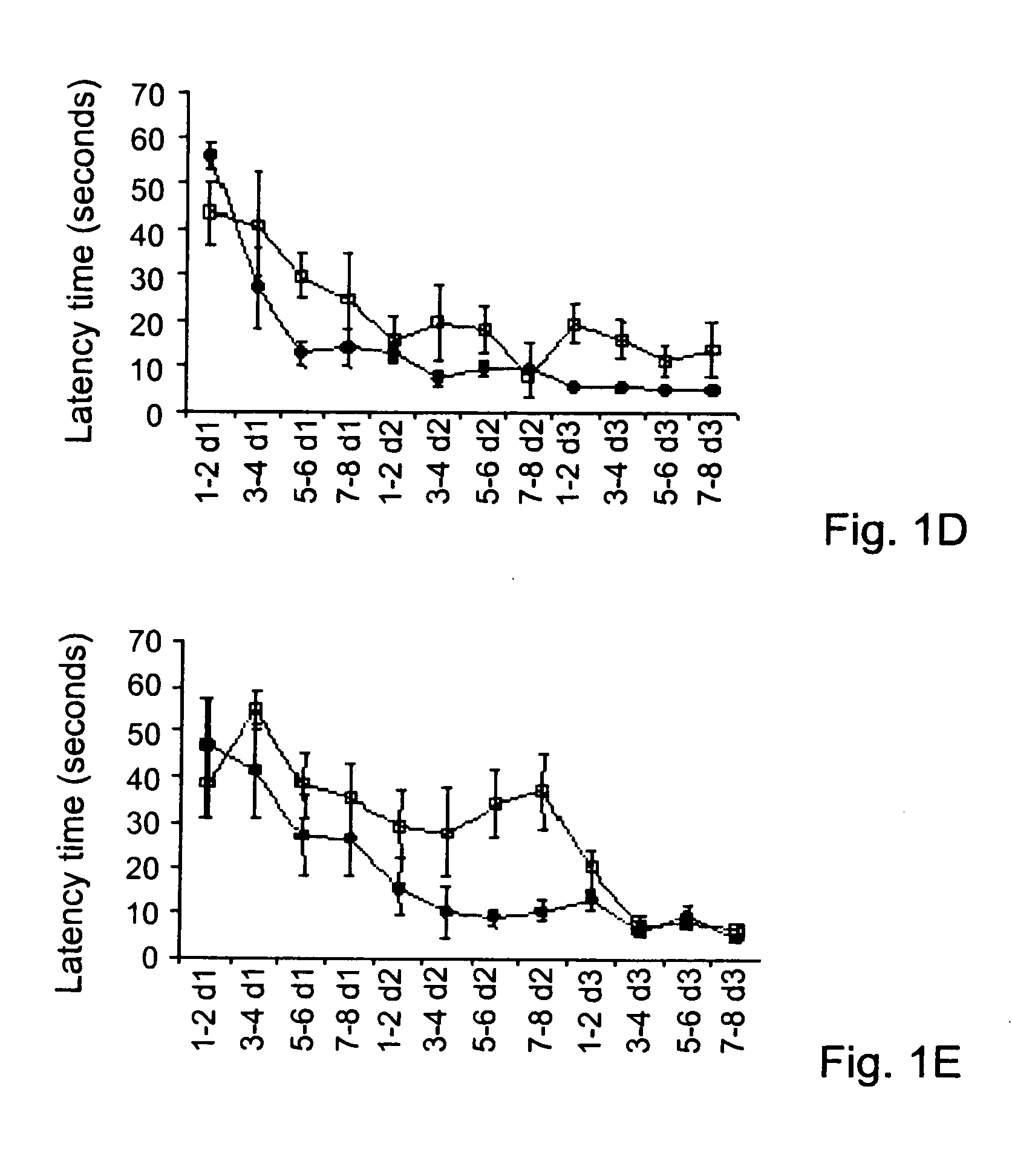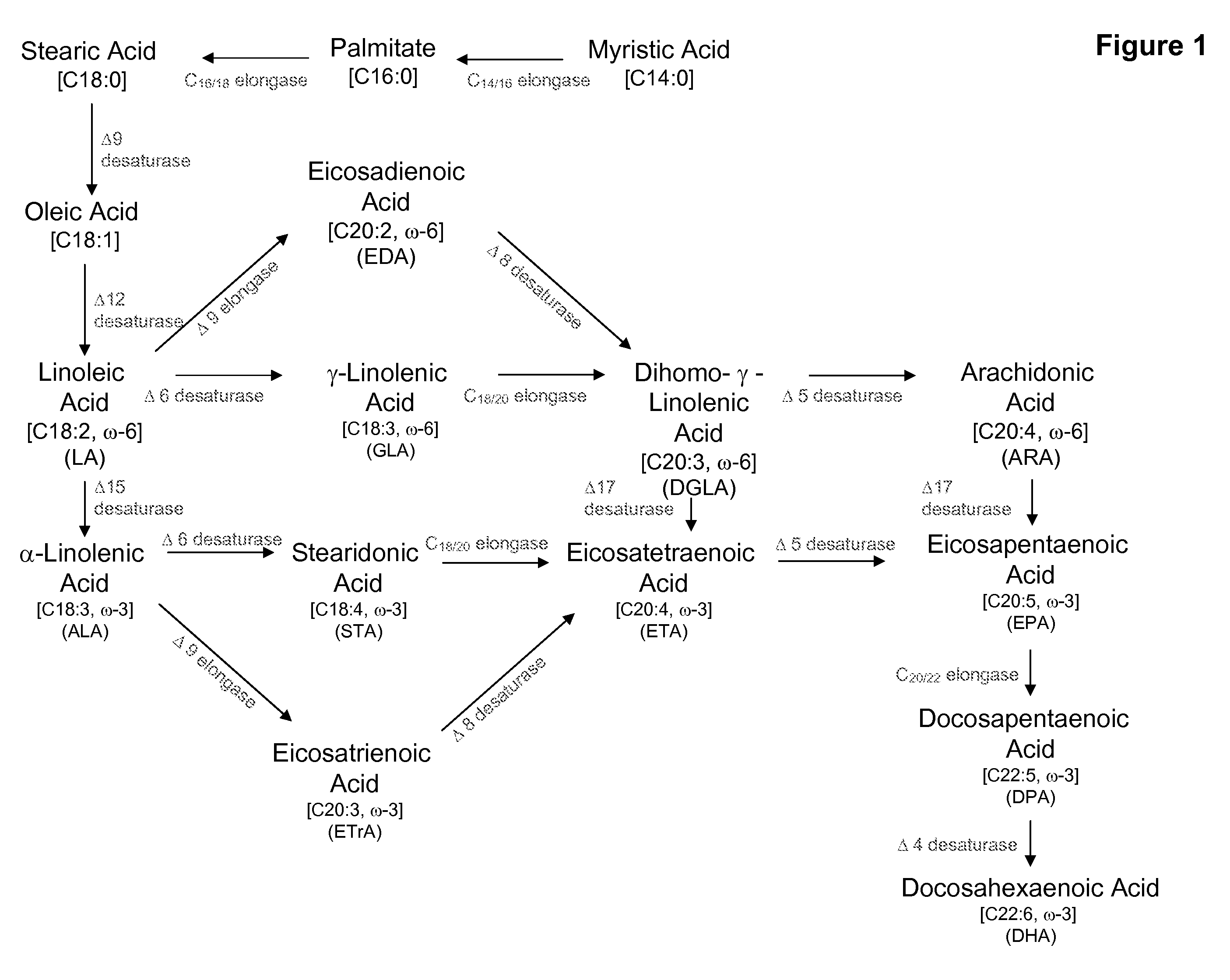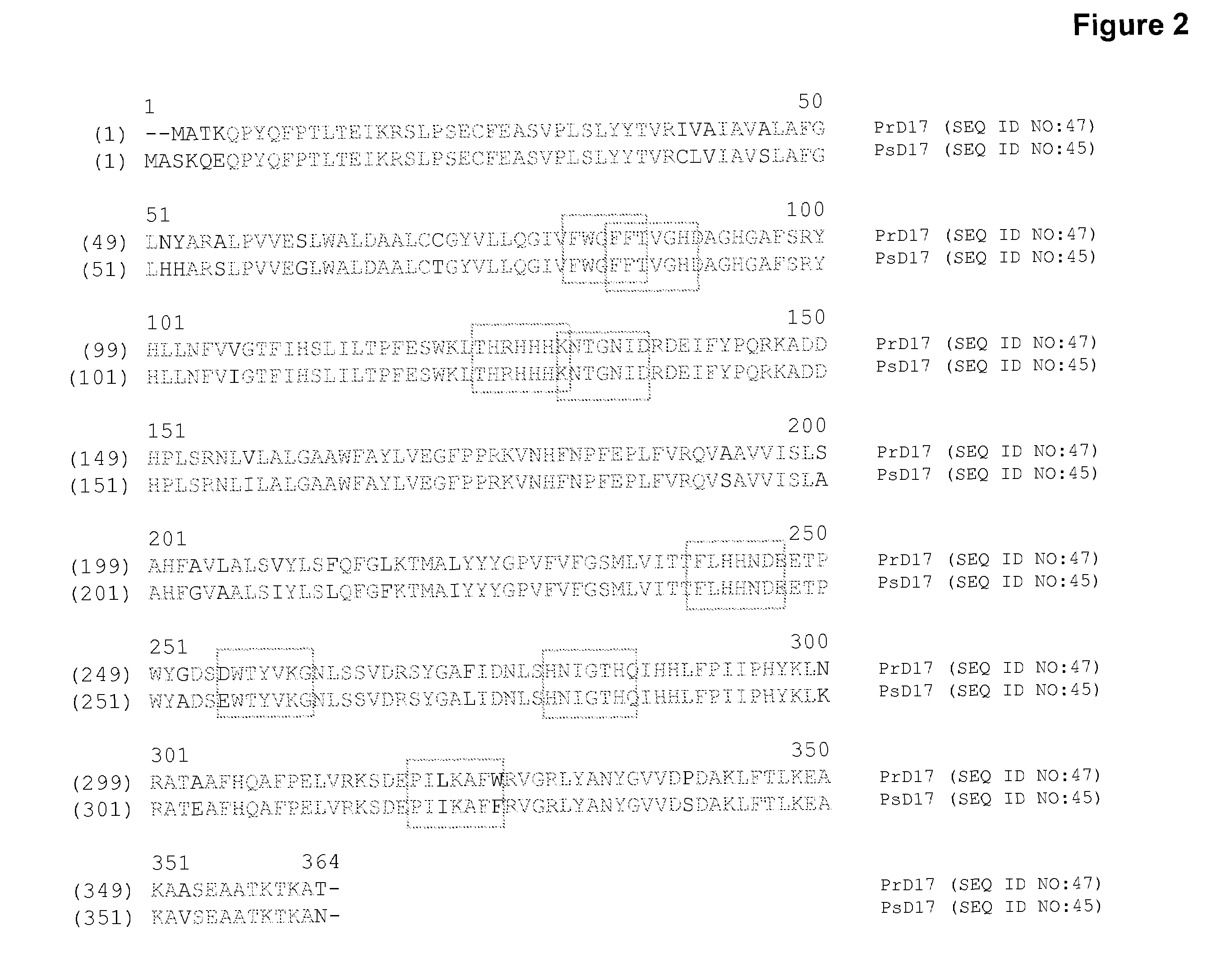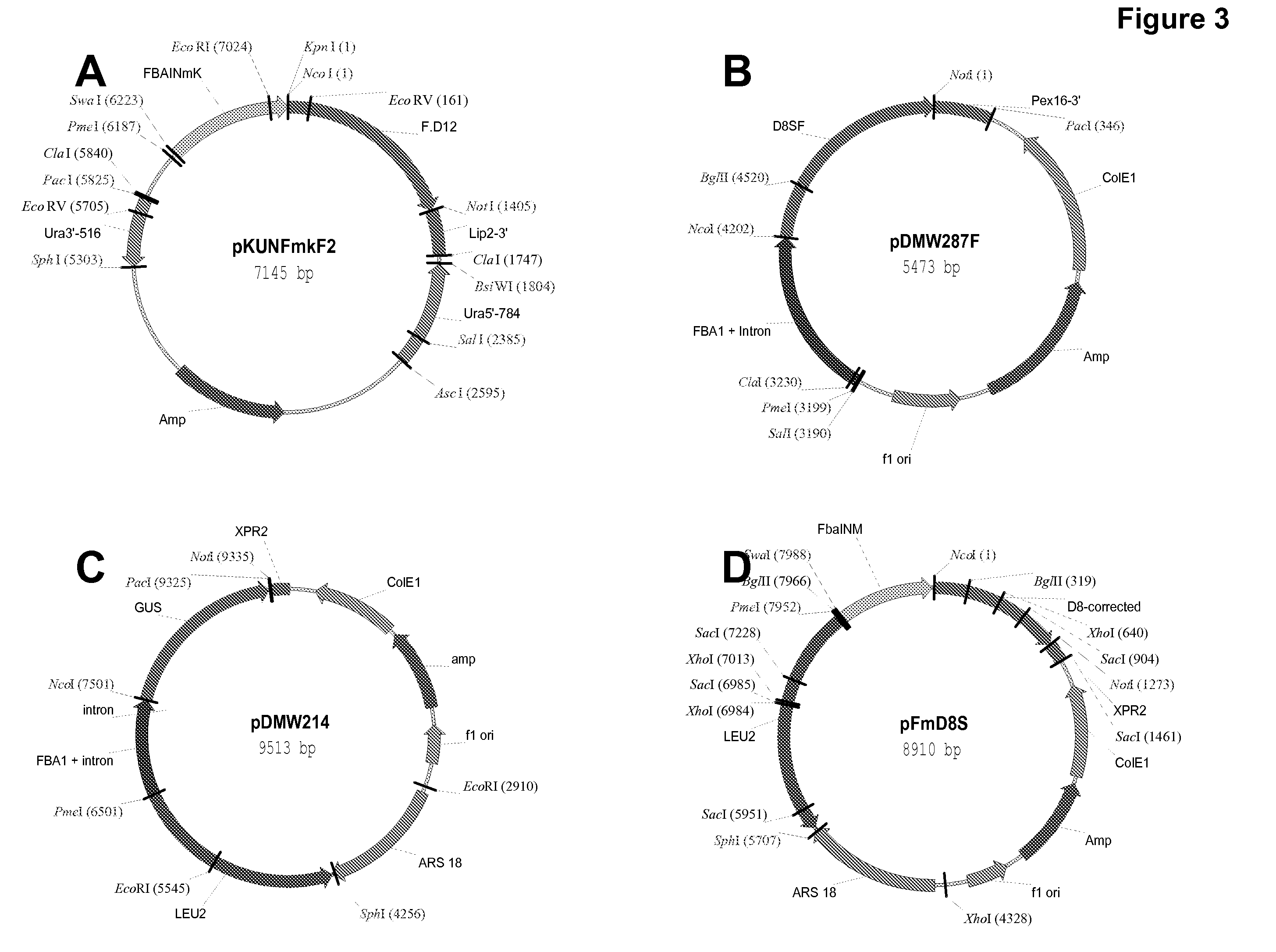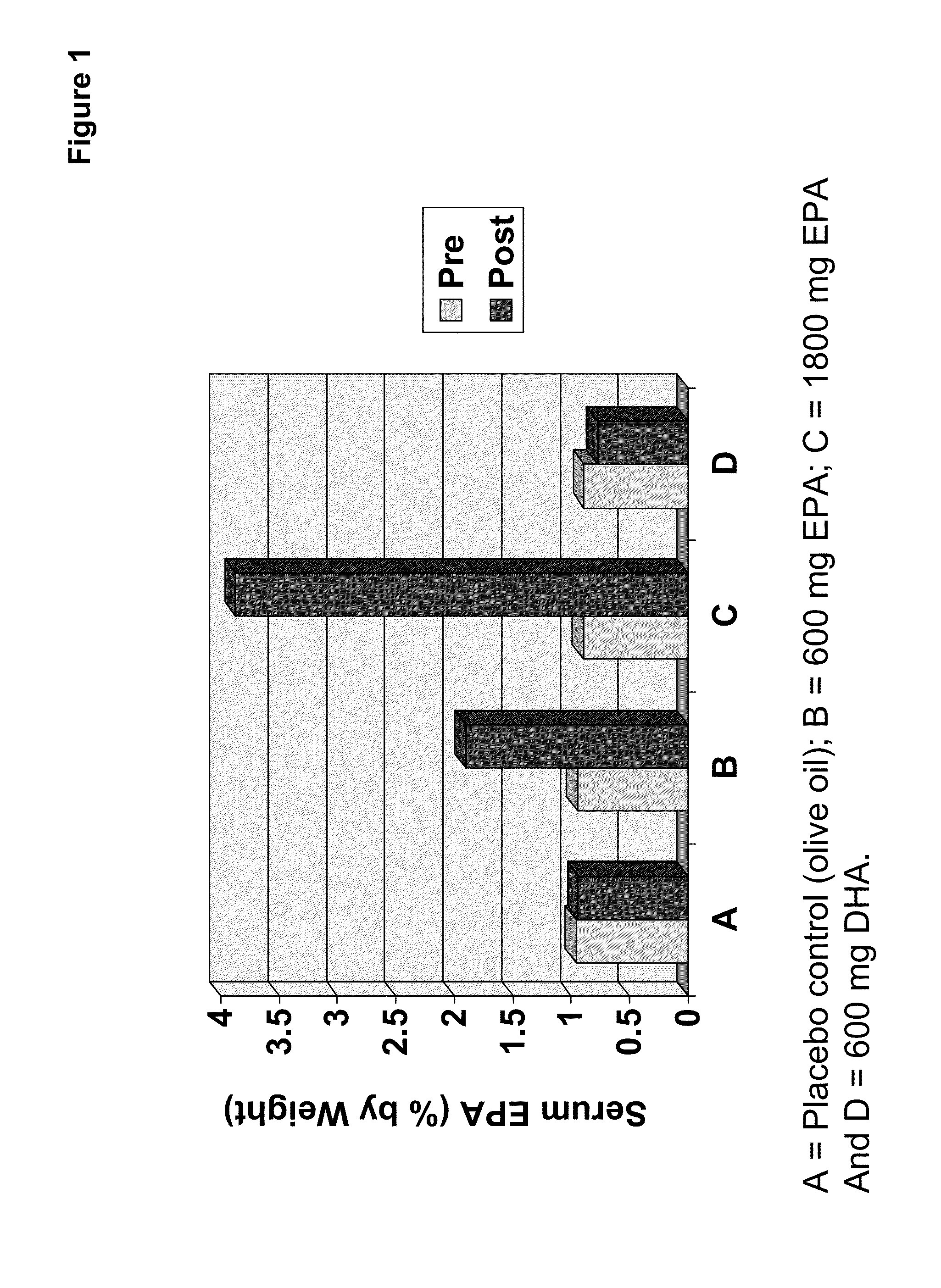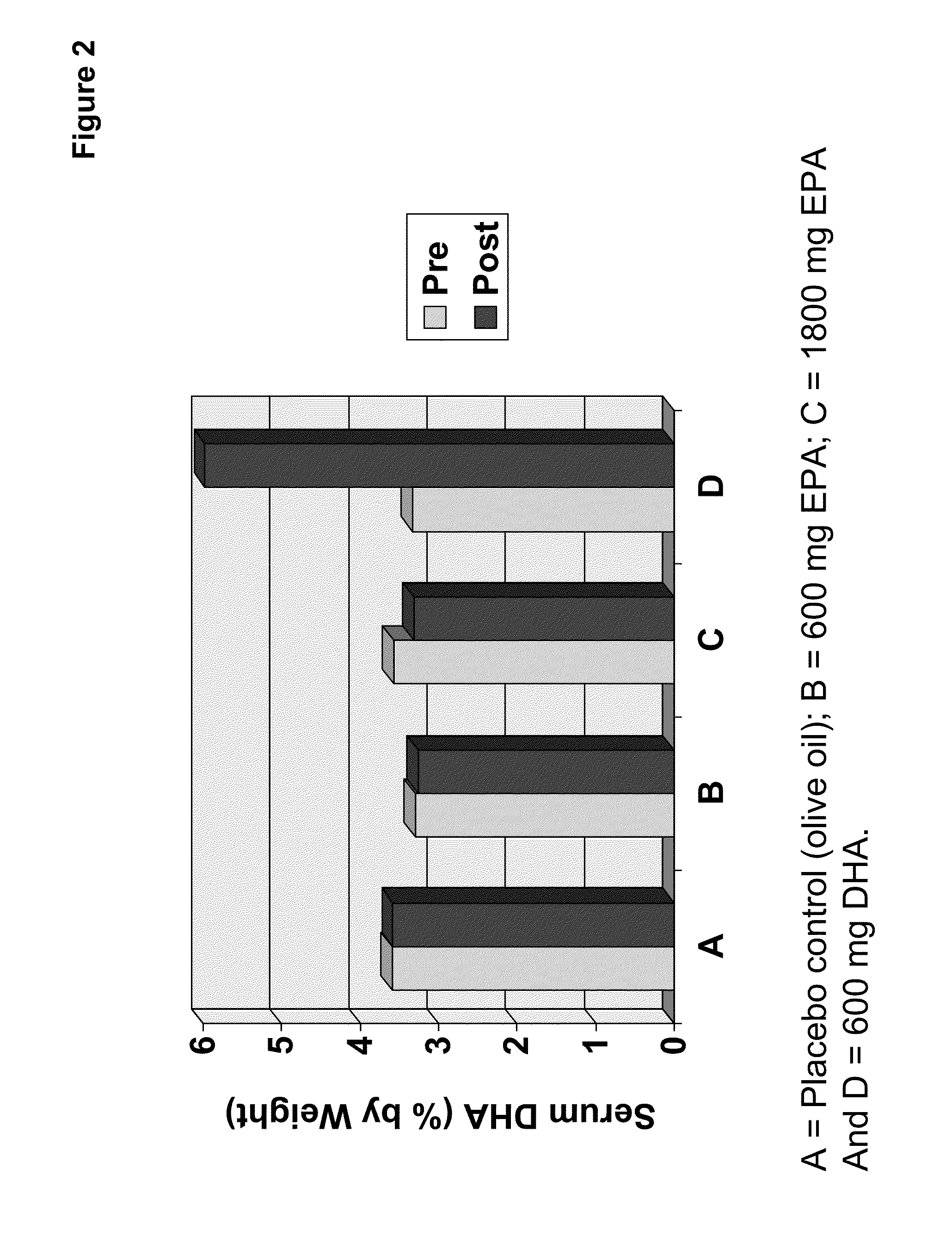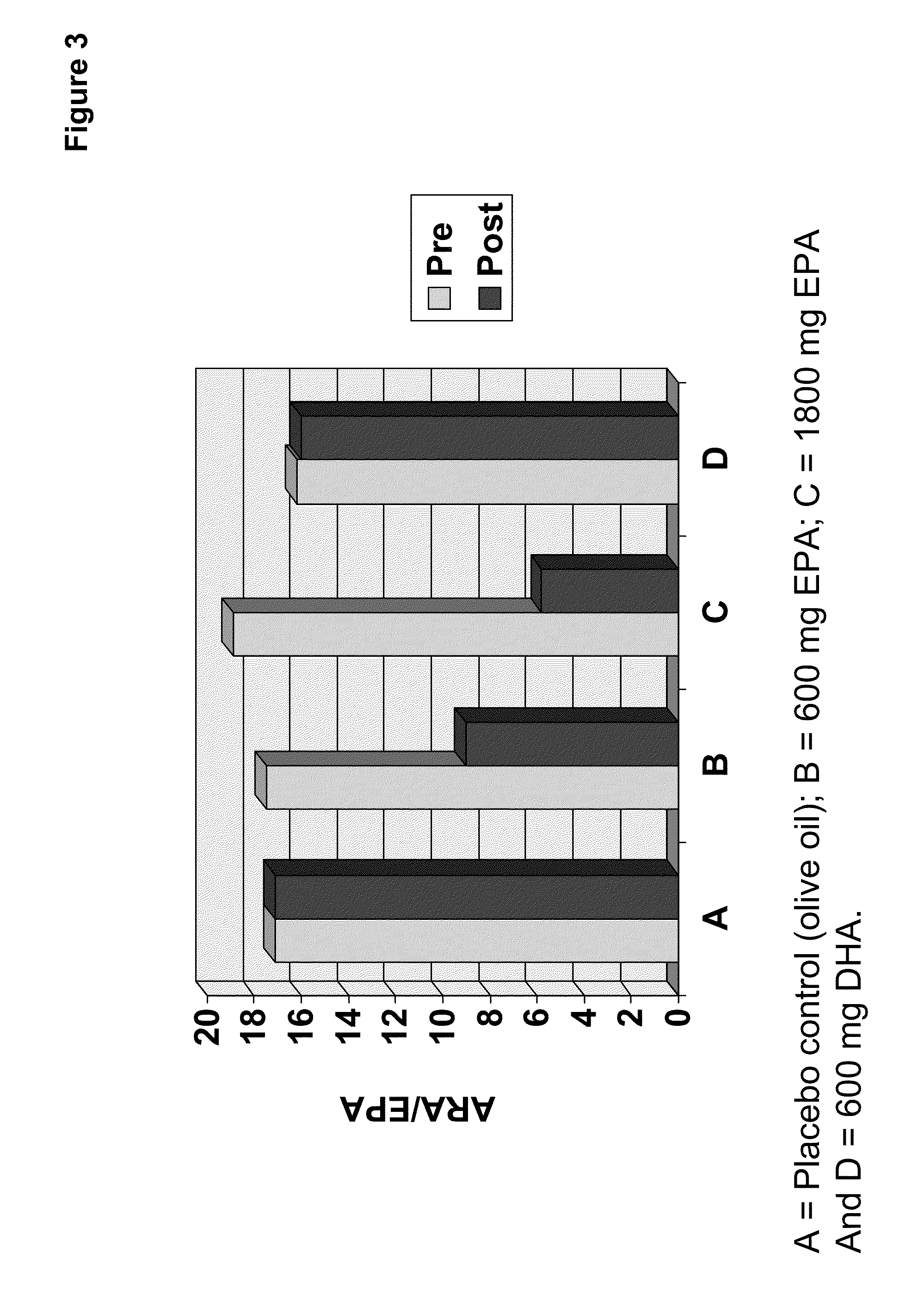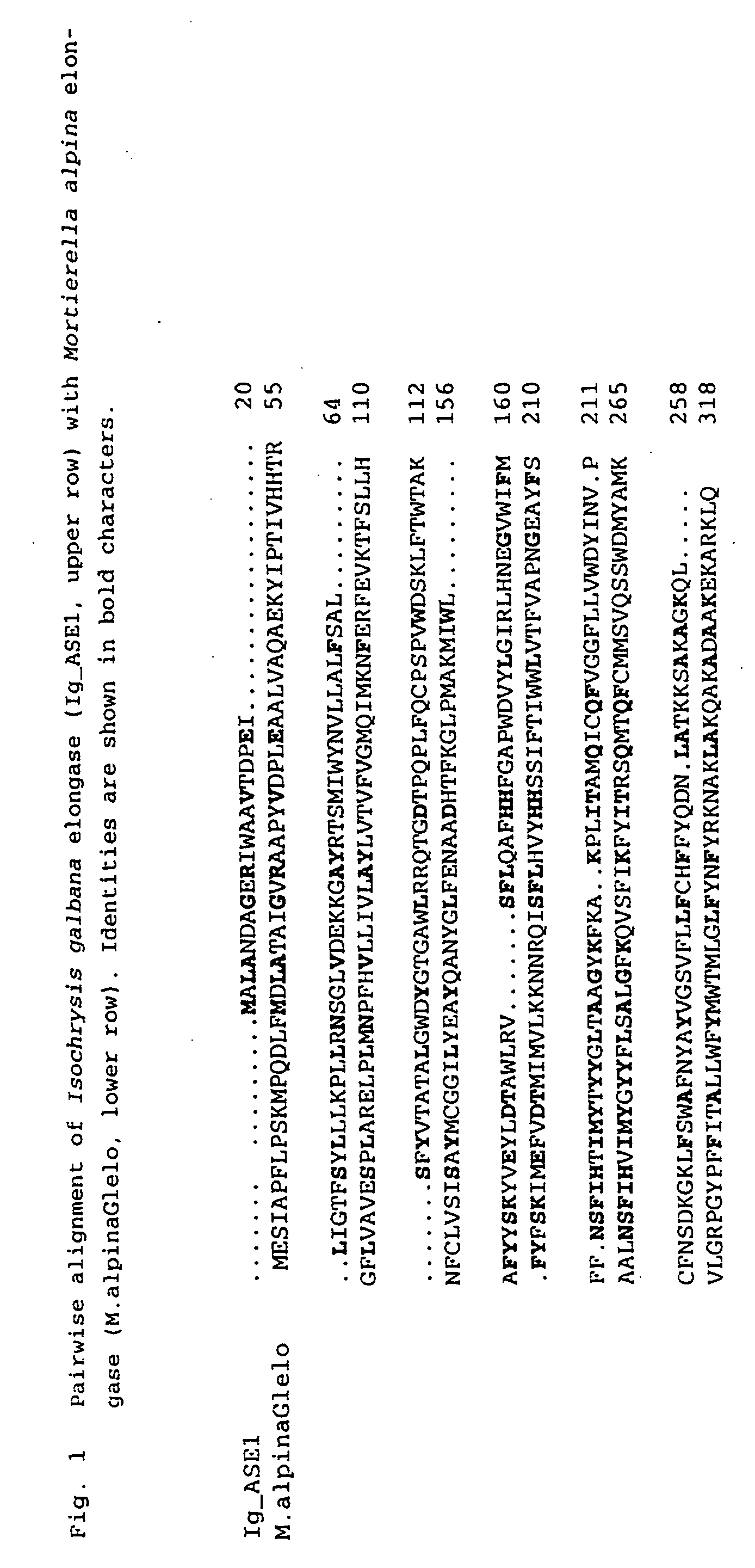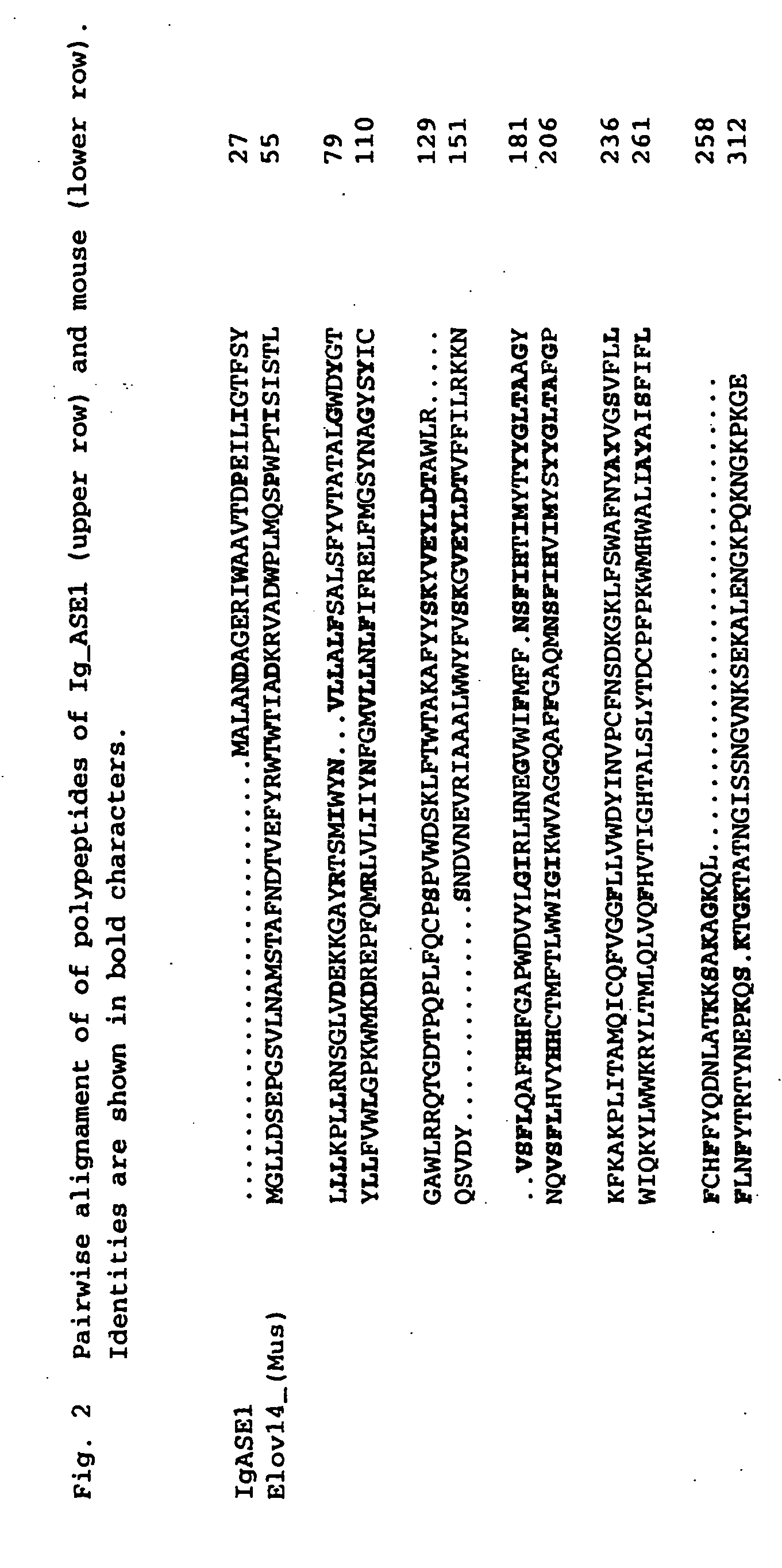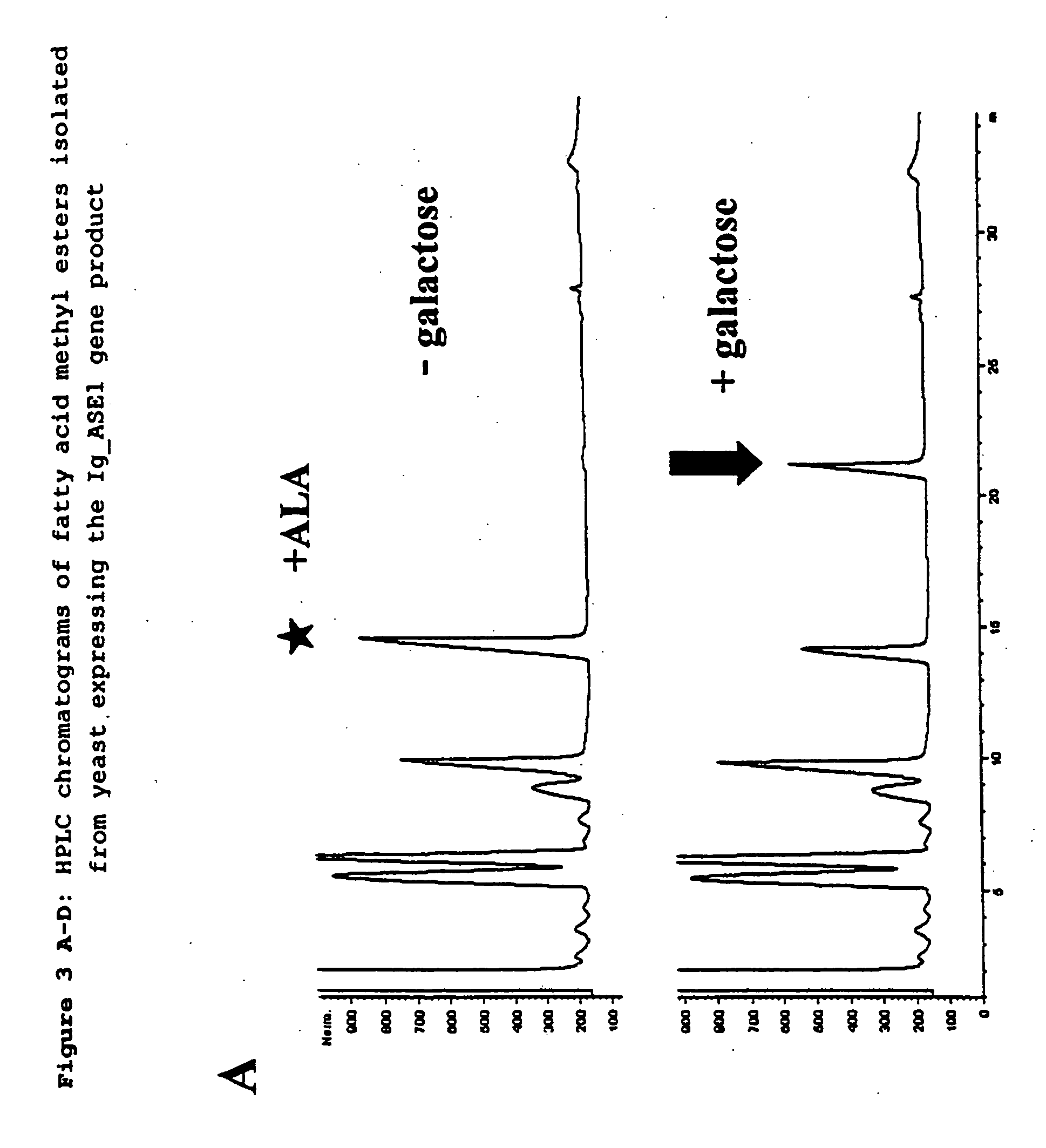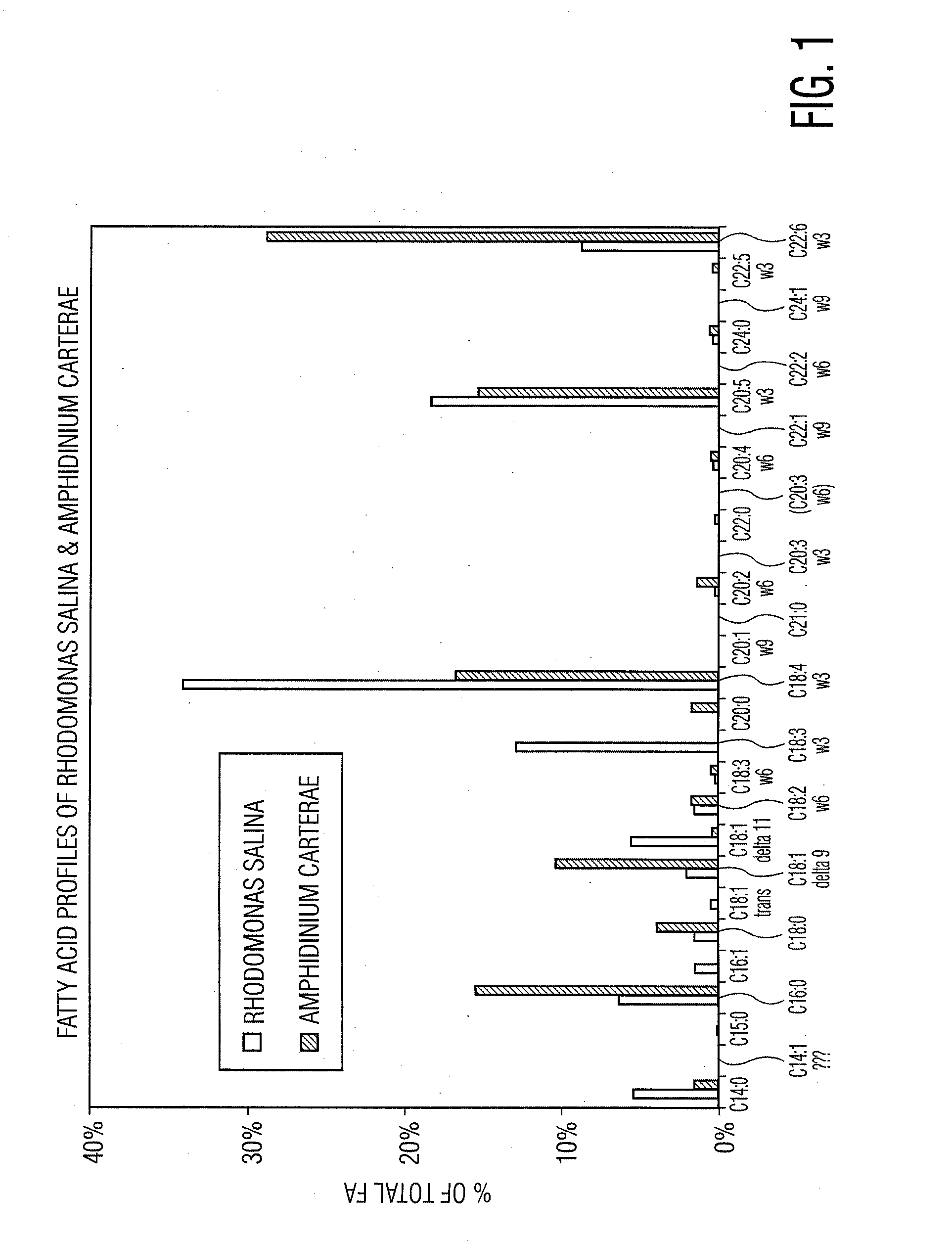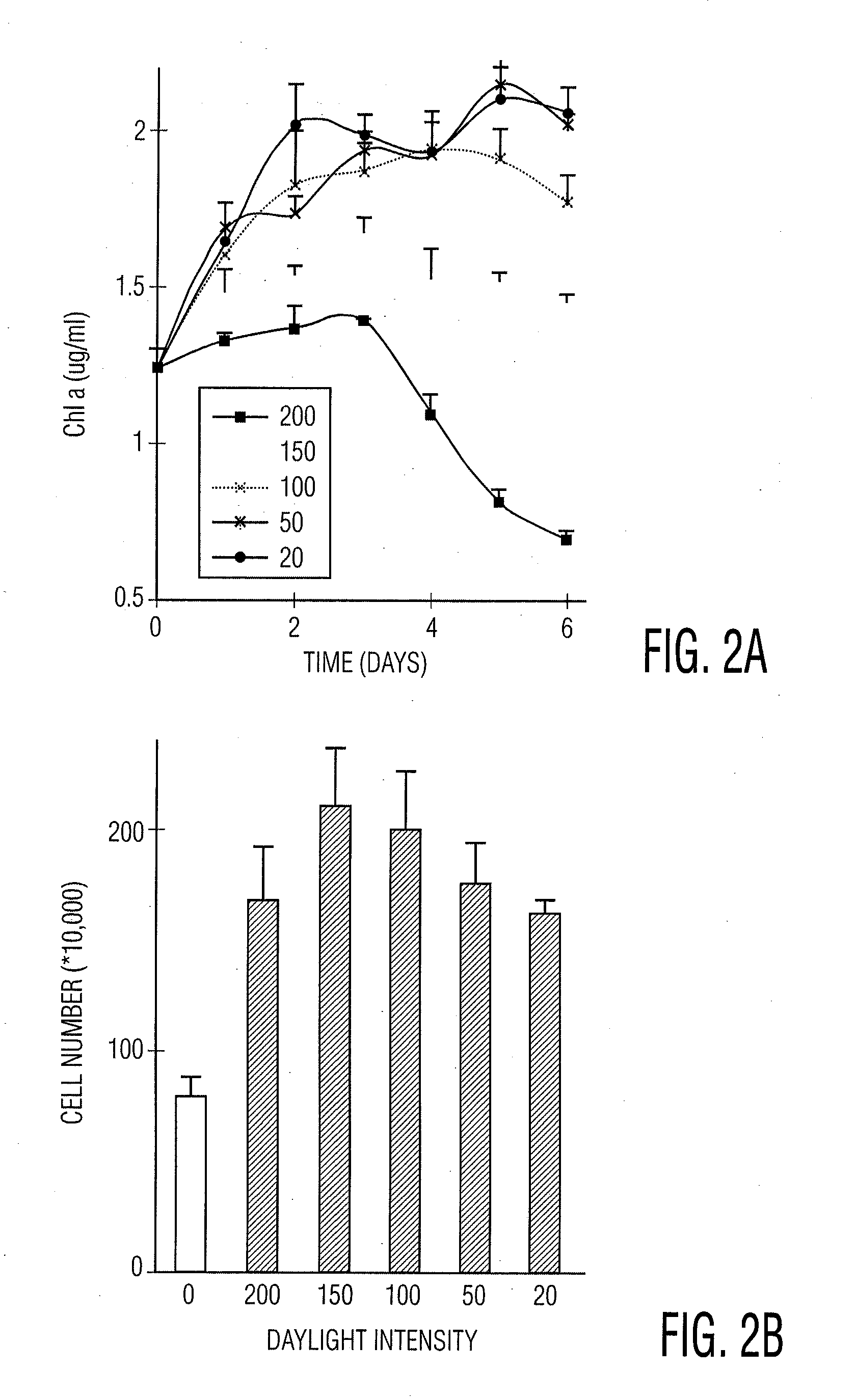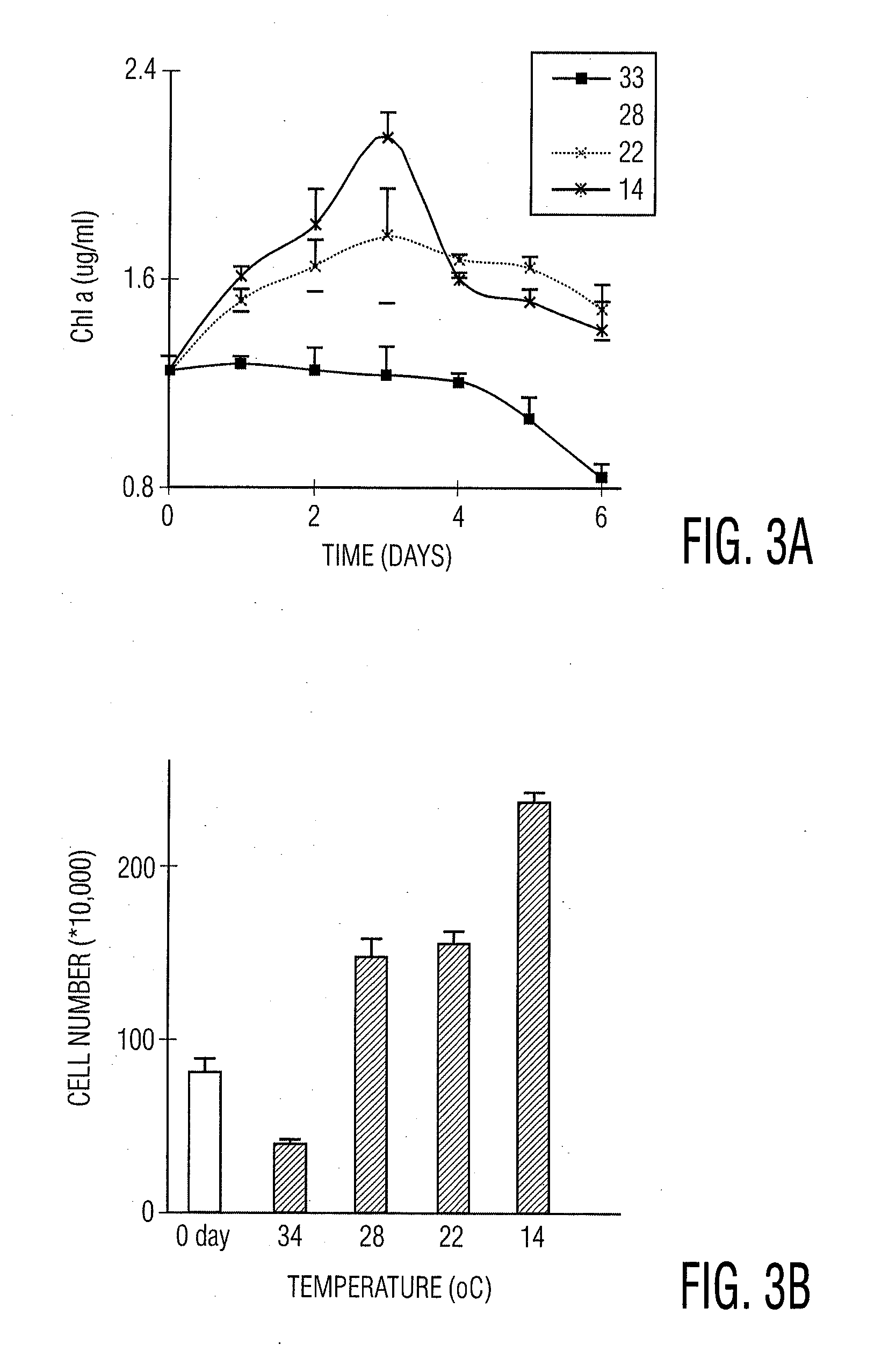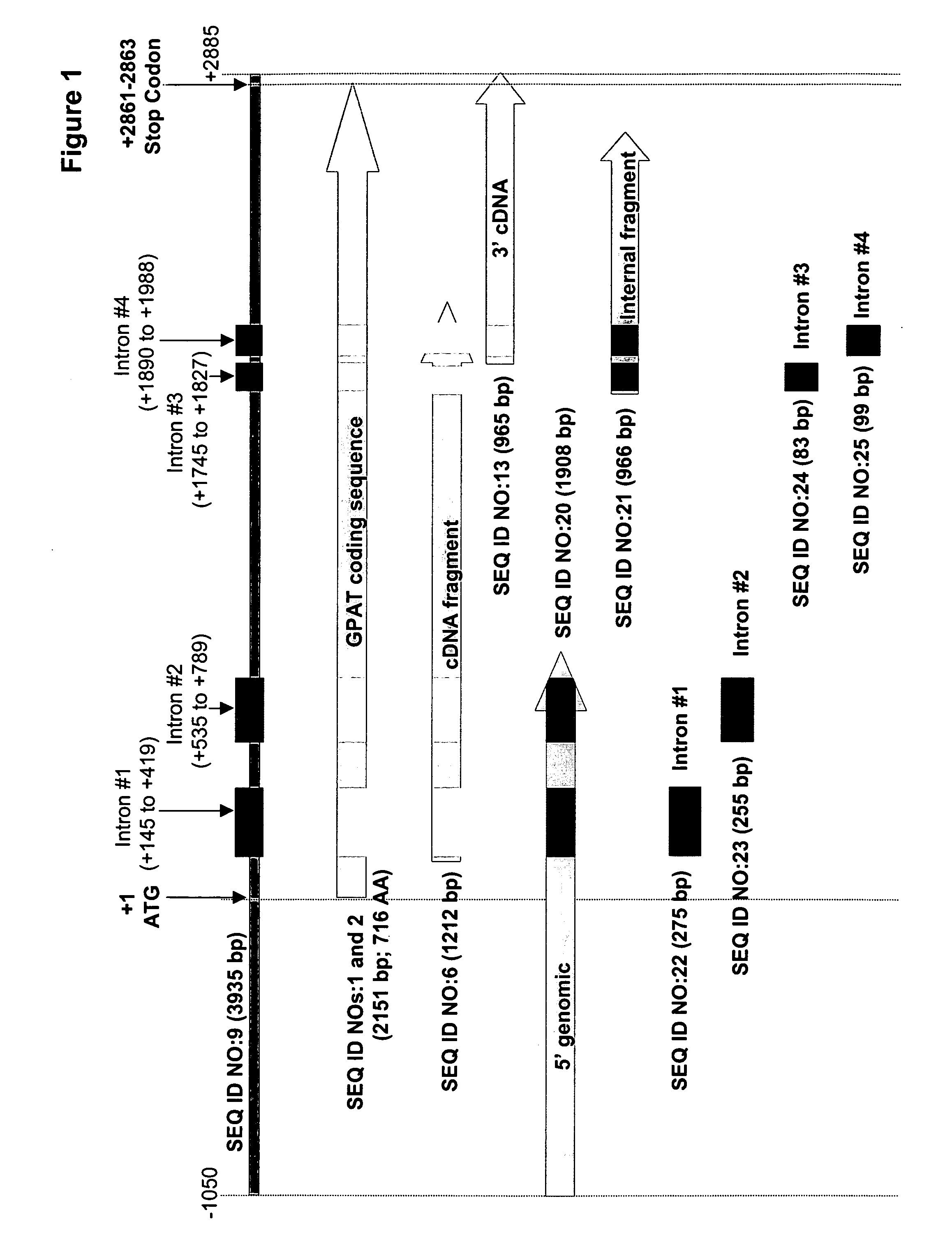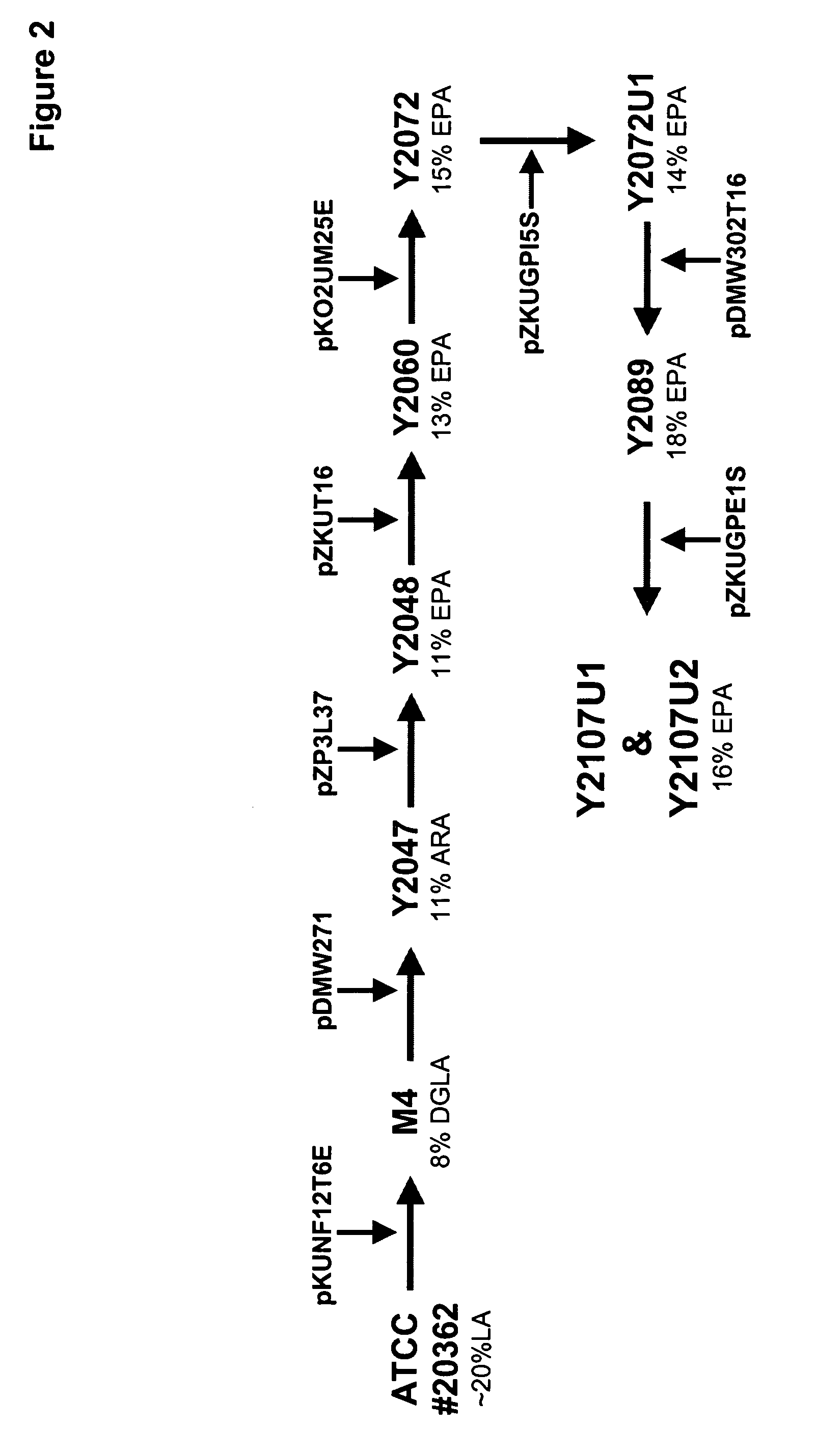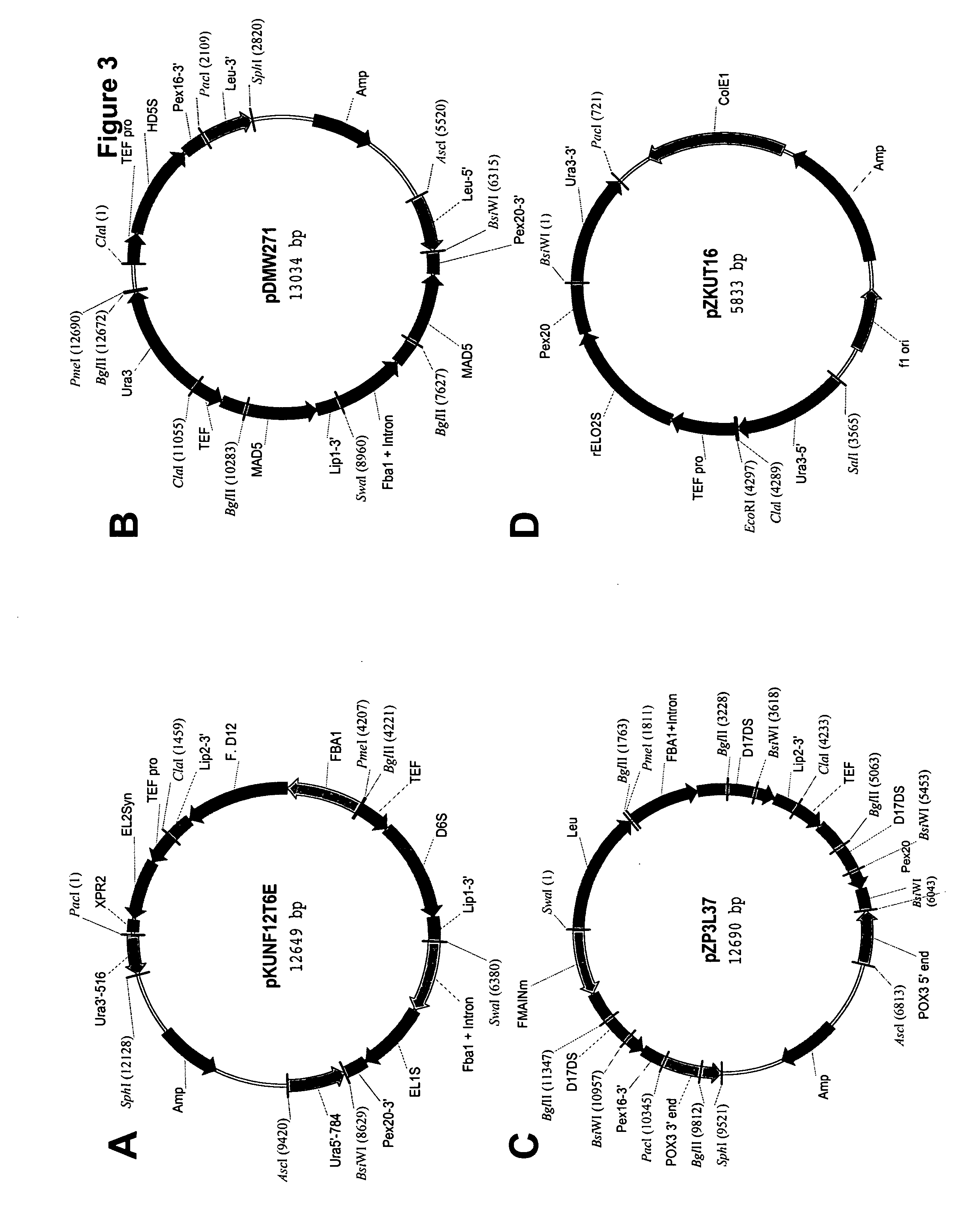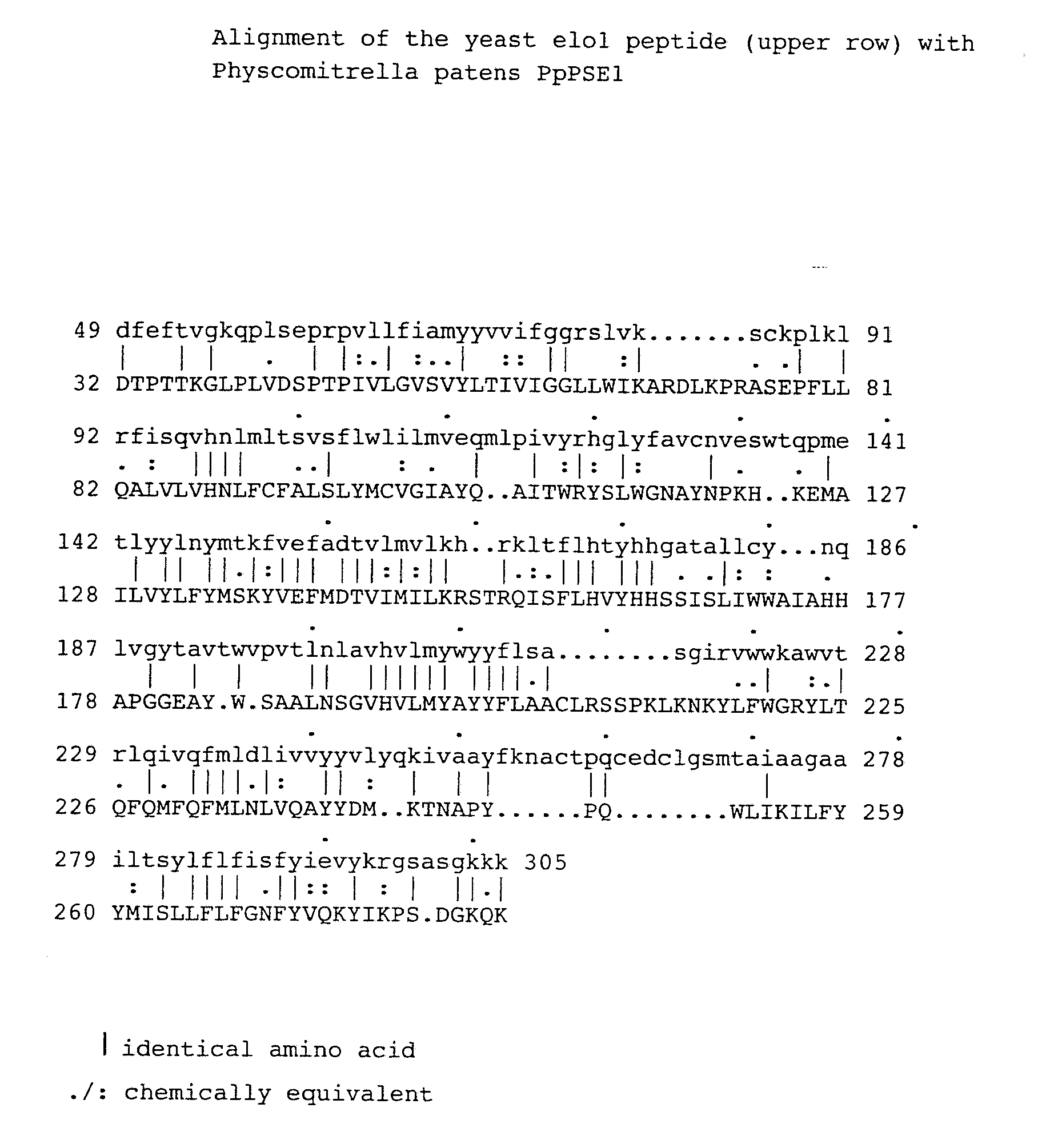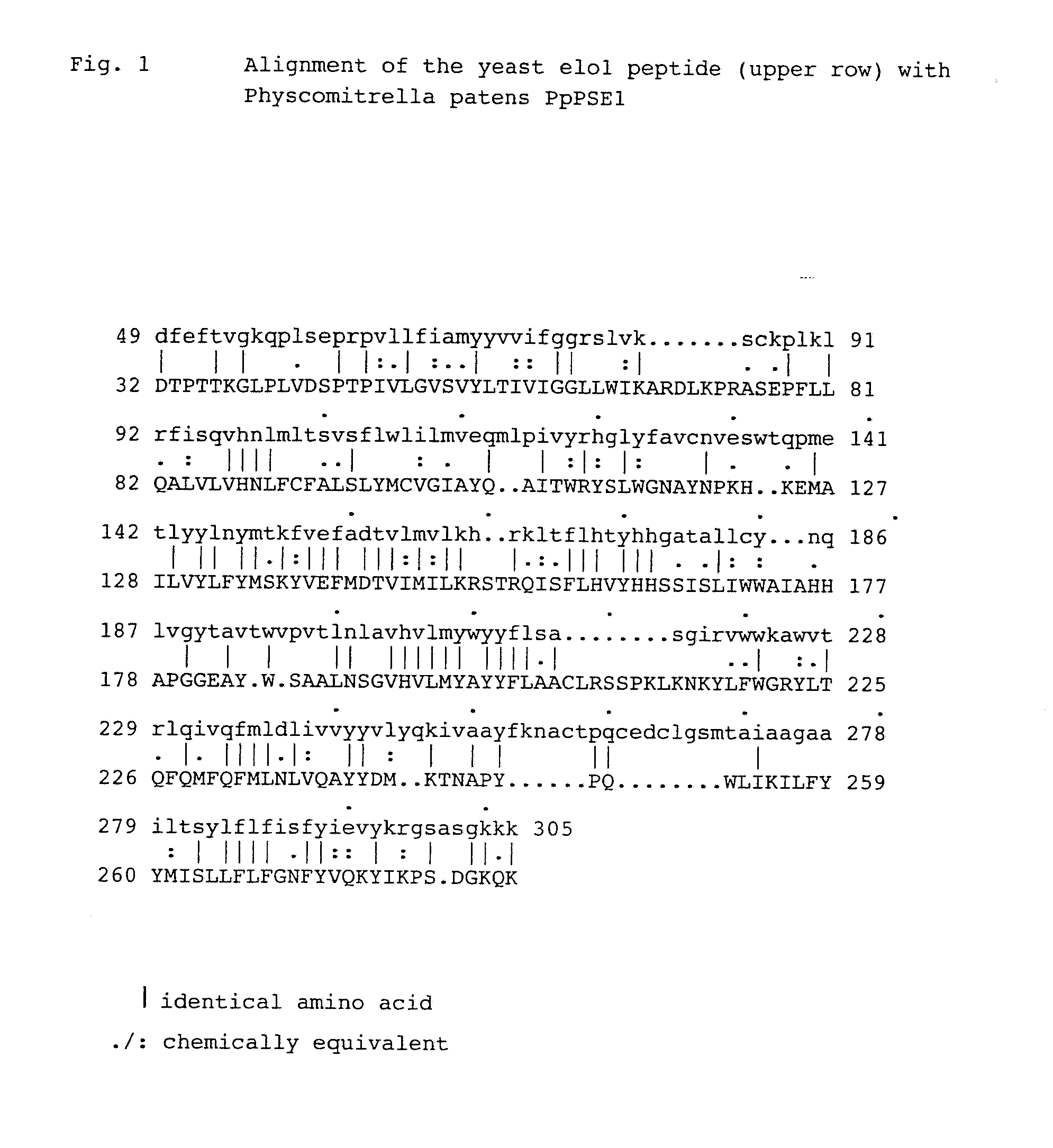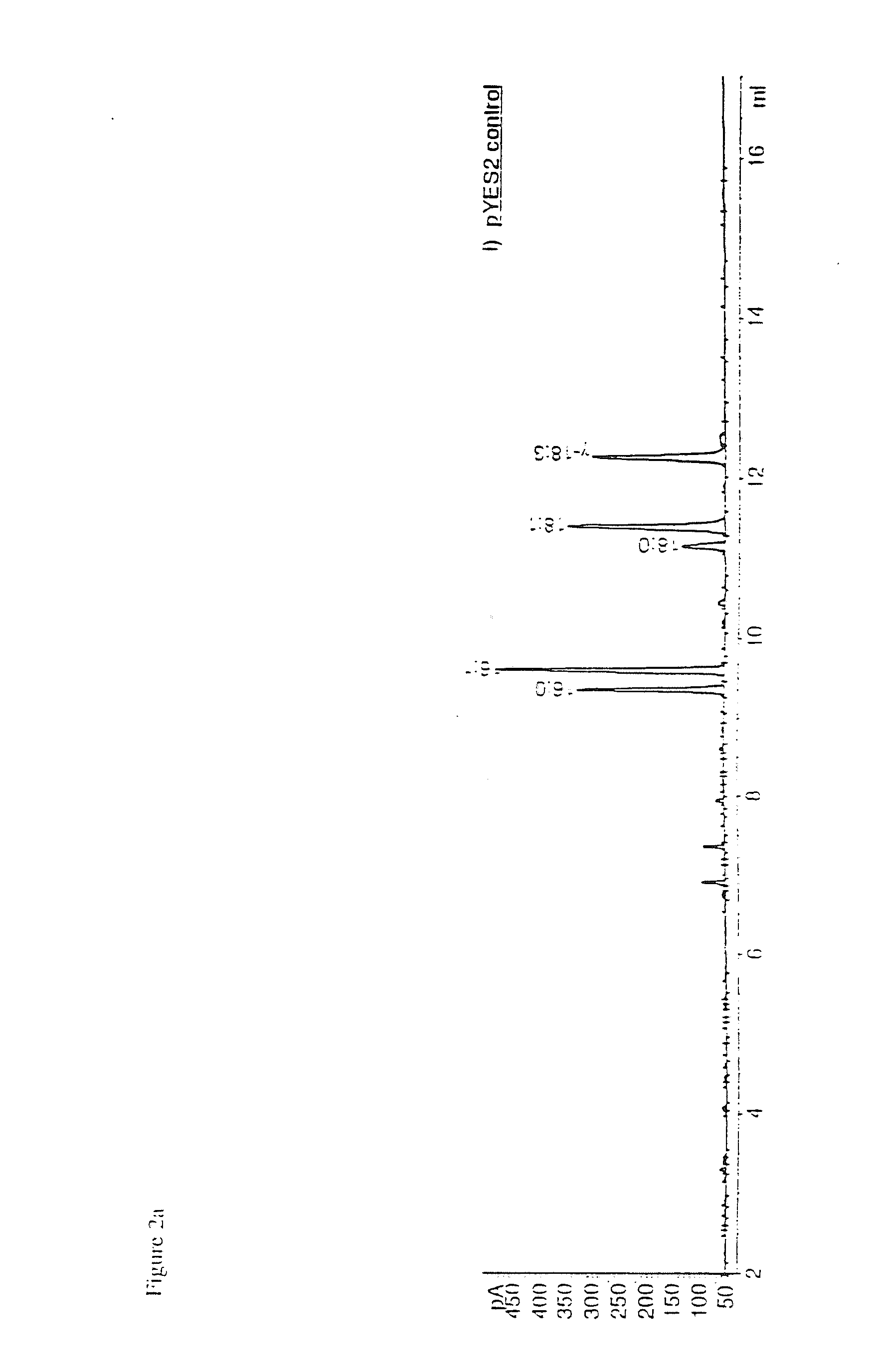Patents
Literature
371 results about "Fatty acids.polyunsaturated" patented technology
Efficacy Topic
Property
Owner
Technical Advancement
Application Domain
Technology Topic
Technology Field Word
Patent Country/Region
Patent Type
Patent Status
Application Year
Inventor
Polyunsaturated fatty acid. Polyunsaturated fatty acids (PUFAs) are fatty acids that contain more than one double bond in their backbone. This class includes many important compounds, such as essential fatty acids and those that give drying oils their characteristic property.
PUFA polyketide synthase systems and uses thereof
The invention generally relates to polyunsaturated fatty acid (PUFA) polyketide synthase (PKS) systems, to homologues thereof, to isolated nucleic acid molecules and recombinant nucleic acid molecules encoding biologically active domains of such a PUFA PKS system, to genetically modified organisms comprising PUFA PKS systems, to methods of making and using such systems for the production of bioactive molecules of interest, and to novel methods for identifying new bacterial and non-bacterial microorganisms having such a PUFA PKS system.
Owner:DSM IP ASSETS BV
Polyunsaturated fatty acid production in heterologous organisms using PUFA polyketide synthase systems
InactiveUS20070245431A1Improve the level ofReduce competitionOther foreign material introduction processesOxidoreductasesBiotechnologyHeterologous
Disclosed are novel acyl-CoA synthetases and novel acyltransferases, nucleic acid molecules encoding the same, recombinant nucleic acid molecules and recombinant host cells comprising such nucleic acid molecules, genetically modified organisms (microorganisms and plants) comprising the same, and methods of making and using the same. Also disclosed are genetically modified organisms (e.g., plants, microorganisms) that have been genetically modified to express a PKS-like system for the production of PUFAs (a PUFA PKS system or PUFA synthase), wherein the organisms have been modified to express an acyl-CoA synthetase, to express an acyl transferase, to delete or inactivate a fatty acid synthase (FAS) expressed by the organism, to reduce competition for malonyl CoA with the PUFA synthase or to increase the level of malonyl CoA in the plant or plant cell, and in one aspect, to inhibit KASII or KASIII. Additional modifications, and methods to make and use such organisms, in addition to PUFAs and oils obtained from such organisms, are disclosed, alone with various products including such PUFAs and oils.
Owner:SEMBIOSYS GENETICS INC +1
Composition containing organic substance having double bond with improved oxidative stability
ActiveUS20060134178A1Improve stabilitySafe antioxidantOrganic active ingredientsCosmetic preparationsSesamum orientaleGeneral purpose
To an organic substance having a double bond such as a polyunsaturated fatty acid was added an antioxidative component containing an antioxidative sesame component and ascorbic acid or an ascorbyl fatty acid ester. The above method provides a composition containing an organic substance having a double bond exhibiting enhanced oxidative stability. Particularly, it extremely improves oxidative stability of fat and oil which contains polyunsaturated fatty acid. General-purpose refined fish oil which is easy to handle can be provided for food, medicine or feed uses.
Owner:NIPPON SUISAN KAISHA LTD
PUFA polyketide synthase systems and uses thereof
InactiveUS7271315B2BryophytesOther foreign material introduction processesLipid formationBiotechnology
Disclosed are the complete polyunsaturated fatty acid (PUFA) polyketide synthase (PKS) systems from Schizochytrium, and biologically active fragments and homologues thereof. More particularly, this invention relates to nucleic acids encoding such PUFA PKS systems, to proteins and domains thereof that comprise such PUFA PKS systems, to genetically modified organisms (plants and microorganisms) comprising such PUFA PKS systems, and to methods of making and using the PUFA PKS systems disclosed herein. This invention also relates to genetically modified plants and microorganisms and methods to efficiently produce lipids enriched in various polyunsaturated fatty acids (PUFAs) as well as other bioactive molecules by manipulation of a PUFA polyketide synthase (PKS) system.
Owner:DSM IP ASSETS BV
Seamless capsules containing high amounts of polyunsaturated fatty acids and a flavouring component
A seamless capsule includes a core and a shell, wherein the core includes at least one polyunsaturated fatty acid, and at least one flavouring component, the process for manufacturing the capsule and products containing the capsule are also disclosed.
Owner:V MANE FILS
Clinical benefits of eicosapentaenoic acid in humans
InactiveUS20110178105A1Maintaining and lowering Lp-PLA levelWithout raising LDL cholesterol levelBiocideMetabolism disorderEicosapentaenoic acidOMEGA-3 POLYUNSATURATED FATTY ACIDS
Methods are provided for maintaining or lowering lipoprotein-associated phospholipase A2 [“Lp-PLA2”] levels, stabilizing rupture prone-atherosclerotic lesions, decreasing the Inflammatory Index and increasing Total Omega-3 Score™ in humans, by administering an effective amount of eicosapentaecnoic acid [“EPA”], an omega-3 polyunsaturated fatty acid [“PUFA”].
Owner:EI DU PONT DE NEMOURS & CO
Mortierella alpina diacylglycerol acyltransferase for alteration of polyunsaturated fatty acids and oil content in oleaginous organisms
An acyltransferase is provided, suitable for use in the manufacture of microbial oils enriched in omega fatty acids in oleaginous organisms. Specifically, the gene encoding diacylglycerol acyltransferase (DGAT2) has been isolated from Mortierella alpina. This gene encodes an enzyme that participates in the terminal step in oil biosynthesis in fungi and yeast and is expected to play a key role in altering the quantity of long-chain polyunsaturated fatty acids produced in oils of oleaginous organisms. Most desirably, the substrate specificity of the instant DGAT2 will be particularly useful to enable accumulation of long-chain PUFAs having chain lengths equal to or greater than C20 in oleaginous yeast, such as Yarrowia lipolytica.
Owner:DUPONT US HLDG LLC
Novel elongase gene and method for producing multiple-unsaturated fatty acids
InactiveUS20040111763A1Improve efficiencyIncrease productionCosmetic preparationsOrganic active ingredientsElongaseTriacylglycerol VLDL
The invention relates to a novel elongase gene with the sequences stated in sequence SEQ ID NO:1, SEQ ID NO: 3, SEQ ID NO: 5 and SEQ ID NO: 7 or their homologs, derivatives or analogs, to a gene construct comprising this gene or its homologs, derivatives and analogs, and to its use. The invention also relates to vectors or transgenic organisms comprising an elongase gene with the sequence SEQ ID NO:1, SEQ ID NO: 3, SEQ ID NO: 5 and SEQ ID NO: 7 or its homologs, derivatives and analogs. The invention furthermore relates to the use of the elongase gene sequences alone or in combination with further elongases and / or further fatty acid biosynthesis genes. The present invention relates to a novel elongase gene with the sequence SEQ ID NO:1 or its homologs, derivatives and analogs. Furthermore, the invention relates to a process for the preparation of polyunsaturated fatty acids and to a process for introducing DNA into organisms which produce large amounts of oils and, in particular, oils with a high content of unsaturated fatty acids. Moreover, the invention relates to an oil and / or a fatty acid preparation with a higher content of polyunsaturated fatty acids with at least two double bonds and / or a triacylglycerol preparation with a higher content of polyunsaturated fatty acids with at least two double bonds.
Owner:BASF AG
Coated polyunsaturated fatty acid-containing particles and coated liquid pharmaceutical-containing particles
InactiveUS20060068019A1Powder deliveryLiquid surface applicatorsFatty acids.polyunsaturatedFatty acid
A process for coating a polyunsaturated fatty acid (PUFA)-containing carrier particle or a PUFA matrix particle, or a liquid pharmaceutical-containing carrier particle or a liquid pharmaceutical matrix particle. Also disclosed are such particles made by the process of the invention and foods, pharmaceuticals, beverages, nutritional supplements, infant formula, pet food and animal feed with incorporate such particles.
Owner:SOLAE LLC
Stable polyunsaturated fatty acid emulsions and methods for inhibiting, suppressing, or reducing degradation of polyunsaturated fatty acids in an emulsion
InactiveUS20080058418A1Inhibiting and suppressing and reducingBiocideHydroxy compound active ingredientsEmulsionAntioxidant
An emulsion comprising a continuous liquid phase, an emulsifier, and a discontinuous liquid phase comprising a blend including a polyunsaturated fatty acid source and a dispersing agent. The polyunsaturated fatty acid source comprises at least one polyunsaturated fatty acid and the weight ratio of the fatty acid source to the dispersing agent in the blend ranges from about between 9:1 and 1:10. A method for making an emulsion. The stability of the emulsion can be protected by antioxidants such as tea polyphenols.
Owner:THE COCA-COLA CO
Metabolically engineered cells for the production of polyunsaturated fatty acids
The present invention relates to the construction and engineering of cells, more particularly microorganisms for producing PUFAs with four or more double bonds from non-fatty acid substrates through heterologous expression of an oxygen requiring pathway. The invention especially involves improvement of the PUFA content in the host organism through fermentation optimization, e.g. decreasing the temperature and / or designing an optimal medium, or through improving the flux towards fatty acids by metabolic engineering, e.g. through over-expression of fatty acid synthases, over-expression of other enzymes involved in biosynthesis of the precursors for PUFAs, or codon optimization of the heterologous genes, or expression of heterologous enzymes involved in the biosynthesis of the precursor for PUFAs.
Owner:FLUXOME SCI AS
Pufa polyketide synthase systems and uses thereof
Disclosed are the complete polyunsaturated fatty acid (PUFA) polyketide synthase (PKS) systems from Schizochytrium, and biologically active fragments and homologues thereof. More particularly, this invention relates to nucleic acids encoding such PUFA PKS systems, to proteins and domains thereof that comprise such PUFA PKS systems, to genetically modified organisms (plants and microorganisms) comprising such PUFA PKS systems, and to methods of making and using the PUFA PKS systems disclosed herein. This invention also relates to genetically modified plants and microorganisms and methods to efficiently produce lipids enriched in various polyunsaturated fatty acids (PUFAs) as well as other bioactive molecules by manipulation of a PUFA polyketide synthase (PKS) system.
Owner:DSM IP ASSETS BV
Fatty acid desaturases from fungi
ActiveUS20060156435A1High nutritional valueIncrease SDA contentSugar derivativesOther foreign material introduction processesBiotechnologyFungal microorganisms
The invention relates generally to methods and compositions concerning fungal desaturase enzymes that modulate the number and location of double bonds in long chain poly-unsaturated fatty acids (LC-PUFA's). In Particular, the invention relates to methods and compositions for improving omega-3 fatty acid profiles in plant products and parts using desaturase enzymes and nucleic acids encoding for such enzymes. In particular embodiments, the desaturase enzymes are fungal −15 desaturases. Also provided are improved canola oil compositions having SDA and maintaining beneficial oleic acid content.
Owner:ADEKA CORP +1
High PUFA oil compositions
ActiveUS20060110521A1Organic chemistryFatty substance preservation using additivesHigh concentrationFatty acids.polyunsaturated
The present invention is directed to oil compositions having a high concentration of poly-unsaturated fatty acids. In addition, the oils of the present invention have advantageous stability characteristics and minimal trans-fatty acids.
Owner:MONSANTO TECH LLC
Method for introducing a gene into Labyrinthulomycota
An object of the present invention is to provide a transformation system for Labyrinthulomycota that allows the elucidation of biosynthetic mechanisms of lipids such as PUFA and carotenoids as well as for the construction of a high production system and the design and development of novel functional lipid molecules by the control of the mechanisms. The present invention provides a method for introducing a transgene into a cell of Labyrinthulomycota, which comprises introducing into a cell of Labyrinthulomycota a recombinant vector comprising a transgene and a nucleotide sequence which is homologous to a part of chromosomal DNA of Labyrinthulomycota and is capable of homologous recombination with the chromosomal DNA, and then inducing homologous recombination in this homologous nucleotide sequence.
Owner:HIROSHIMA UNIVERSITY +1
Mutant Δ8 desaturase genes engineered by targeted mutagenesis and their use in making polyunsaturated fatty acids
Owner:DUPONT US HLDG LLC
Mortierella alpina glycerol-3-phosphate o-acyltransferase for alteration of polyunsaturated fatty acids and oil content in oleaginous organisms
Owner:EI DU PONT DE NEMOURS & CO
Genes involved in polyketide synthase pathways and uses thereof
The subject invention relates to isolated nucleic acid sequences or genes involved in polyketide synthase (PKS) biosynthetic pathways. In particular, such pathways are involved in the production of polyunsaturated fatty acids (PUFAs) such as, for example, Eicosapentaenoic acid (EPA) and Docosahexaenoic acid (DHA). Specifically, the invention relates to isolating nucleic acid sequences encoding proteins involved in eukaryotic PUFA-PKS systems and to uses of these genes and encoded proteins in PUFA-PKS systems, in heterologous hosts, for the production of PUFAs such as EPA and DHA.
Owner:ABBOTT LAB INC
Vector capable for transformation of labyrinthulomycota
An object of the present invention is to provide a transformation system for Labyrinthulomycota that allows the elucidation of biosynthetic mechanisms of lipids such as PUFA and carotenoids as well as for the construction of a high production system and the design and development of novel functional lipid molecules by the control of the mechanisms. The present invention provides a vector for the transformation of Labyrinthulomycota with a transgene, which comprises at least (1) a nucleotide sequence which is homologous to a part of chromosomal DNA of Labyrinthulomycota and is capable of homologous recombination with the chromosomal DNA, (2) a selection marker gene having a promoter sequence located upstream and a terminator sequence located downstream, and (3) a cloning site for transgene insertion having a promoter sequence located upstream and a terminator sequence located downstream.
Owner:FUJIFILM CORP +1
Fatty Acid Desaturases From Primula
ActiveUS20080063691A1High nutritional valueIncrease SDA contentBacteriaOxidoreductasesDouble bondOmega-6 fatty acid
The invention relates generally to methods and compositions concerning desaturase enzymes that modulate the number and location of double bonds in long chain poly-unsaturated fatty acids (LC-PUFA's). In particular, the invention relates to methods and compositions for improving omega-3 fatty acid profiles in plant products and parts using desaturase enzymes and nucleic acids encoding for such enzymes. In particular embodiments, the desaturase enzymes are Primula Δ6-desaturases. Also provided are improved soybean oil compositions having SDA and a beneficial overall content of omega-3 fatty acids relative to omega-6 fatty acids.
Owner:MONSANTO TECH LLC
Delta-8 desaturase and its use in making polyunsaturated fatty acids
Isolated nucleic acid fragments and recombinant constructs comprising such fragments encoding a delta-8 desaturase along with a method of making long chain polyunsaturated fatty acids (PUFAs) using this delta-8 desaturase in plants and oleaginous yeast.
Owner:CORTEVA AGRISCIENCE LLC
Delta-8 desaturase and its use in making polyunsaturated fatty acids
Isolated nucleic acid fragments and recombinant constructs comprising such fragments encoding a delta-8 desaturase along with a method of making long chain polyunsaturated fatty acids (PUFAs) using this delta-8 desaturase in plants and oleaginous yeast.
Owner:EI DU PONT DE NEMOURS & CO
Glycerophospholipids for the improvement of cognitive functions
ActiveUS20090074857A1Improve cognitive functionEnhanced and cheapBiocideNervous disorderDiseaseErogorgiaene
Disclosed herein are alternative, enhanced, and cheaper methods of improving cognitive functions in a subject using a lipid composition conjugated with omega-3 and omega-6 fatty acids, with specific amounts and specific conjugation patterns of LA, linolenic acid (alpha-linolenic acid, gamma-linolenic acid) DHA and eicosapentaenoyl (EPA), e.g. utilizing different sources of lipids.Disclosed herein is a lipid preparation, said preparation comprising a phosphatidylserine moiety, and poly-unsaturated fatty acid (PUFA) acyl groups, particularly long-chain poly-unsaturated fatty acid (LC-PUFA) acyl groups such as omega-3 and / or omega-6 acyl groups, wherein said PUFA is covalently bound to said glycerophospholipid. Said lipid preparations are particularly useful in the treatment of mental and cognitive disorders, e.g. ADHD (attention deficit hyperactivity disorder) and Alzheimer's disease.The disclosed preparations present improved bioactivity, and are useful in the treatment of various cognitive and mental conditions and disorders, as well as for maintenance of normal functions of brain-related systems and processes.
Owner:ENZYMOTEC
Delta17 desaturase and its use in making polyunsaturated fatty acids
The present invention relates to Δ17 desaturases, which have the ability to convert ω-6 fatty acids into their ω-3 counterparts (i.e., conversion of arachidonic acid [20:4, ARA] to eicosapentaenoic acid [20:5, EPA]). Isolated nucleic acid fragments and recombinant constructs comprising such fragments encoding Δ17 desaturases along with a method of making long-chain polyunsaturated fatty acids (PUFAs) using these Δ17 desaturases in oleaginous yeast are disclosed.
Owner:DUPONT US HLDG LLC
Clinical benefits of eicosapentaenoic acid in humans
Methods are provided for maintaining or lowering lipoprotein-associated phospholipase A2 [“Lp-PLA2”] levels, stabilizing rupture prone-atherosclerotic lesions, decreasing the Inflammatory Index and increasing Total Omega-3 Score™ in humans, by administering an effective amount of eicosapentaenoic acid [“EPA”], an omega-3 polyunsaturated fatty acid [“PUFA”].
Owner:EI DU PONT DE NEMOURS & CO
New plant derived seed extract rich in essentially fatty acids derived from salvia hispanica l. seed: composition of matter, manufacturing process and use
A Salvia hispanica L. derived seed oil extract composition of matter containing from 60-88% PUFAs in a ratio of from 3.1:1-3.3:1 of ALA to LA, 4-100% of C-18 mono-unsaturated fatty acid, 1-5% of C-18 saturated fatty acid and 4-8% of C-16 saturated fatty acid in a mixed triglyceride form stable at room temperature of 12-24 months containing a mixture of selected antioxidants.
Owner:US NUTRACEUTICALS LLC
Elongase gene and production of delta9-polyunsaturated fatty acids
This invention relates to a new elongase gene having the sequence SEQ ID NO: 1 or its derivatives, to a gene construct comprising this sequence or its derivatives and to its use. The inventive nucleic acid sequence encodes a polypeptide which elongates α-linolenic acid (C18:3 d9, 12, 15) by at least two carbon atoms whereas γ-linolenic acid (C18:3 d6, 9, 12) is not elongated. The invention additionally relates to vectors or organisms comprising an elongase gene having the sequence SEQ ID NO: 1 or its derivatives. The invention further relates to a process for the production of polyunsaturated fatty acids (=PUFAs) with an organism which comprises the elongase gene and which organism produces high amounts of oils and especially oils with a high content of unsaturated fatty acids. Additionally the invention relates to an oil and / or fatty acid composition with a higher content of polyunsaturated C20 or C22 fatty acids with at least two double bonds and / or to a triacylglycerol composition with a higher content of said polyunsaturated fatty acids.
Owner:UNIV OF BRISTOL
Compositions and Methods for Prevention and Treatment of Mammalian Diseases
InactiveUS20100010088A1Increase in dietary intakePromote wellBiocideAnimal repellantsUnsaturated fatty acidChemistry
The present invention discloses processes of making a polyunsaturated fatty acid compositions, and compositions thereof. Thus, one method of making a polyunsaturated fatty acid compositions comprises at least 8% polyunsaturated fatty acids, the process comprising extracting the fatty acids from a microalgae, wherein the fatty acids can be (a) GLA in an amount of 1% to 10% of total fatty acids; (b) SDA in an amount of 5% to 50% of total fatty acids; (c) EPA in an amount of 2% to 30% of total fatty acids, and (d) DHA in an amount of 2% to 30% of total fatty acids, wherein a polyunsaturated fatty acid composition is produced comprising at least 8% polyunsaturated fatty acids. Additional processes of making polyunsaturated fatty acid compositions, animal feed additives, and animal products are disclosed and the compositions, feed additives and products thereof.
Owner:WAKE FOREST UNIVERSITY
Mortierella alpina glycerol-3-phosphate o-acyltransferase for alteration of polyunsaturated fatty acids and oil content in oleaginous organisms
Glycerol-3-phosphate o-acyltransferase (GPAT) participates in the first step of oil biosynthesis and is expected to play a key role in altering the quantity of long-chain polyunsaturated fatty acids (PUFAs) produced in oils of oleaginous organisms. The present application provides a nucleic acid fragment isolated from Mortierella alpina encoding a GPAT that is suitable for use in the manufacture of oils enriched in omega fatty acids in oleaginous organisms. Most desirably, the substrate specificity of the instant GPAT will be particularly useful to enable accumulation of long-chain PUFAs having chain lengths equal to or greater than C20 in oleaginous yeast, such as Yarrowia lipolytica.
Owner:EI DU PONT DE NEMOURS & CO
Novel elongase gene, and process for the preparation of polyunsaturated fatty acids
InactiveUS20080160054A1Improve efficiencyIncrease productionOrganic active ingredientsFatty acid chemical modificationBiotechnologyFatty acid biosynthesis
The invention relates to a novel elongase gene with the sequences stated in sequence SEQ ID NO:1, SEQ ID NO: 3, SEQ ID NO: 5 and SEQ ID NO: 7 or their homologs, derivatives or analogs, to a gene construct comprising this gene or its homologs, derivatives and analogs, and to its use. The invention also relates to vectors or transgenic organisms comprising an elongase gene with the sequence SEQ ID NO:1, SEQ ID NO: 3, SEQ ID NO: 5 and SEQ ID NO: 7 or its homologs, derivatives and analogs. The invention furthermore relates to the use of the elongase gene sequences alone or in combination with further elongases and / or further fatty acid biosynthesis genes. The present invention relates to a novel elongase gene with the sequence SEQ ID NO:1 or its homologs, derivatives and analogs.Furthermore, the invention relates to a process for the preparation of polyunsaturated fatty acids and to a process for introducing DNA into organisms which produce large amounts of oils and, in particular, oils with a high content of unsaturated fatty acids. Moreover, the invention relates to an oil and / or a fatty acid preparation with a higher content of polyunsaturated fatty acids with at least two double bonds and / or a triacylglycerol preparation with a higher content of polyunsaturated fatty acids with at least two double bonds.
Owner:BASF AG
Features
- R&D
- Intellectual Property
- Life Sciences
- Materials
- Tech Scout
Why Patsnap Eureka
- Unparalleled Data Quality
- Higher Quality Content
- 60% Fewer Hallucinations
Social media
Patsnap Eureka Blog
Learn More Browse by: Latest US Patents, China's latest patents, Technical Efficacy Thesaurus, Application Domain, Technology Topic, Popular Technical Reports.
© 2025 PatSnap. All rights reserved.Legal|Privacy policy|Modern Slavery Act Transparency Statement|Sitemap|About US| Contact US: help@patsnap.com
